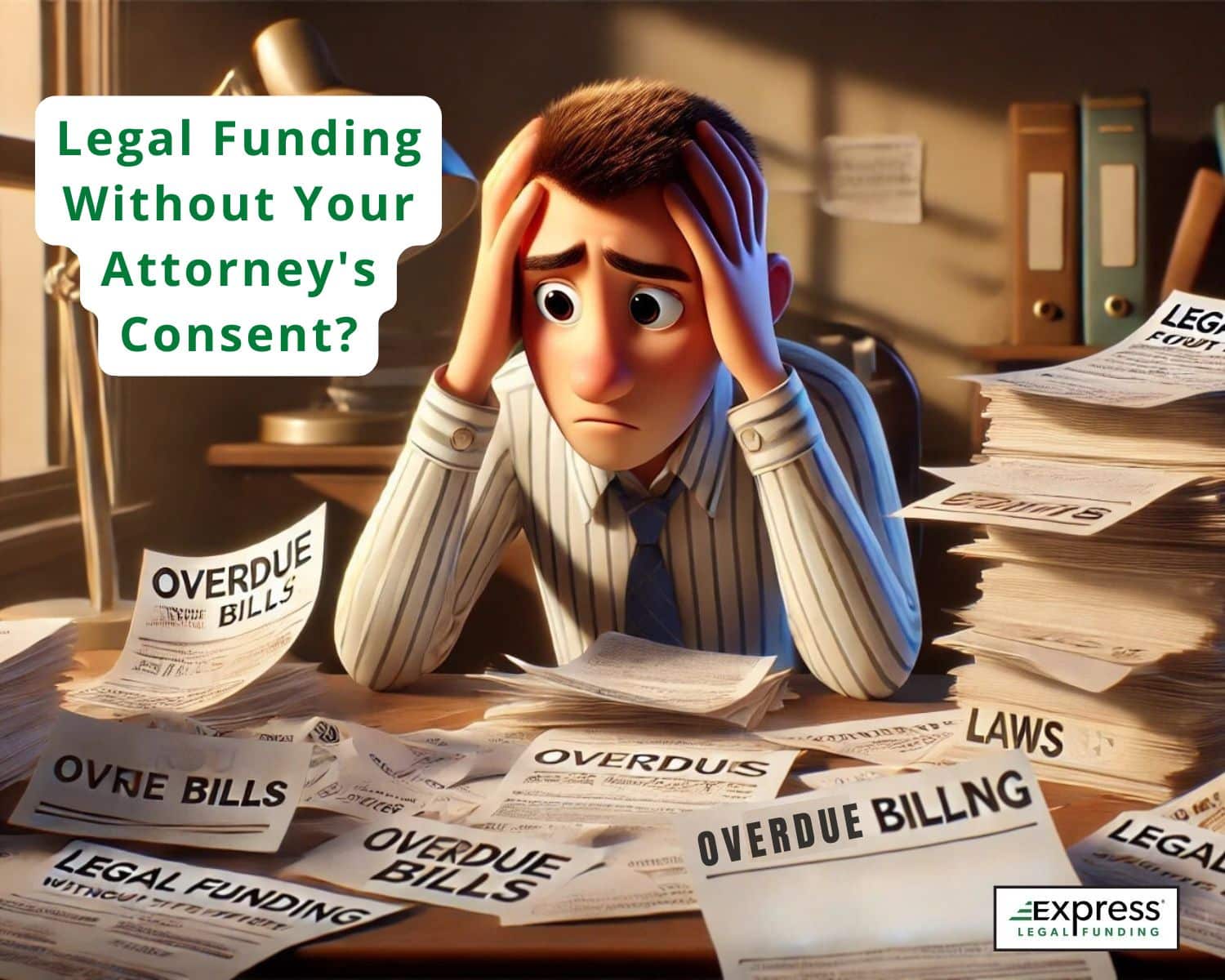Frequently Asked Questions (FAQs) Directory
Find answers to the most common questions about legal funding, lawsuits, and repayment.
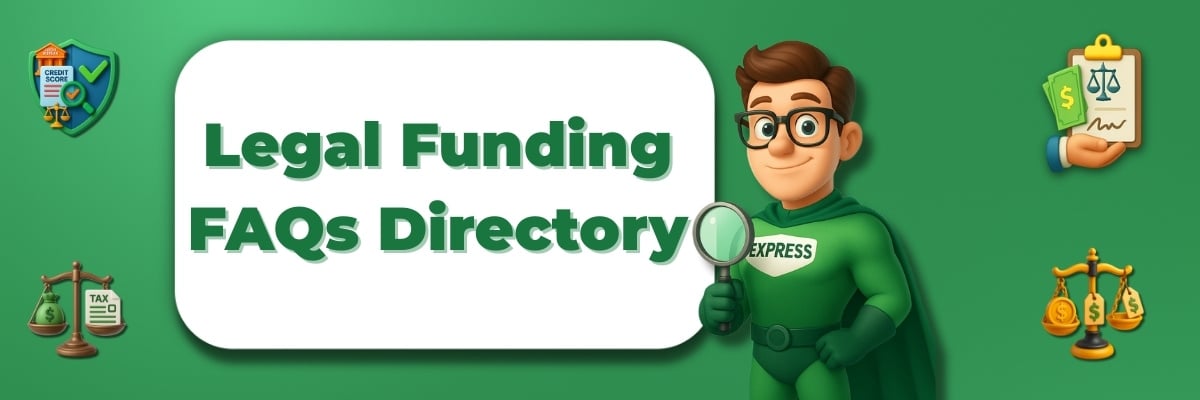

Lawsuit Loan FAQs
A lawsuit loan, also called a pre-settlement cash advance, is a form of legal funding that helps plaintiffs pay bills and expenses while waiting for their case to settle. Unlike traditional loans, they carry no personal liability because repayment only comes from your settlement or court judgment if you win. The process is simple: apply, your attorney provides case details, the funding company reviews your claim, and if approved, money is delivered—often within 24 hours.
Why Plaintiffs Turn to Lawsuit Loans for Financial Relief
Lawsuits can take months—or even years—to settle, leaving many plaintiffs burdened with daily expenses such as rent, medical bills, or household costs. This financial strain often forces people to consider low settlement offers simply because they cannot afford to wait.

Lawsuit loans, also known as pre-settlement funding, offer a solution. Despite the name, they are not traditional loans. Instead, they provide a cash advance on your future settlement that only needs to be repaid if your case is successful. If you lose, you owe nothing.
This type of funding is especially valuable in personal injury cases, including car accidents, slip and fall claims, medical malpractice, and wrongful death lawsuits. By giving plaintiffs access to funds now, lawsuit loans provide stability during long legal battles and allow attorneys the time they need to pursue fair compensation.
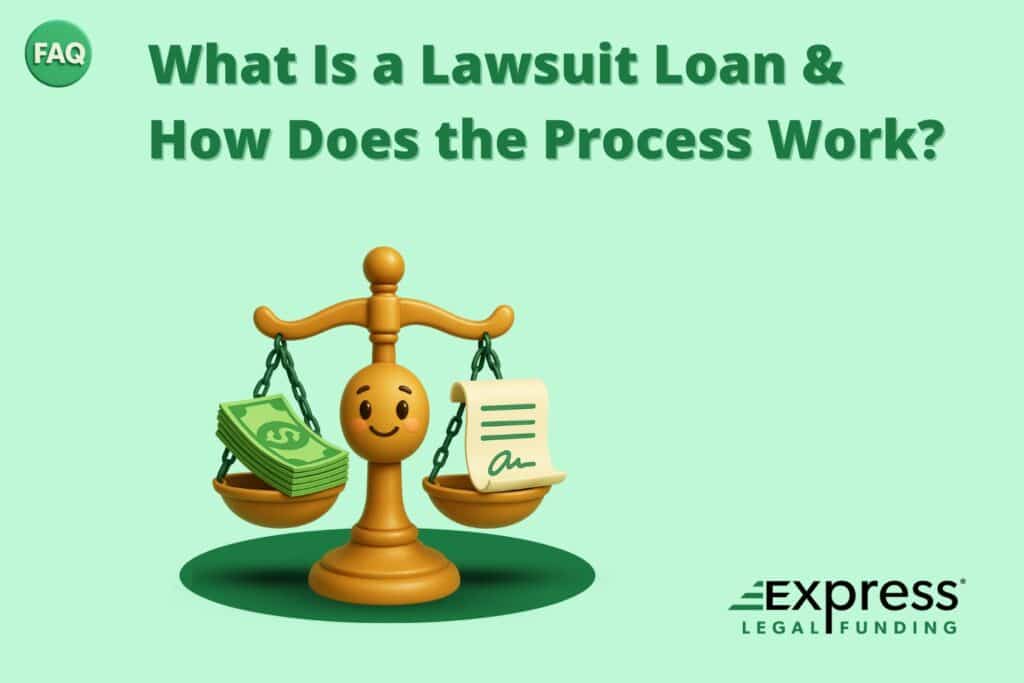
In this FAQ guide, we’ll break down what lawsuit loans are, how they work, who qualifies, their costs, and the protections available so you can make an informed decision.
Disclaimer: Although commonly referred to as “lawsuit loans”, these financial products are not loans in the traditional sense. They are non-recourse cash advances against your potential settlement or judgment. We use the term lawsuit loan throughout this page for accessibility and ease of understanding, but legally and financially, they are different from debt-based loans.
Definition & Basics of the Lawsuit Loan Process
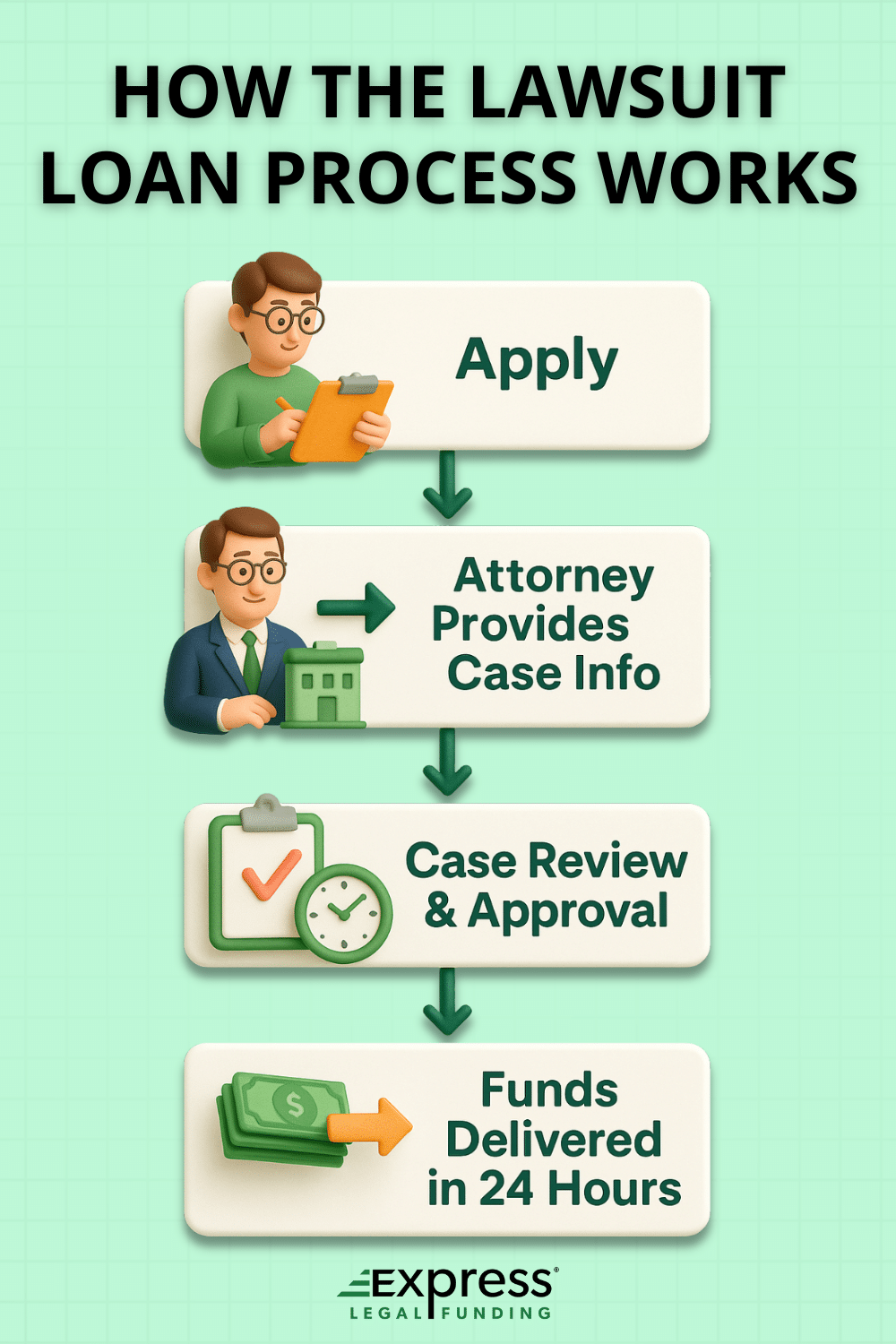
What is a lawsuit loan?
A lawsuit loan is a non-recourse cash advance on your future settlement or court judgment. It gives plaintiffs access to money while their case is still ongoing. Unlike traditional financing, this money is not tied to your personal credit, job history, or income. Instead, approval is based on the strength of your case and the potential value of your claim.
For example, if you were injured in a car accident and your attorney is pursuing compensation, a legal funding company may advance you part of your expected settlement so you can cover bills, rent, or medical care during the lawsuit.
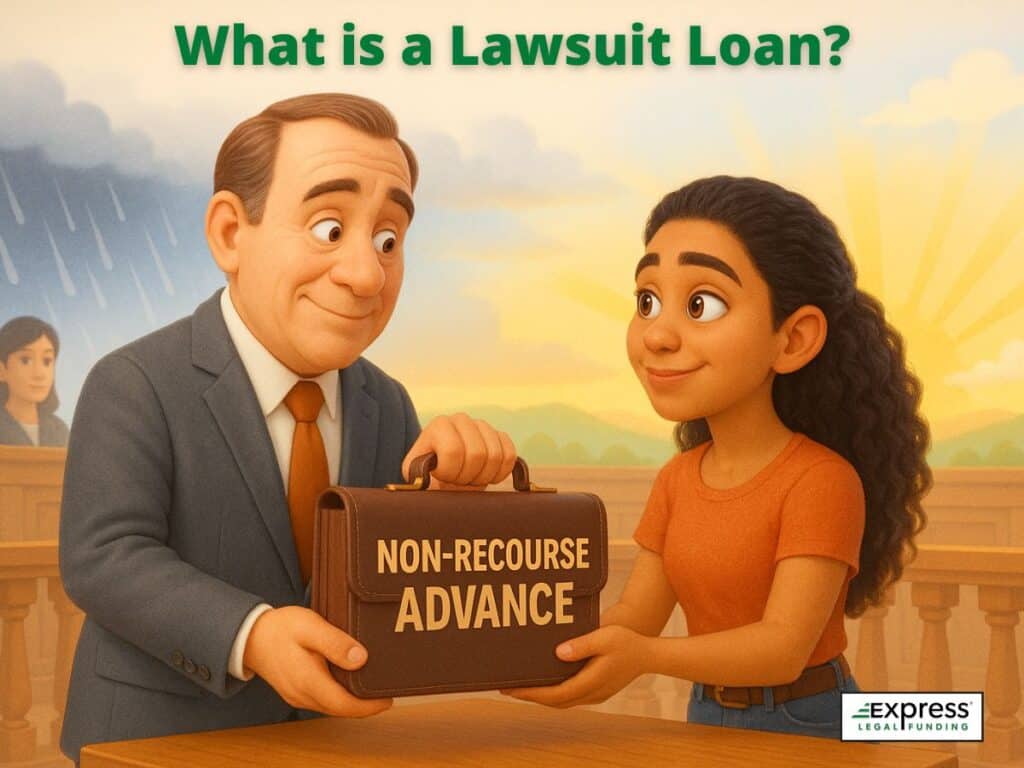
Is a lawsuit loan actually a loan?
Despite the name, a lawsuit loan is not a loan in the traditional sense. With a credit card or personal loan, you are responsible for repayment no matter what. Lawsuit loans work differently: repayment is conditional on a successful outcome. If your case fails, the advance does not need to be paid back.
This is based on state laws and court precedent.
This is why many providers, including Express Legal Funding, refer to them as pre-settlement funding or lawsuit cash advances, which more accurately describe the arrangement.
How do lawsuit loans work?
The lawsuit loan process is straightforward:
- Apply online or by phone.
- Case review: The funding company contacts your attorney for case details.
- Approval: If your case qualifies, you can receive money in as little as 24 hours.
- Repayment: Once your case settles, repayment is taken directly from your settlement proceeds.
This setup provides fast, risk-free access to funds for plaintiffs facing financial pressure.
Examples: How Lawsuit Loans Work in Real Life

Example: Car Accident Case
Martha was injured in a car accident and filed a personal injury lawsuit. While her attorney worked on the case, Maria’s medical bills and rent piled up. She applied for pre-settlement funding and, with her attorney’s cooperation, was approved for a $2,500 advance.
The money arrived the next day, allowing her to cover her living expenses while focusing on recovery. Months later, her attorney secured a settlement. Repayment was taken directly from the settlement proceeds, and Martha kept the remaining balance. If her case had been unsuccessful, she would have owed nothing.
Relevant guide: Can You Get a Loan on a Car Accident Settlement?
Example: Workplace Injury Case
James suffered a serious back injury while working at a construction site. His workers’ compensation claim was being disputed, and the case dragged on for months. Without income, James applied for pre-settlement funding and was approved for $4,000.
This money helped him cover rent and medical treatments until his case settled. When his attorney secured compensation, the advance was repaid directly from his award. If the case had been denied, James would not have owed anything.
Example: Medical Malpractice Case
Lisa filed a medical malpractice claim after a surgical error caused lasting complications. Her lawsuit was complex and expected to take years. Facing mounting medical bills, Lisa applied for pre-settlement funding. She was approved for a $10,000 advance, which covered therapy and household expenses.
Once her case concluded with a favorable settlement, repayment was deducted from her award. Had her case been unsuccessful, Lisa would have kept the funds without any obligation to repay.
These examples show how lawsuit loans provide practical, risk-free relief for plaintiffs who can’t afford to wait years for their case to resolve.
Lawsuit Loan Eligibility & Process

Who qualifies for lawsuit loans?
Not every plaintiff qualifies for a lawsuit loan. Approval depends on meeting a few key criteria:
- Active legal claim: You must have a lawsuit already filed in court or a legal claim under active attorney negotiation
- Attorney representation: You must be represented by a contingency fee attorney, since funding companies work directly with your lawyer to verify case details.
- Settlement potential: Your case must have clear settlement value, meaning there is a strong likelihood of compensation.
❌ Not eligible: Cases without legal representation or with uncertain liability usually do not qualify. Criminal cases, divorces, and child custody disputes are also not eligible.
What types of cases are eligible for lawsuit loans?
The most common types of cases that qualify for lawsuit loans include:
- Personal injury lawsuits: car accidents, truck accidents, slip and fall claims, and wrongful death cases.
- Medical malpractice: claims involving doctor or hospital negligence.
- Product liability: defective or dangerous products that cause injury.
- Civil rights and employment claims: wrongful termination, workplace discrimination, or harassment cases.
Because these cases often involve long legal battles and significant damages, they are good candidates for pre-settlement funding.
How do I apply for a lawsuit loan?
The lawsuit loan application process is designed to be simple and fast:
- Submit an application online or by phone in just a few minutes.
- Attorney cooperation: Express Legal Funding contacts your lawyer to gather details about your case, including liability, damages, and potential settlement value.
- Case review and approval: if your case meets the criteria, approval can happen within hours.
- Receive funds: most clients receive money in 24 hours or less after approval.
This streamlined pre-settlement funding process ensures plaintiffs can access the money they need quickly, without paperwork or credit checks.
Financial Terms of Lawsuit Loans
What are the costs and fees of lawsuit loans?
Lawsuit loans generally cost more than traditional bank loans because they are non-recourse and require no collateral. In these arrangements, the funding company assumes all the risk—if your case is unsuccessful, you owe nothing. To balance that risk, interest rates are typically higher than those for mortgages, credit cards, or personal loans, which always place repayment responsibility on the borrower.
Costs can vary significantly between providers. Some pre-settlement funding companies charge simple interest, which grows at a steady, predictable rate. Others use compound interest, which can make the payoff amount rise much faster over time. Before accepting funding, it’s crucial to understand which type of interest applies to your contract so you know the true cost of borrowing.
Example of Simple vs. Compound Interest for Lawsuit Loans
👉 Example: If you take a $3,000 advance with simple interest, you might owe $3,900 after a year. But with compounding, the payoff could be $4,500 or more over the same period.
You can see the difference in costs using our Lawsuit Loan Calculator.
At Express Legal Funding, we focus on transparent and affordable terms. You’ll know upfront how much the advance costs, with no hidden fees or surprise charges.
How is the lawsuit loan amount determined?
The amount you can receive from a lawsuit loan isn’t random. Lawsuit loan companies use an underwriting process that looks at several key factors, such as:
- Type of case: Serious injury cases usually qualify for higher advances than smaller disputes.
- Estimated settlement value: Larger expected payouts allow for larger funding.
- Insurance policy limits: The maximum available from the defendant’s insurer caps potential recovery.
- Attorney cooperation: The more details your lawyer provides, the easier it is to assess case strength.
Typical lawsuit loans range from $500 to $500,000, depending on the case. Plaintiffs should limit how much they borrow to what they need to cover essential living costs. Approved amounts are typically 10-20% of the full expected settlement. This prevents overborrowing and protects your final payout.
What happens if I lose my case? Do I have to repay the lawsuit loan?
If your case is unsuccessful, you don’t have to repay the lawsuit loan. The legal funding company accepts the loss, which is why settlement advances are considered one of the safest financing options for plaintiffs.

Can I get more than one lawsuit loan during my case?
Yes, in many situations, you can apply for more than one lawsuit loan (also called a pre-settlement advance) while your case is pending. Approval for additional funding depends on how your case is progressing, the estimated settlement value, and how much you have already borrowed.
Each request requires attorney cooperation and a new case review to ensure the advance is reasonable and won’t deplete your future recovery.
Important: While multiple advances are possible, borrowing too much can significantly reduce your final settlement payout. It’s best to only request the amount you truly need to cover essential expenses.
Pros and Cons of Lawsuit Loans
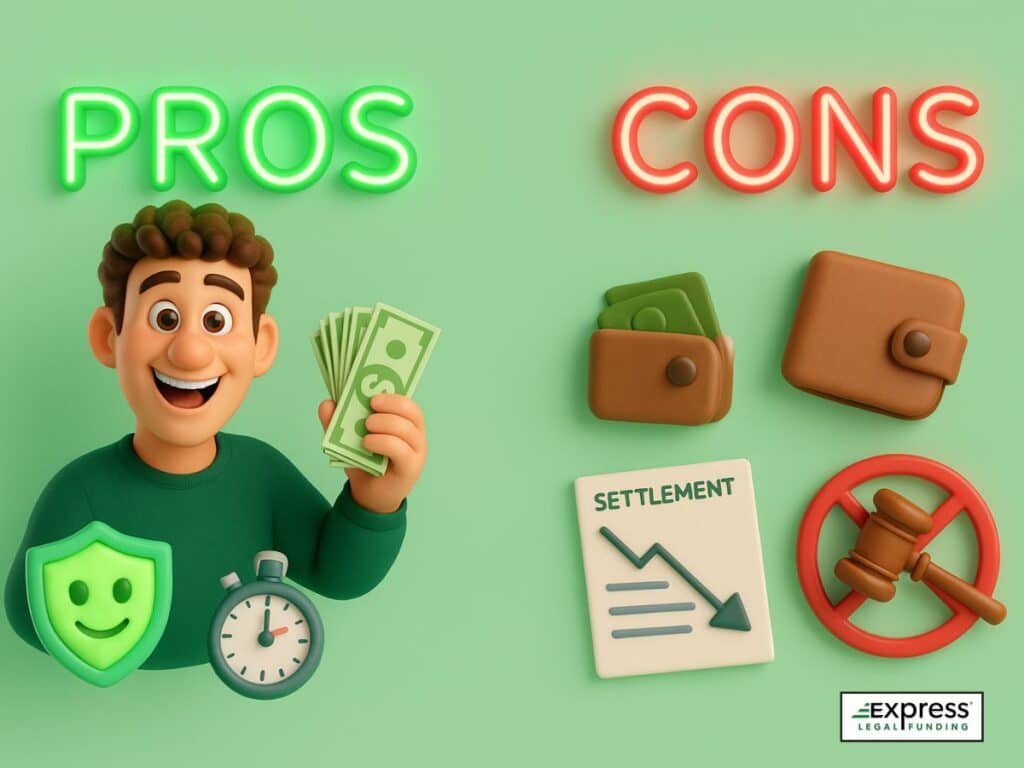
Before applying, it’s important to weigh both the benefits and drawbacks of lawsuit loans. Here are the main pros and cons:
Pros of Lawsuit Loans
[ninja_tables id="22908"]Cons of Lawsuit Loans
[ninja_tables id="22909"]Lawsuit Loans vs. Traditional Loans vs. Credit Cards
While lawsuit loans are often compared to personal loans or credit cards, they work very differently. The key distinction is that repayment is tied to your settlement—not your income, credit score, or ability to make monthly payments. Here’s a side-by-side look:
[ninja_tables id="22910"]Why Lawsuit Loans Are Safer Than Traditional Loans
Unlike bank loans or credit cards, lawsuit loans and pre-settlement funding are non-recourse and carry no personal liability. That makes this type of legal funding a unique and safer option for plaintiffs who need fast, risk-free cash to cover living expenses while waiting for their case to resolve.
In addition to comparing lawsuit loans with traditional financing, it’s also important to understand other funding alternatives that may be available.
Alternatives to Lawsuit Loans and Legal Funding
While lawsuit settlement loans can be a lifeline, they aren’t the only option. Depending on your situation, you may want to consider these alternatives:
1. Personal Loans
- Offered by banks or credit unions.
- Require good credit, income verification, and repayment regardless of your case outcome.
- Lower interest rates than legal funding options, but carry full personal liability.
2. Credit Cards
- Quick access to funds if you have available credit.
- May be suitable for short-term expenses, as cardholders can avoid interest charges if the balance is repaid in full within the billing cycle.
- High APRs and compounding interest make them risky if balances carry over.
3. Borrowing from Friends or Family
- Flexible repayment terms, often interest-free.
- Avoids high costs but may create personal strain if repayment is delayed.
4. Payment Plans or Medical Liens
- Some doctors and providers offer treatment on a lien basis—payment is deferred until settlement.
- Reduces immediate financial pressure without borrowing cash.
5. Community or Government Assistance
- Programs may cover essentials like housing, utilities, or food.
- Nonprofit aid can sometimes offset urgent expenses without debt.
Read our full guide: 15 Alternatives to Lawsuit Loans
Are Lawsuit Loans Safe? Risks and Protections Explained
What does “non-recourse” mean for lawsuit loans?
Non-recourse funding means the lawsuit lender’s repayment rights are limited only to the settlement proceeds. If the case doesn’t end in compensation, you walk away without owing anything further. This structure shifts the financial risk from the plaintiff to the funding company.

Do lawsuit loans affect your credit score or credit report?
No, lawsuit loans do not affect your credit score or appear on your credit report. Unlike traditional lenders, legal funding companies do not perform hard or soft credit inquiries, and repayment isn’t reported to credit bureaus.
Approval is based solely on your case strength, not your financial history. This makes lawsuit loans (pre-settlement funding) accessible to plaintiffs who might not qualify for traditional financing.
Relevant read: Do Pre-Settlement Funding Companies Require Credit Checks?
Are lawsuit loans taxable income?
No, lawsuit loans are not taxable because they are not considered income. A lawsuit loan is a cash advance against your future settlement, not wages or earnings. Since repayment only comes from your case proceeds, the IRS does not treat the advance as taxable income.
However, the final lawsuit settlement itself may be taxable depending on the type of damages (for example, punitive damages are usually taxable, while compensation for physical injuries is not). Always consult a tax professional about your specific case.
Do consumer protections exist for lawsuit loans?
Yes. Several states, including Illinois, Ohio, Oklahoma, Missouri, and Utah, have enacted laws to regulate pre-settlement funding. These laws require companies to provide clear contracts, transparent fee disclosures, and limit unfair practices.
Even in states without specific regulations, reputable companies like Express Legal Funding go beyond the minimum. We follow legal funding industry best practices to make sure every client receives upfront, easy-to-understand terms—no hidden costs, no fine print surprises.
These protections ensure lawsuit loans remain a safe financial option for plaintiffs who need immediate relief while pursuing justice.
Attorney Role and Settlement Effects of Lawsuit Loans
Do I need my attorney’s approval to get a lawsuit loan?
Yes. Your attorney must participate in the process. Funding companies rely on your lawyer to provide case information and to sign off on the agreement. This protects you, since it ensures the loan terms are fair and that funding won’t interfere with your case. Without attorney cooperation, you cannot receive pre-settlement funding.
Relevant read: Can I Get Pre-Settlement Funding Without Attorney Consent?
How does a lawsuit loan affect my settlement?
Repayment is taken directly from your settlement check before you receive the remainder. This means your final payout will be smaller, but it can also give you more time and financial stability to pursue a larger settlement. For example, instead of accepting the first lowball offer, you may have the resources to hold out until your attorney negotiates a fair result.
What should I discuss with my lawyer before applying for a lawsuit loan?
Before moving forward with a lawsuit loan, it’s smart to have a detailed discussion with your attorney. Key points to cover include:
- Funding amount: How much do you actually need? Borrowing less helps you preserve more of your eventual settlement.
- State regulations: Lawsuit funding rules differ by state, so confirm what applies to your case.
- Repayment terms: Review how repayment will work and how it will affect your net recovery.
When your lawyer is involved early, a lawsuit loan can serve as a helpful financial tool instead of creating unnecessary strain.
Why is Express Legal Funding the best company for lawsuit loans?

Not all lawsuit loan companies are the same. Many operate as brokers, adding extra costs and confusing terms. At Express Legal Funding, we do things differently.
- Direct Lender Advantage: We are a direct funding company, not a broker. That means lower costs for you and no hidden middleman fees.
- Transparent Terms: From the start, you’ll know exactly what your funding will cost. We don’t use fine print or vague contracts. Our goal is to provide clarity, not confusion.
- Fast Approvals: We understand that plaintiffs often need money right away. That’s why we work with your attorney quickly and deliver funding in as little as 24 hours.
- Same-day Funding: We offer multiple same-day funding options, including same-day ACH and e-check for instant delivery.
- Risk-Free Guarantee: If you don’t win your case, you owe nothing. Period.
- Personal Injury Focus: Most of our clients are accident victims dealing with medical bills and lost wages. We’re experienced in helping people facing those exact challenges.
With Express Legal Funding, you can feel confident knowing you’re getting honest, affordable, and fast financial support while your attorney fights for the settlement you deserve. We’ve funded thousands of plaintiffs since 2015 and are BBB A+ accredited.
Additional Lawsuit Settlement Loan FAQs
Still have questions? Explore more of our detailed FAQ resources:
- Do I Need a Lawyer to Get Legal Funding?
- How Much Does Pre-Settlement Legal Funding Cost?
- Do I Have to Pay Taxes on Pre-Settlement Legal Funding?
- What Are the Pros and Cons of Pre-Settlement Funding?
Closing Thoughts on Lawsuit Loans and Pre-Settlement Funding
Waiting for a lawsuit to settle can feel like a financial battle of its own. Bills keep coming, medical expenses pile up, and daily living doesn’t pause for the legal process. A lawsuit loan—more accurately known as pre-settlement funding—offers a way to ease that stress. Because repayment is tied only to a successful settlement, this type of funding is both safe and risk-free.
Apply for a Risk-Free Lawsuit Loan Today
At Express Legal Funding, we make the process simple: you can apply in minutes, we review your case quickly, and you often receive cash in 24 hours or less once approved. With transparent terms and no hidden fees, you can focus on your case while we help with your immediate financial needs.
👉 Don’t wait for your case to drag on. Apply for a risk-free lawsuit loan online today and get the cash you need now. You can also apply by calling us at (888) 232-9223. Our helpful customer service team is available to answer your call anytime, 24/7.

Legal Funding Basics FAQs
Non-recourse legal funding is a risk-free cash advance provided to plaintiffs during ongoing litigation. It requires no collateral and is only repaid if the case results in a settlement or favorable judgment. If the lawsuit is unsuccessful, the plaintiff owes nothing, making it a safe and flexible financial solution for those awaiting compensation.
Overview of Non-Recourse Legal Funding
Non-recourse legal funding, also known as pre-settlement funding and sometimes referred to as a lawsuit loan, is a risk-free cash advance available to injured plaintiffs while they wait for their case to resolve.
This guide explains how it works, how it differs from a traditional loan, what types of cases qualify, and why Express Legal Funding is a trusted provider offering fast, transparent support with no repayment required if you lose your case.
How Non-Recourse Legal Funding Works
What is non-recourse legal funding for plaintiffs?
Non-recourse legal funding is a cash advance offered to plaintiffs in civil lawsuits, based on the anticipated value of their future settlement or judgment. It’s considered “non-recourse” because you only repay the funding if your case is successful, either through a settlement or court award. If you lose, you owe nothing.
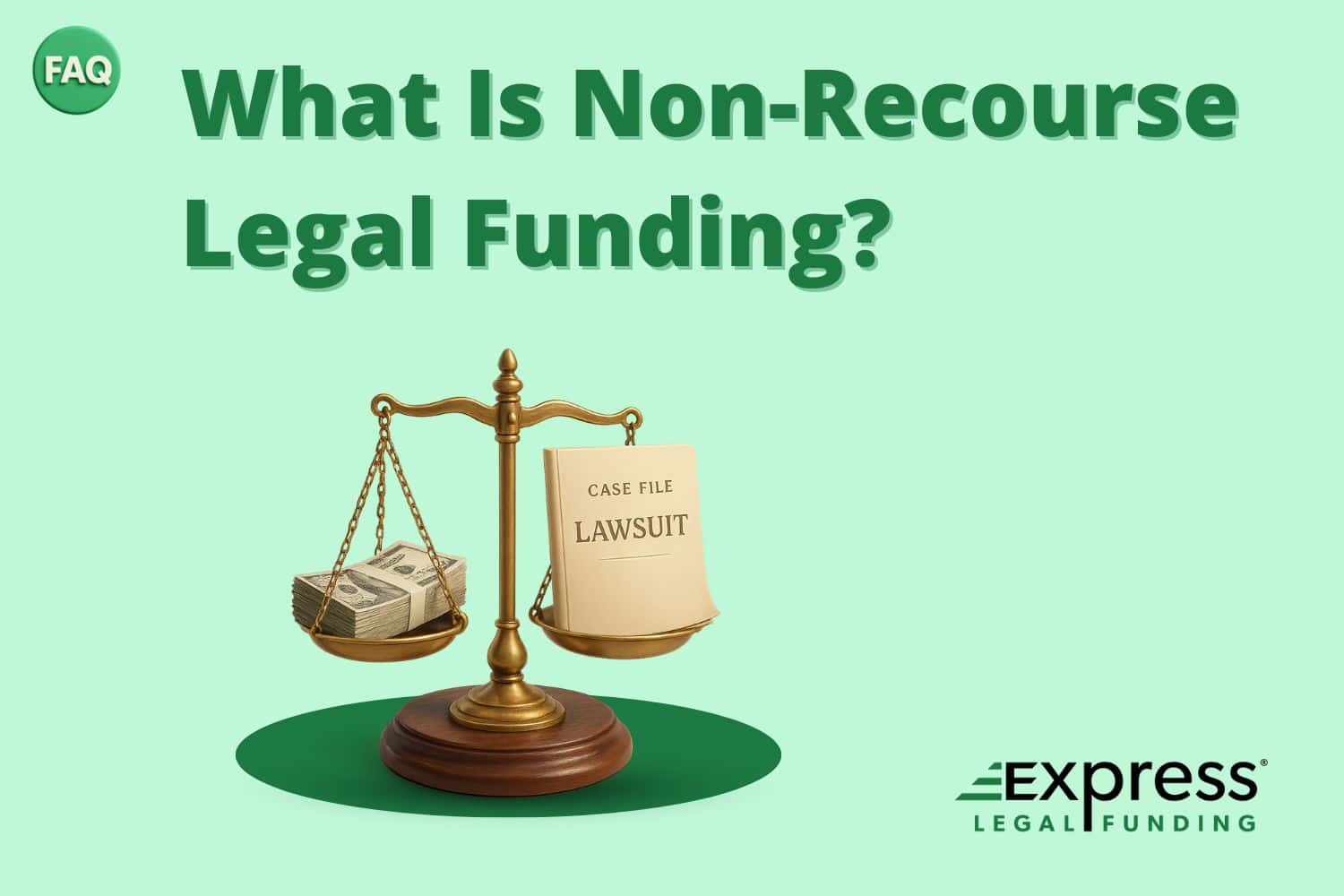
How does non-recourse funding differ from recourse loans?
Non-recourse legal funding is fundamentally different from traditional (recourse) loans because it carries no personal repayment obligation. If you lose your case, you’re not required to repay the advance. In contrast, recourse loans hold you personally liable, meaning the lender can pursue your income, credit, or assets to collect the debt, regardless of the outcome of your case.
Why is it called 'non-recourse'?
The term “non-recourse” means the funding company cannot pursue you personally for repayment if your case is unsuccessful. Their only source of repayment is your future settlement or court award. If there’s no recovery, you owe nothing.
Is non-recourse legal funding considered a loan?
No. Legal funding is typically classified as a non-loan financial product or legal advance. This distinction means it isn’t subject to the same laws and interest rate caps that govern loans.
Key Terms in a Non-Recourse Funding Agreement
What are the legal terms involved in a non-recourse legal funding agreement?
A non-recourse legal funding agreement sets forth the official terms under which a plaintiff receives an advance on their expected settlement. The contract is designed to ensure transparency and legal clarity for all parties involved. Key provisions typically include:
- Funding amount: The specific dollar amount being advanced to you based on your case’s estimated value.
- Repayment terms: Clear instructions on how and when repayment occurs—usually only if and when you receive a monetary settlement or judgment.
- Fees and charges: A detailed breakdown of applicable funding rates, capped fees, and how charges accrue over time (e.g., fixed or compounding).
- No-repayment clause: A critical provision confirming that you owe nothing if your case is unsuccessful—this is what makes the funding non-recourse.
- Purchase Agreement: The core legal contract that outlines the sale of a portion of your future recovery to the funding company in exchange for the advance.
- Consumer Disclosure: A document summarizing the funding terms in plain language, including the total anticipated repayment amount and effective rate, designed to ensure you understand the cost of funding.
- Payment Instructions: Specifies how you wish to receive your funds (e.g., via ACH transfer, wire, e-check, or other method).
- Notice of Purchase and Assignment: A clause stating that the funding company has purchased a portion of your potential recovery, and that this assignment is acknowledged by you and your attorney.
- Irrevocable Letter of Direction: An authorization directing your attorney to repay the funding company directly from your settlement or judgment proceeds before disbursing any remaining funds to you.
- Attorney Acknowledgment: A signed statement from your attorney confirming their cooperation, agreement with the terms, and responsibility for handling repayment per the contract.
These components work together to ensure legal clarity, consumer protection, and ethical handling of funds throughout your case.
Learn more about the different types of legal funding in our guide: What Are the Types of Legal Funding?
Do I have to repay my non-recourse legal funding if I lose my case?
No. That’s the key benefit of non-recourse funding. You are not obligated to repay the advance if you do not win or settle the case.
Who Qualifies and How to Apply for Non-Recourse Legal Funding
Who qualifies for non-recourse legal funding?
To qualify for non-recourse legal funding, you must have a strong personal injury or civil lawsuit, be represented by a contingency fee attorney, and have a lawyer who is willing to cooperate with the funding company by providing case documents for review.
What types of cases are eligible for non-recourse legal funding?
Common case types that qualify for non-recourse legal funding include:
- Car accidents
- Slip and fall injuries
- Medical malpractice cases
- Wrongful death
- Workplace injuries
- Product liability lawsuits
Do I need an attorney to apply for legal funding?
You can apply for legal funding without an attorney, but you must have legal representation to be approved. Funding companies require your attorney’s cooperation to review your case and finalize the funding agreement.
Explore the importance of having a lawyer for pre-settlement funding further in our guide: Can I Get Pre-Settlement Funding Without Attorney Consent?
Can I be denied funding? If so, why?
Yes, legal funding can be denied for several reasons. Common factors include weak or disputed liability, a low expected settlement value, an attorney who is unwilling to cooperate, or excessive existing funding from other providers that limits remaining recovery.
Non-Recourse Funding Process and Repayment
How does the non-recourse legal funding process work?
The non-recourse legal funding process is fast and straightforward:
- Submit your application: Apply online or over the phone with basic case details.
- Attorney cooperation: Your lawyer provides case documents and confirms representation.
- Case evaluation: The funding company reviews your claim’s strength and estimated value.
- Approval and agreement: If approved, you’ll receive a funding agreement to sign.
- Receive your funds: Once finalized, funds are typically disbursed within 24 hours, often the same day.
How much money can I receive through legal funding?
The amount you can receive through legal funding depends on the estimated value of your case. Advances typically range from $500 to $500,000. Funding companies assess your projected settlement by evaluating damages, including medical expenses, lost wages, and pain and suffering, along with attorney fees, liens, and other case-related deductions.
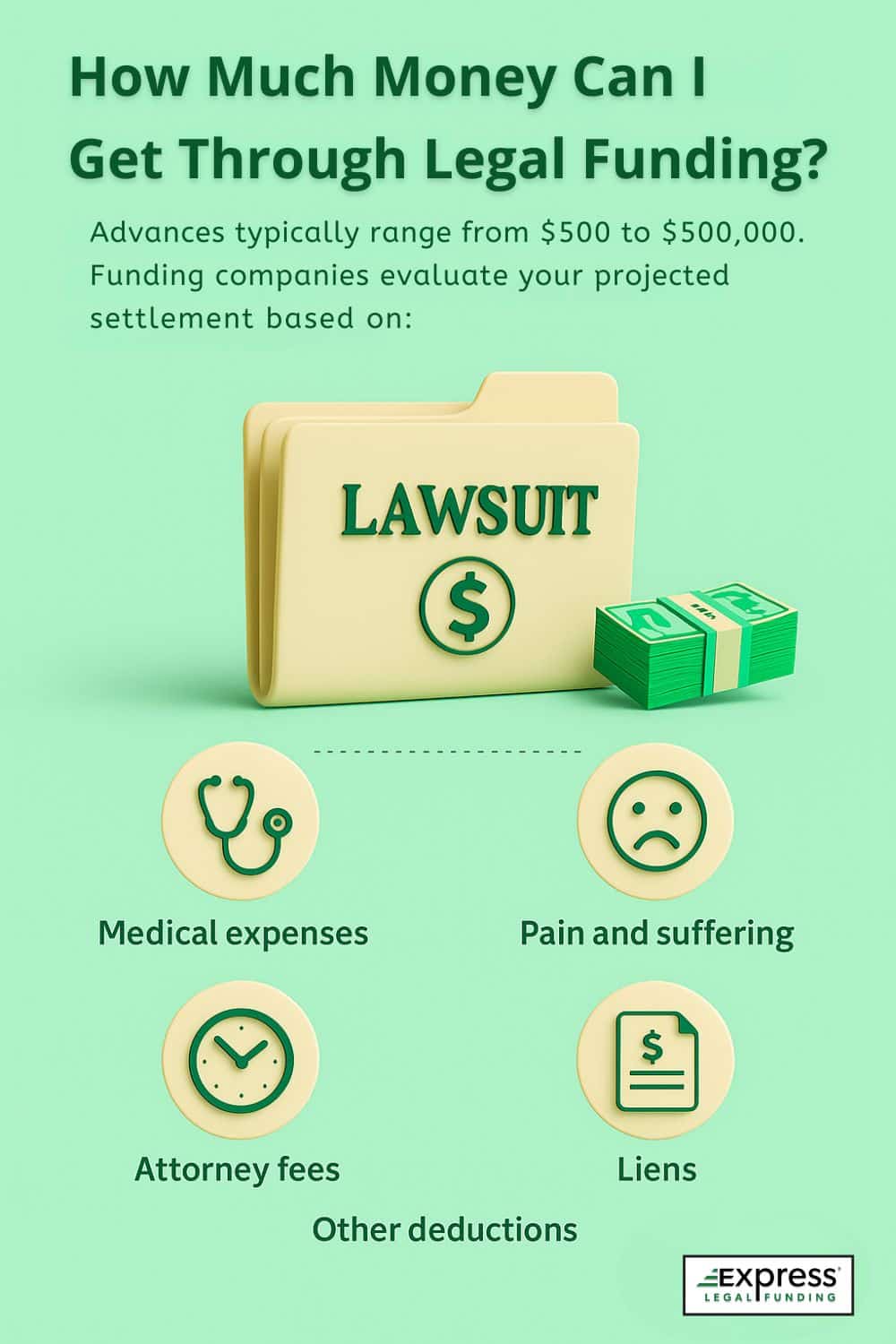
Relevant guide: How Much Pre-Settlement Funding Can I Get on My Case?
When do I get my funds after approval?
Most clients receive their funds within 24 hours of approval—often the same day—through a secure ACH transfer, direct deposit, or e-check, depending on the method selected.
What happens if my case takes longer than expected?
If your case takes longer than expected, there’s no pressure to repay early—non-recourse legal funding is only repaid after your case settles. Your agreement remains valid for the duration of your lawsuit, though fees or charges may continue to accrue over time based on the terms outlined in your contract.
Are there any upfront costs or fees?
No, reputable legal funding companies do not charge any upfront costs. There are no application fees, hidden charges, or credit checks required. Any fees associated with the funding are only repaid after your case settles or results in a successful judgment.
How are fees calculated on non-recourse legal funding?
Fees on non-recourse legal funding are usually calculated as either a fixed rate or a monthly compounding rate applied to the funded amount. The total cost depends on how long your case takes to resolve, so it's important to ask whether the fees are based on a simple interest model or compound over time.
Try our pre-settlement loan calculator
Do interest rates apply to my funding amount?
Yes, though they’re often not classified as traditional “interest” under state laws. Instead, these charges are typically labeled as funding fees or usage fees, which can vary significantly between providers. Rates vary widely, so review the terms carefully and choose a company that offers clear, transparent pricing.
Non-Recourse Legal Funding Benefits and Drawbacks
What are the benefits of choosing non-recourse funding?
Non-recourse legal funding provides several important advantages for plaintiffs during a pending lawsuit:
- No repayment if you lose: You owe nothing if your case doesn’t result in a settlement or award.
- Fast access to cash: Funds are often disbursed within 24 hours of approval.
- Covers essential living expenses: Helps you pay for rent, groceries, medical bills, and utilities.
- No credit impact: No credit checks are required, so it shouldn’t affect your credit score.
- Supports a stronger case outcome: Gives your attorney more time to negotiate a fair and full settlement without financial pressure.
Relevant read: What Are the Pros and Cons of Pre-Settlement Funding?
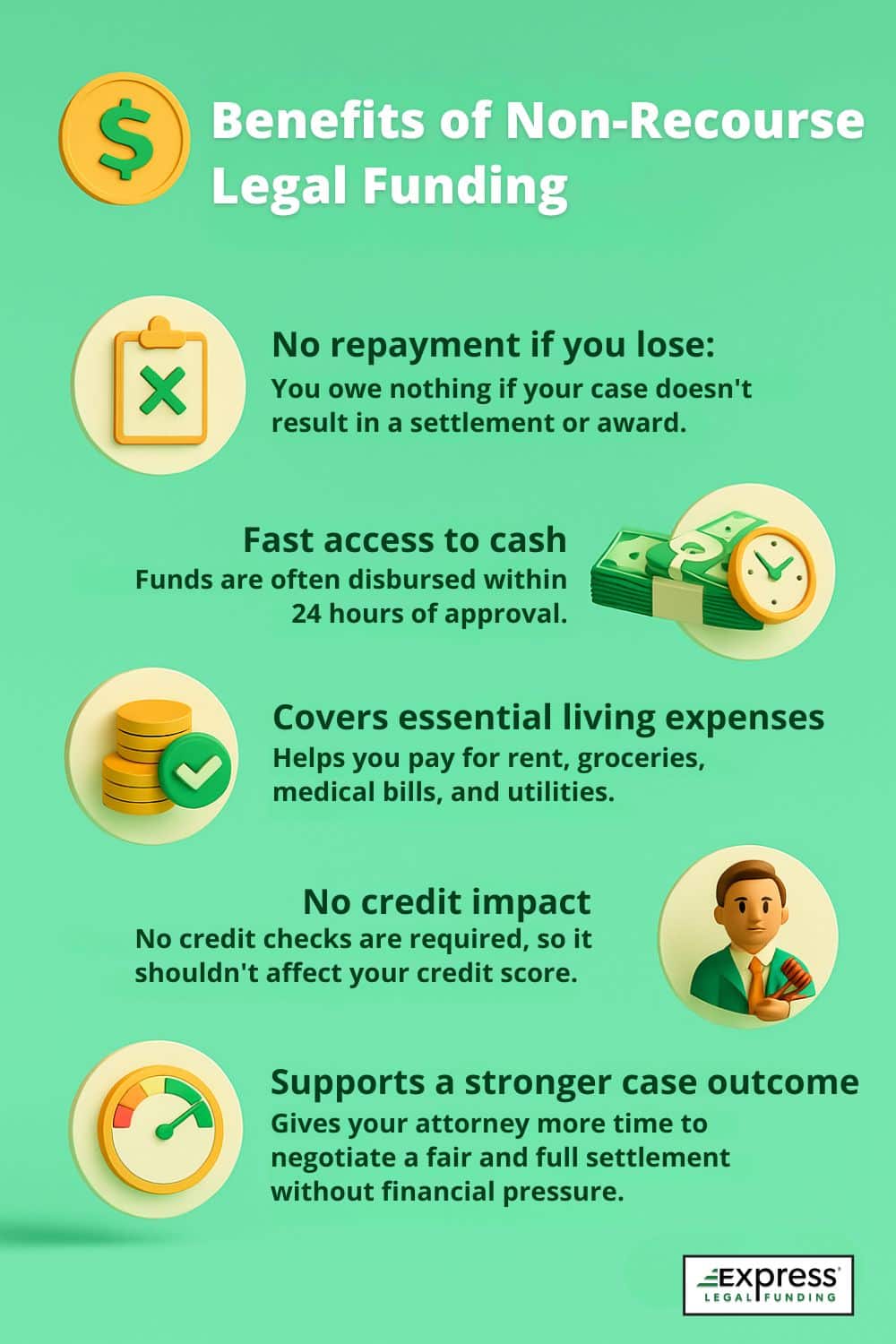
Are there risks involved for plaintiffs?
Non-recourse legal funding isn’t considered risky because you owe nothing if you lose your case. However, the advance and any applicable fees are deducted from your final settlement, which can reduce your net payout. Since you’re receiving part of your future settlement upfront, it’s important to borrow only what you need and fully understand the terms.
How does non-recourse funding help during long legal battles?
Non-recourse funding provides crucial financial support during prolonged lawsuits, helping plaintiffs pay for essentials like rent, food, and medical bills. By easing financial stress for plaintiffs, it prevents the need to settle early for less and gives your attorney the time and leverage to pursue the full value of your claim.
Legal Rights and Protections
Is non-recourse funding regulated by law?
Regulation and legality of non-recourse legal funding varies by state. Some states have specific laws or consumer protection regulations that govern the industry, while others do not regulate it at all. Because oversight differs, it’s essential to read your contract thoroughly and ask questions to ensure you understand the terms.
Can a legal funding company interfere in my case?
No, legal funding companies are not allowed to interfere with your case. They have no control over legal decisions, settlement negotiations, or your attorney’s strategy—those remain strictly between you and your lawyer.
What rights do I have under a non-recourse funding agreement?
When you enter into a non-recourse funding agreement, you’re entitled to several important rights designed to protect your interests:
- Right to clear disclosure of terms: You have the right to receive a transparent explanation of all fees, rates, and repayment conditions before signing.
- Right to cancel within a grace period: In many states, you can cancel the agreement without penalty within a specified time frame.
- Right to attorney-client confidentiality: Your legal funding arrangement does not waive your attorney-client privilege and, in some states, is specifically protected from discovery.
What should I look for in a legal funding company?
When choosing a legal funding provider, look for a company that prioritizes fairness, speed, and transparency. Key qualities include:
- Transparent terms: Clear, easy-to-understand contracts with no confusing language.
- Capped fees: Limits on how much the legal funding costs can grow over time.
- No hidden charges: All fees should be disclosed upfront—no surprises later.
- Fast turnaround: Quick application processing and same-day or next-day funding options.
- Excellent customer support: Responsive, knowledgeable staff to guide you through the process.
- Direct funding (not via brokers): Work with companies that fund cases directly to avoid extra markups or third-party delays.
Alternatives to Non-Recourse Legal Funding
If you're not ready to pursue legal funding or want to explore other financial options, here are some common alternatives to help cover expenses during a lawsuit:
- Personal savings: Using your own funds can help you avoid fees or repayment obligations.
- Friends or family: Borrowing from trusted individuals may provide flexible, interest-free support.
- Personal loans or credit cards: These options may be accessible but often involve interest, credit checks, and personal liability.
- Disability benefits or insurance payouts: If you're eligible, these can provide steady income during recovery.
- Crowdfunding platforms: Online fundraising through platforms like GoFundMe can help gather community support for urgent needs.
Relevant guide: 15 Alternatives to Lawsuit Loans
Is non-recourse legal funding the right choice for me?
If you're struggling financially while waiting for your personal injury or civil case to settle, non-recourse legal funding can be a smart solution. It provides fast, risk-free support with no repayment if you lose—making it a helpful tool when used responsibly and with a clear understanding of the terms.
How is Express Legal Funding different from other legal funding companies?
Express Legal Funding sets itself apart by providing honest, affordable, and risk-free non-recourse legal funding designed to protect your recovery. Here's what makes us different:
- Low, affordable rates: Our pricing is competitive and structured to help you keep more of your settlement.
- Capped origination fee: We limit the upfront cost to ensure your funding remains fair and manageable.
- Capped funding rate: Your rate won’t spiral over time—we set clear maximums to protect your payout.
- Direct funding—not through brokers: We fund your case directly, eliminating broker markups and delays.
- 100% risk-free guarantee: You owe nothing if your case doesn’t settle or win—no hidden conditions.
- No hidden fees: All terms are clearly disclosed upfront, with no surprise charges.
At Express Legal Funding, we prioritize transparency and fairness, so you get the financial support you need without compromising your future settlement.
See why Express Legal Funding ranked number one as the best legal funding company in 2025: 10 Best Legal Funding Companies in 2025
Final Thoughts on Non-Recourse Legal Funding
Non-recourse legal funding can be a valuable lifeline for plaintiffs facing financial hardship during a pending lawsuit. It offers risk-free access to cash when you need it most, without adding debt or requiring repayment if your case is unsuccessful.
As with any financial decision, it’s important to understand the terms, borrow only what you need, and choose a transparent, reputable funding company. When used wisely, non-recourse funding can help you stay afloat and give your attorney the time needed to pursue the fair settlement you deserve.
Apply Now for Non-Recourse Legal Funding
Are you waiting on a personal injury or civil lawsuit to settle and need fast financial support? Express Legal Funding can help you get the cash you need, risk-free and with no upfront costs.
Apply in Minutes
Simply complete the secure form below. Our team will review your application and contact your attorney for a quick case evaluation.
Yes, you need an attorney to qualify for legal funding. Pre-settlement funding companies, including Express Legal Funding, require that you have legal representation from a contingency-fee attorney. Without a lawyer, your application can’t be approved, as attorneys play a crucial role in verifying your case, ensuring legal compliance, and protecting your interests.
Before you can get approved for pre-settlement funding, one of the most important requirements is having a lawyer on your side. Legal funding companies won’t move forward with your application unless you're represented by an attorney who can verify your case details and ensure everything is handled ethically.
Here’s why having legal representation is essential for getting legal funding.
Why You Need a Lawyer to Get Legal Funding
Legal funding, also called pre-settlement funding or a lawsuit cash advance, is not a loan. It's a non-recourse financial agreement: you only repay if you win or settle your case.
Because of this structure, legal funding companies must evaluate your case’s strength, and that’s only possible with help from your attorney of record.
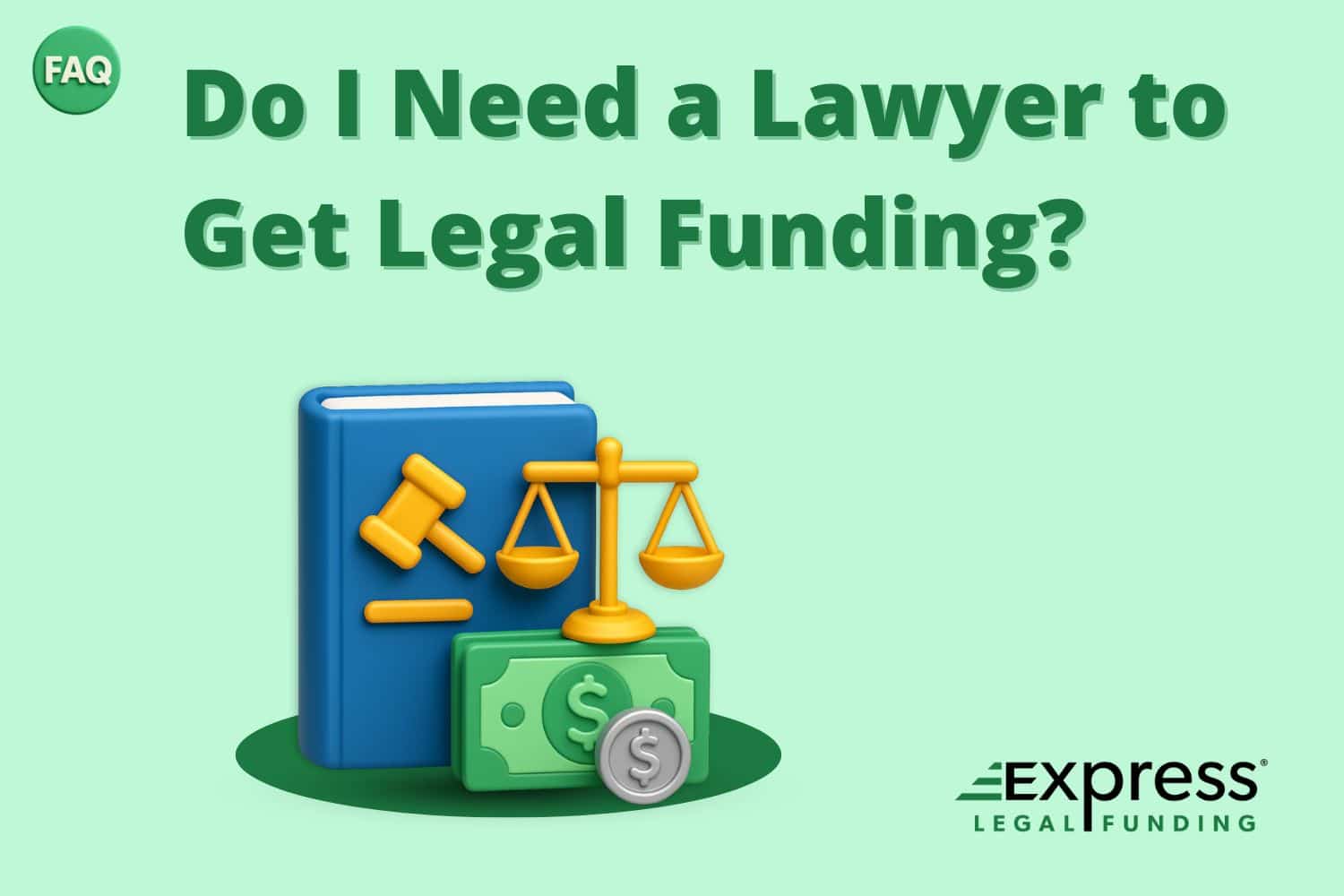
Legal Funding Requires a Contingency-Fee Attorney
To be eligible for legal funding:
- Your lawyer must work on a contingency fee basis (no win, no fee).
- The attorney must be actively involved in your lawsuit.
- They must agree to cooperate with the funding provider and verify case documentation.
This legal relationship ensures the funding company can accurately assess the risk and your likelihood of winning the case.
Relevant read: Pre-Settlement Funding: A Guide for Plaintiff Attorneys
Legal Funding Is Not a Traditional Loan
Legal funding is non-recourse, meaning repayment is only required if your case is successful. This differs from traditional loans and aligns with the contingency fee structure, where attorneys are paid based on the outcome of your case. This is why legal funding is often called a pre-settlement cash advance.
What Your Attorney Does During the Legal Funding Process
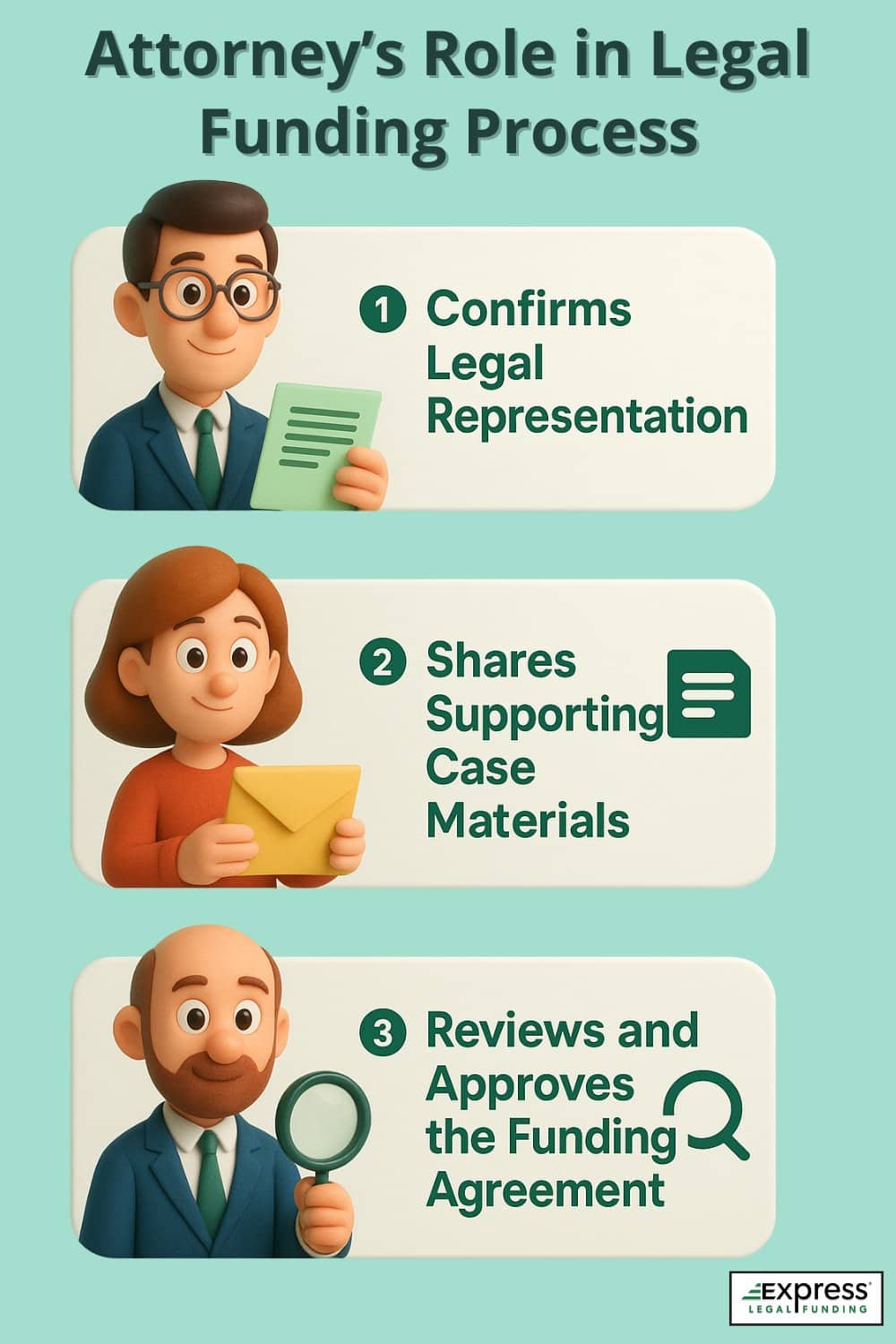
Your lawyer is essential at every step of securing legal funding:
1. Confirms Legal Representation
Verifies that you’re actively pursuing a valid claim with their help.
2. Shares Supporting Case Materials
Attorneys play a vital role in submitting necessary documents and communicating with legal funders. This includes sending police reports, medical records, demand letters, and other documents needed to assess your case.
3. Reviews and Approves the Funding Agreement
Your attorney evaluates the funding terms to ensure they’re fair, ethical, and in your best interest.
Can I Get Legal Funding Without a Lawyer?
No. Reputable legal funding companies do not work with unrepresented plaintiffs (also known as pro se litigants). Here’s why:
- Legal Barriers: Many states require attorney involvement for consumer legal funding.
- Risk of Misunderstanding: Without legal guidance, clients may not understand the terms or risks of getting legal funding.
- Underwriting Limitations: Funders can’t properly evaluate a case without legal insight.
Applying without an attorney poses risks, such as misunderstanding terms and lacking proper case evaluation.
Exception: Some limited non-litigation claims, such as certain probate or inheritance funding, may not require an attorney, but these are rare.
What If My Attorney Doesn’t Approve of Legal Funding?
Ultimately, attorney participation is voluntary. If your lawyer refuses to cooperate, you will not be able to receive funding from Express Legal Funding or any reputable provider, but it’s important to understand why they’re concerned and what your options are. Legal funding companies rely on attorney cooperation to move forward, so their disapproval can delay or prevent approval.
Relevant guide: Can My Lawyer Stop Me From Getting Pre-settlement Funding?
Common Reasons an Attorney May Say No to Legal Funding or Lawsuit Loans
Your lawyer might reject a funding request due to:
- Ethical concerns: They may worry about high interest rates or repayment terms that could harm your financial recovery.
- Firm policies: Some law firms avoid third-party funding arrangements altogether to avoid conflicts of interest or administrative burdens.
- Impact on settlement strategy: Attorneys may believe funding could discourage you from accepting a fair settlement offer or complicate lien negotiations.
What You Can Do Next

If your attorney declines to cooperate with a legal funding request, here are steps you can take:
- Start a conversation: Ask your attorney to explain their specific concerns and whether they’d support funding with revised terms.
- Negotiate better terms: Reach out to the funding company to see if they’ll adjust the offer to satisfy your attorney’s standards.
- Explore alternatives: Consider other forms of financial help, such as personal loans, hardship grants, or connecting with a different law firm if appropriate.
Pro Tip: Legal funding is most successful when your attorney is fully on board. If you're working with Express Legal Funding, we’re happy to collaborate directly with your lawyer to answer their questions, address concerns, and provide transparent terms that meet ethical standards.
How to Apply for Legal Funding With an Attorney
- Hire a Contingency-Fee Attorney: Choose a lawyer who agrees to work on your case and supports legal funding.
- Apply with Express Legal Funding: Complete the online application form or call our team directly.
- Attorney Case Review: We contact your attorney to request case documentation and confirmation of representation.
- Approval and Agreement: If approved, both you and your attorney will receive and sign your portions of the funding contract.
- Receive Funds: Get your lawsuit cash advance, often within 24 hours of approval.
Can I Apply for Legal Funding Before Hiring a Lawyer?
Yes, you can begin the legal funding inquiry process before hiring a lawyer, but you won’t be approved until you retain legal counsel. Most legal funding companies, including Express Legal Funding, require your attorney’s active involvement to evaluate your case and move forward with approval.
[ninja_tables id="21910"]FAQs About Needing a Lawyer to Get Legal Funding
Do pre-settlement funding companies require my lawyer to sign anything?
Yes. Reputable pre-settlement funding companies typically require your attorney to sign a confirmation of representation and lien agreement known as an "Attorney Acknowledgment". This signed document verifies that your lawyer is actively handling your case and agrees to cooperate by sharing case information and ensuring repayment from the future settlement proceeds.
Without this signed cooperation, your funding application cannot be approved.
Relevant guide: Can I Get Pre-Settlement Funding Without Attorney Consent?
Can I switch attorneys to one who supports legal funding?
Yes, but it's a decision that should be made cautiously. While switching to an attorney who supports legal funding is possible, it's generally best to maintain continuity with your current lawyer whenever possible. Changing representation can delay your case and may not always be in your best interest.
We recommend first discussing your concerns openly with your attorney to explore potential solutions before considering a switch.
What if I already applied and didn’t have a lawyer?
Your application cannot be approved without legal representation. Legal funding companies require an attorney to verify your case details and participate in the approval process. If you applied without a lawyer, you’ll need to hire one before your application can proceed.
Once you have legal representation, you can reapply. If you need help finding an attorney, many legal funding companies, like Express Legal Funding, can offer referrals to qualified lawyers in your area.
Have More Questions About Legal Funding and Attorney Involvement?
If you're wondering whether your case qualifies for funding or need help finding an attorney:
- 📞 Call Express Legal Funding Toll-Free at (888) 232-9223
- 📝 Apply Online for Legal Funding
No, pre-settlement funding does not require monthly payments. Unlike traditional loans, repayment is only made from the settlement proceeds once your case is resolved. This means you can access funds without the stress of monthly bills, allowing you to focus on your legal proceedings without financial pressure.
Pre-settlement funding is a financial service designed to provide plaintiffs with cash advances against their expected settlement.
Unlike traditional loans, pre-settlement funding is non-recourse, meaning there are no monthly payments, no credit checks, and no personal liability if the case is lost.
This page answers common questions about repayment and monthly obligations associated with pre-settlement funding.
Do I Have to Make Monthly Payments on a Pre-Settlement Funding Advance?
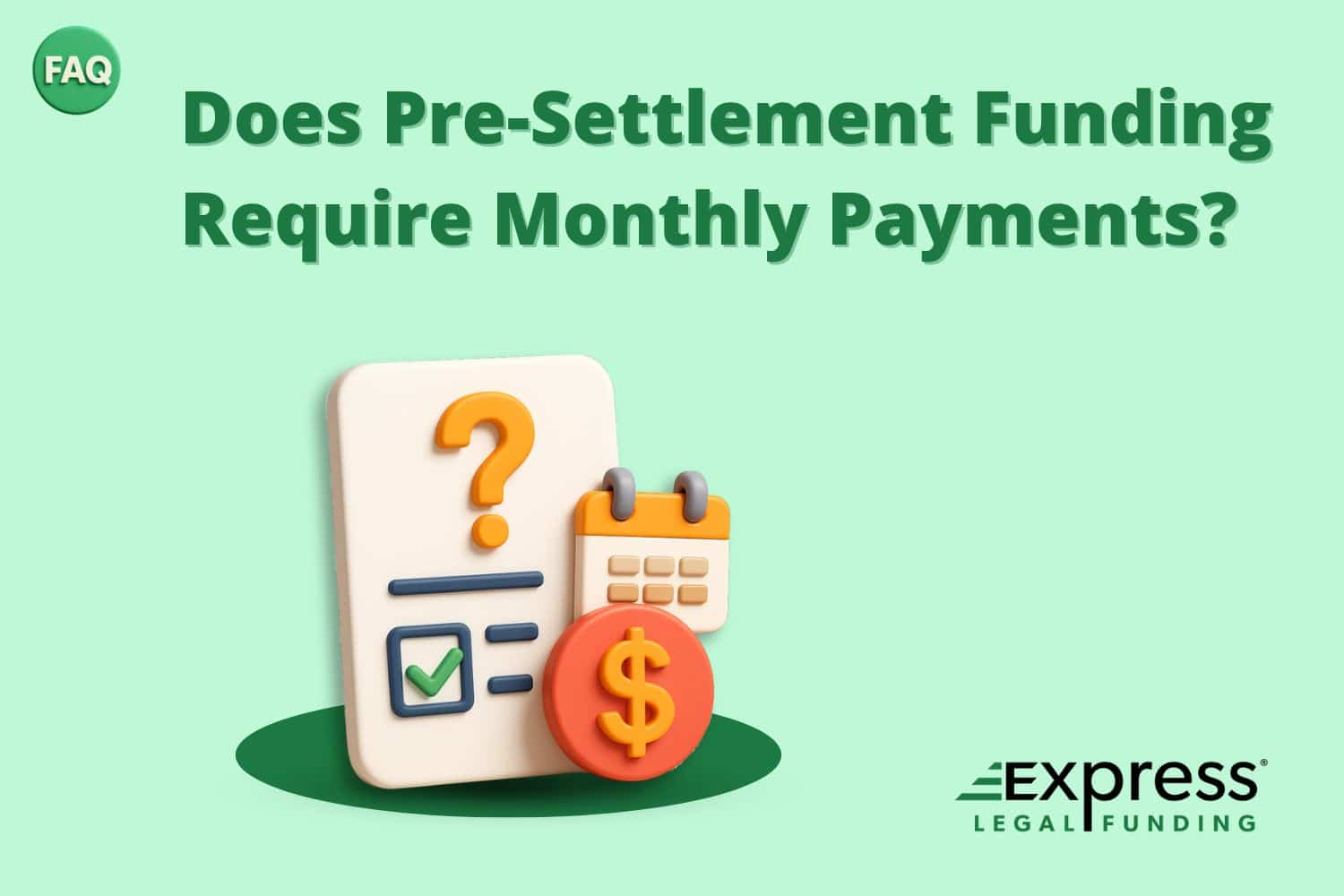
No, you do not have to make monthly payments on a pre-settlement funding advance.
Pre-settlement funding is non-recourse, meaning repayment is only required if the plaintiff wins or settles their case. The funds are repaid directly from the settlement, not out of pocket. This ensures no monthly bills and no financial pressure during your lawsuit.
FAQs About Monthly Payments and Pre-Settlement Funding
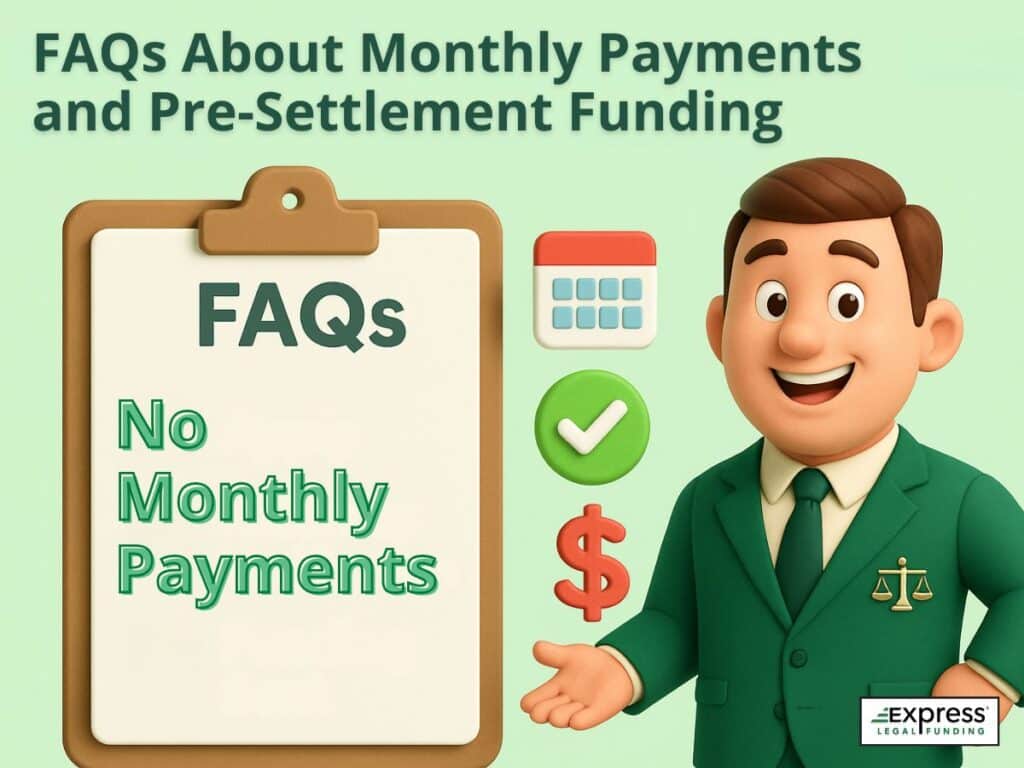
What Happens If My Case Is Unsuccessful?
Pre-settlement funding is non-recourse, which means you are not required to repay the settlement advance if your case is lost. There is no personal liability and no risk of owing money if you do not receive compensation. This makes legal funding a safer financial option during a lawsuit.
Is Pre-Settlement Funding a Loan?
No, pre-settlement funding is not a traditional loan. It is a non-recourse cash advance based on the potential value of your lawsuit. Unlike personal or payday loans, it is not classified as debt, and you are not required to make monthly payments or repay the funds out of pocket.
Instead, repayment is contingent on a successful outcome, meaning you only repay the advance if your case settles or you win. The repayment comes directly from your settlement proceeds. If you lose, you owe nothing.
This unique structure provides financial relief without the burden of traditional loan obligations, making it a risk-free option frequently used by personal injury plaintiffs who need help covering living expenses, medical costs, and lost wages while their cases are still pending.
Read our step-by-step guide on getting a pre-settlement advance while your lawsuit is pending: Can I Get a Loan on a Pending Lawsuit?
Is a Credit Check Required for Pre-Settlement Funding?
No, credit checks are typically not required for pre-settlement funding. Approval is based on the strength of your case—not your credit history—making this type of legal funding accessible to plaintiffs with poor credit. This provides critical financial relief during a lawsuit, even for those facing financial hardship.
How Is My Pre-Settlement Funding Amount Calculated?
The amount of pre-settlement funding you can receive depends on the expected value of your case and the risk involved. Key factors include the strength of your legal claim, the severity of your injuries, available insurance coverage, and how likely you are to win or settle successfully.
How Long Does Pre-Settlement Funding Take to Arrive?
Pre-settlement funding is typically available within 24 to 48 hours after your application is approved.
Here’s a typical timeline:
- Apply: Submit a short application online or over the phone.
- Attorney Verification: The funding company contacts your lawyer to confirm case details.
- Case Review: Underwriters evaluate your case’s strength and estimated value.
- Funding Sent: Once approved, funds are usually sent via direct deposit or e-check the same day.
What Can I Use Pre-Settlement Funds For?
Pre-settlement funds offer flexibility and can be used for various urgent personal expenses, including:
- Medical Bills: Covering treatment costs and healthcare needs.
- Living Expenses: Paying for rent, mortgage, utilities, and groceries.
- Transportation: Managing travel costs related to your case or daily needs.
- Childcare: Ensuring care for children while you focus on your legal proceedings.
This flexibility allows you to address immediate financial needs without restrictions, providing peace of mind during the legal process.
What Are the Fees Associated with Pre-Settlement Funding?
The fees and rates for pre-settlement funding vary depending on the provider.
Some companies charge a flat fee, while others use compound interest that increases over time. Because of these differences, it's essential to review your contract carefully.
A reputable legal funding company will clearly disclose all costs upfront. There should be no hidden fees. Make sure you fully understand how the fees work and how much you may owe if your case takes months or even years to settle. Transparency and clarity in the terms help protect your settlement and avoid surprises later.
Will My Attorney or the Defendant Know About My Funding?
Your attorney will be involved in the legal funding process, but the defendant is typically not made aware of your pre-settlement funding.
The funding company will contact your attorney to verify key case details and assist with the approval process. While attorney consent and participation are required, your funding agreement is generally kept confidential and does not need to be shared with the opposing party.
Disclosure is only necessary in rare cases if ordered by the court, meaning your legal strategy and settlement negotiations are usually unaffected.
For a deeper look at attorney involvement in legal funding, read: Do I Need a Lawyer to Get Legal Funding?
Key Takeaways About Monthly Payments and Legal Funding

- No monthly payments
- Repay only if you win
- No credit check required
- Use funds however you need
- Fast access to cash
Ready to Apply for Pre-Settlement Funding?
Express Legal Funding offers fast, risk-free financial support with no monthly payments required. Get the cash you need now, so you can focus on your recovery while your lawyer fights for a fair settlement.
Apply Today:
- Phone: (888) 232-9223
- Apply Now – Complete our quick and easy application form to get started.
Most clients receive funding in as little as 24 hours after approval. There are no upfront fees, no credit checks, and no repayment unless you win.
Legal funding is a non-recourse cash advance that allows plaintiffs with pending legal claims to access part of their expected settlement or court award before the case is resolved. Repayment is only required if the plaintiff wins or settles, making it a risk-free financial solution during litigation.
Legal funding is a non-recourse cash advance that allows plaintiffs involved in lawsuits to access part of their expected settlement before the case resolves, with no repayment obligations if the case is lost.
Unlike traditional loans, legal funding places a monetary lien on the case itself rather than on the plaintiff, making it a beneficial option for individuals with bad credit.
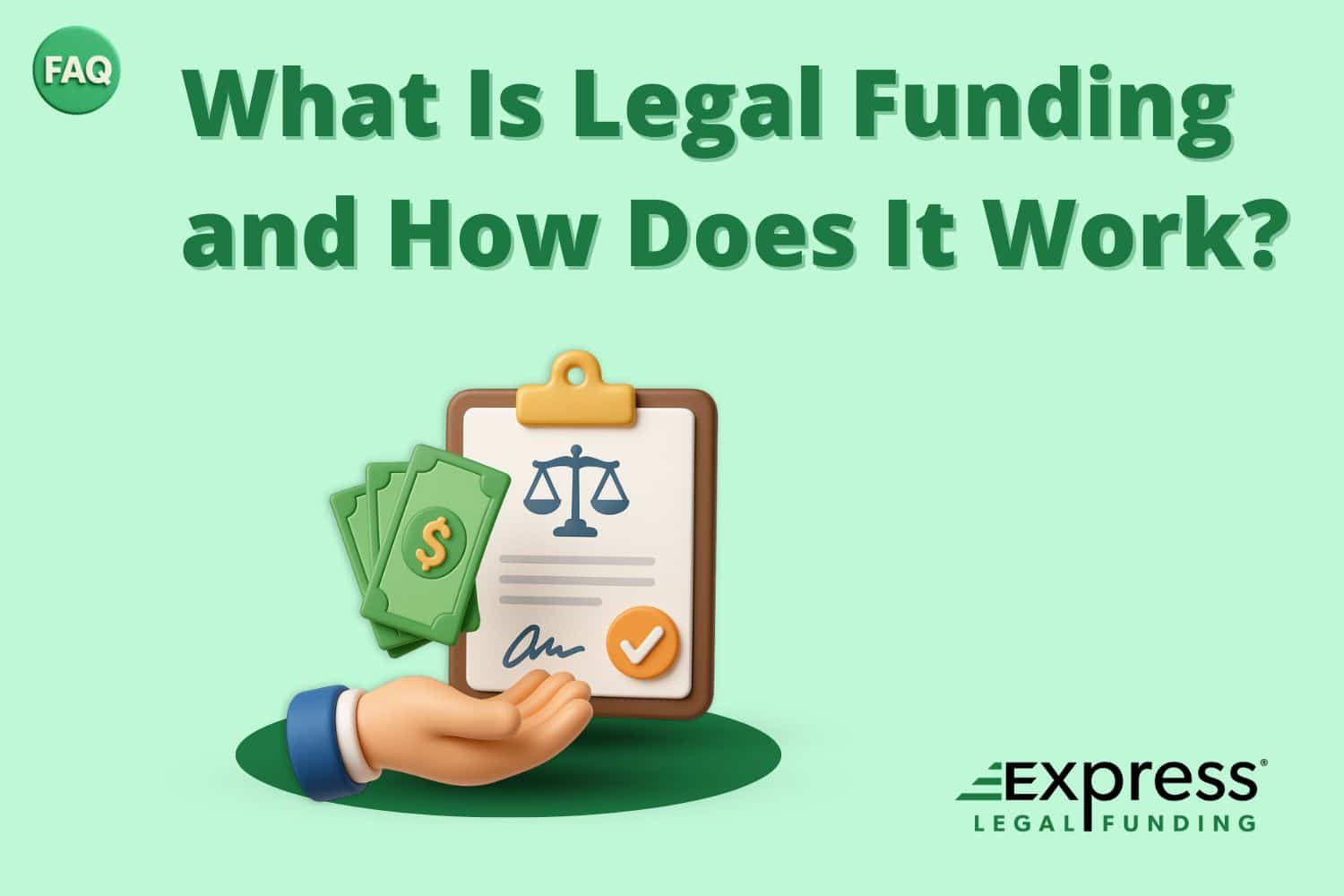
Express Legal Funding is a trusted provider of pre-settlement funding, ensuring plaintiffs don’t repay unless they win. In this guide, we explain how legal funding works, who qualifies, and what to expect, empowering you to make informed financial decisions during litigation.
What Is Legal Funding and Who Is It For?
Legal funding (also known as pre-settlement funding, lawsuit loans, or legal cash advances) is a type of financial support provided to plaintiffs during an active lawsuit. It gives injured or wronged individuals immediate cash to cover essential expenses—like rent, groceries, or medical bills—while they wait for a fair settlement.
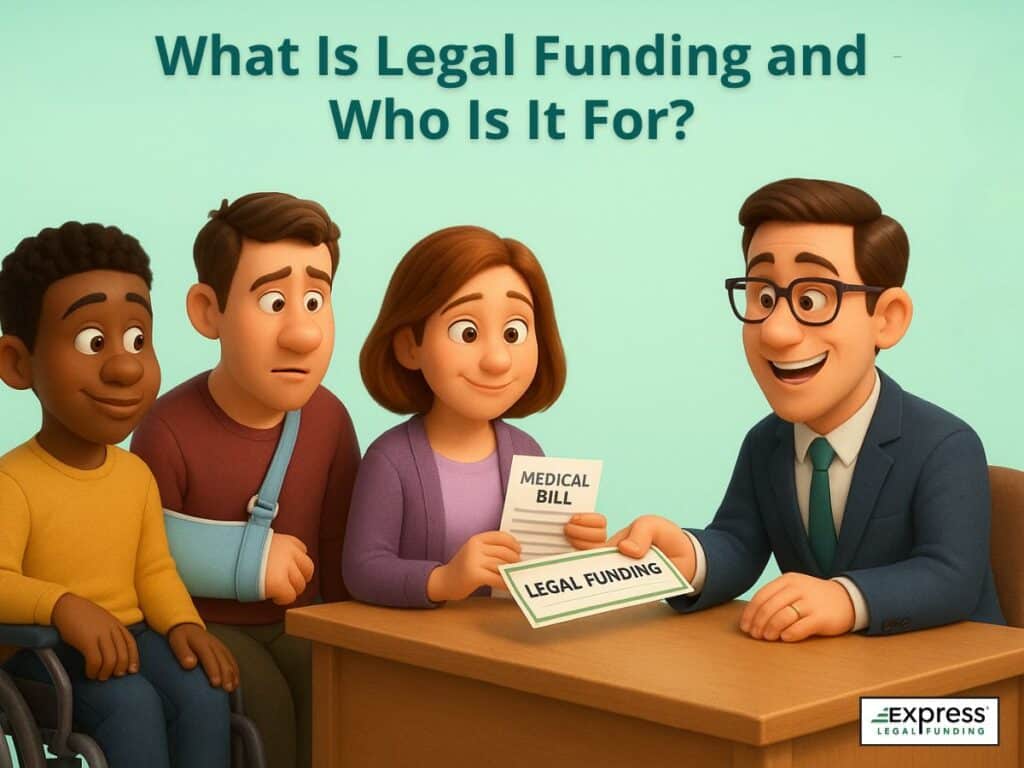
Non-loan Legal Financing
Unlike traditional loans, pre-settlement funding is:
- Non-recourse: You only repay if you win.
- Based on case strength: Not your credit score or employment history.
- Risk-free: If you lose, you owe nothing.
Other Common Names for Legal Funding
- Pre-settlement funding
- Lawsuit loans (often used inaccurately)
- Settlement cash advance
- Lawsuit advance
- Plaintiff funding
How Does Legal Funding Work Step-by-Step?
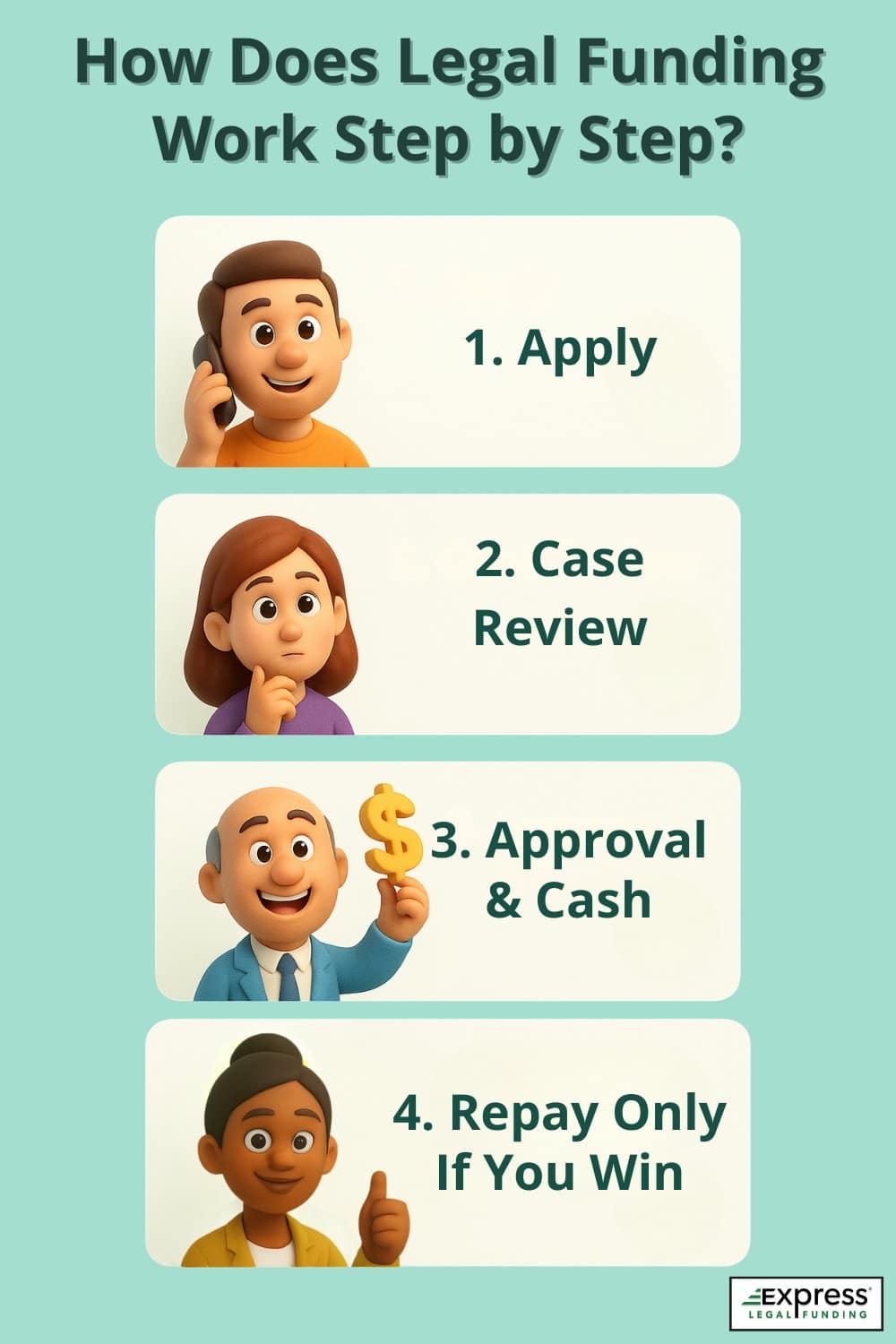
Legal funding is designed to be fast, risk-free, and easy for plaintiffs who need immediate financial relief while pursuing a lawsuit. Here’s how the process works:
Step 1: Apply Online or by Phone
Submit a simple application with basic details about your case, your injuries or claims, and your attorney’s contact information. There’s no credit check, employment verification, or upfront cost to apply.
Step 2: Case Evaluation by Legal Funding Company
Express Legal Funding reviews your case by speaking directly with your attorney. We assess the strength of your claim, liability, and potential settlement value to determine funding eligibility. This review is based entirely on the merits of your lawsuit, not your financial background.
Step 3: Fast Approval and Cash Advance Disbursement
If approved, you’ll receive a pre-settlement advance agreement to review and sign. Once completed, you can receive your cash advance within 24 to 48 hours—often the same day. Funding amounts typically range from $500 to $500,000, depending on your case.
Step 4: Repayment Only If You Win or Settle
There are no monthly payments on legal funding. Repayment is made directly from your future settlement or court award. If you lose your case, you owe nothing—because lawsuit advances are non-recourse, meaning there is no personal liability or obligation to repay.
🟢 Ready to apply for fast, affordable pre-settlement funding from a trusted industry leader?
Apply now with Express Legal Funding and get the cash you need—risk-free.
What Is a Non-Recourse Purchase Agreement?
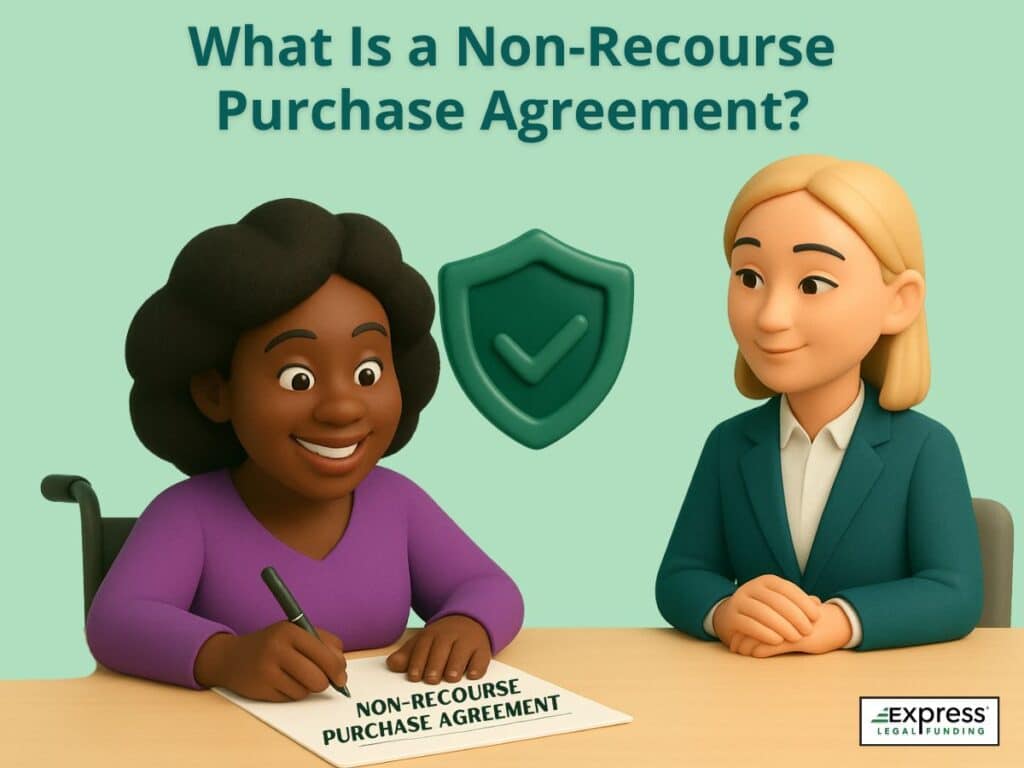
A non-recourse purchase agreement is the legal contract that makes pre-settlement legal funding possible. Instead of giving you a loan, the funding company purchases a portion of your future settlement or judgment, meaning you only repay if you win or settle your case.
If your case is unsuccessful, you owe nothing back, and the company absorbs the loss. This non-recourse structure protects plaintiffs from debt during an already financially stressful time and is what separates lawsuit settlement funding from traditional personal loans.
Key Features of a Non-Recourse Legal Funding Agreement:
- No Personal Liability: You’re never required to repay out of pocket—even if you lose.
- No Credit Checks: Your credit score is never affected or pulled.
- Risk-Free for Plaintiffs: The financial risk is fully shifted to the pre-settlement funding provider.
- Payment Comes from Your Settlement: Repayment for the lawsuit cash advance is required only if your case wins or settles.
This structure allows plaintiffs to pursue fair compensation without being pressured into early settlements just to cover living expenses.
How to Qualify for Legal Funding?
Legal funding is available to plaintiffs with pending lawsuits who need financial support before their case settles. Approval depends on the strength of your legal claim, not your credit score or income.
To qualify for legal funding, you must:
- Have a valid, pending lawsuit: Most commonly, personal injury claims such as car accidents, slip and fall cases, medical malpractice, wrongful death, or civil rights violations.
- Be represented by a licensed attorney: Your lawyer must be working on a contingency fee basis and willing to cooperate with the funding process.
- Have a strong case with merit: Your claim must have a high chance of settling or winning, with clear liability and damages that support a future payout.
Unlike traditional loans, legal funding does not require a credit check, proof of employment, or personal collateral. If your case qualifies, you can receive a non-recourse cash advance and owe nothing back if you lose.
What Role Does My Attorney Play in Legal Funding?
Your attorney plays a crucial role in the legal funding approval process, serving as both a case verifier and a liaison between you and the funding company.
Key responsibilities of your attorney include:
- Providing essential case documents: Your attorney shares case details, medical records, and legal filings to help the funder evaluate the strength of your claim.
- Reviewing and signing the funding agreement: Your attorney must review and sign the contract to confirm that the terms are fair and legally compliant and to accept responsibility for disbursing repayment from your settlement once the case concludes.
- Coordinating repayment after settlement: Once your case settles, your attorney works directly with the provider to repay the advance from the case proceeds.
Learn how your attorney plays a key role in the legal funding process in our guide: Do I Need a Lawyer to Get Legal Funding?
Important Fact: Legal funding cannot move forward without your lawyer's active cooperation. You must have a lawyer who is willing to share case details and sign the funding agreement for your application to be approved.
This collaboration ensures the funding process is smooth, transparent, and aligned with your best legal interests.
What Are the Benefits of Getting Legal Funding?
Legal funding offers plaintiffs critical financial support while their lawsuit is still pending, without adding personal financial risk or monthly debt.
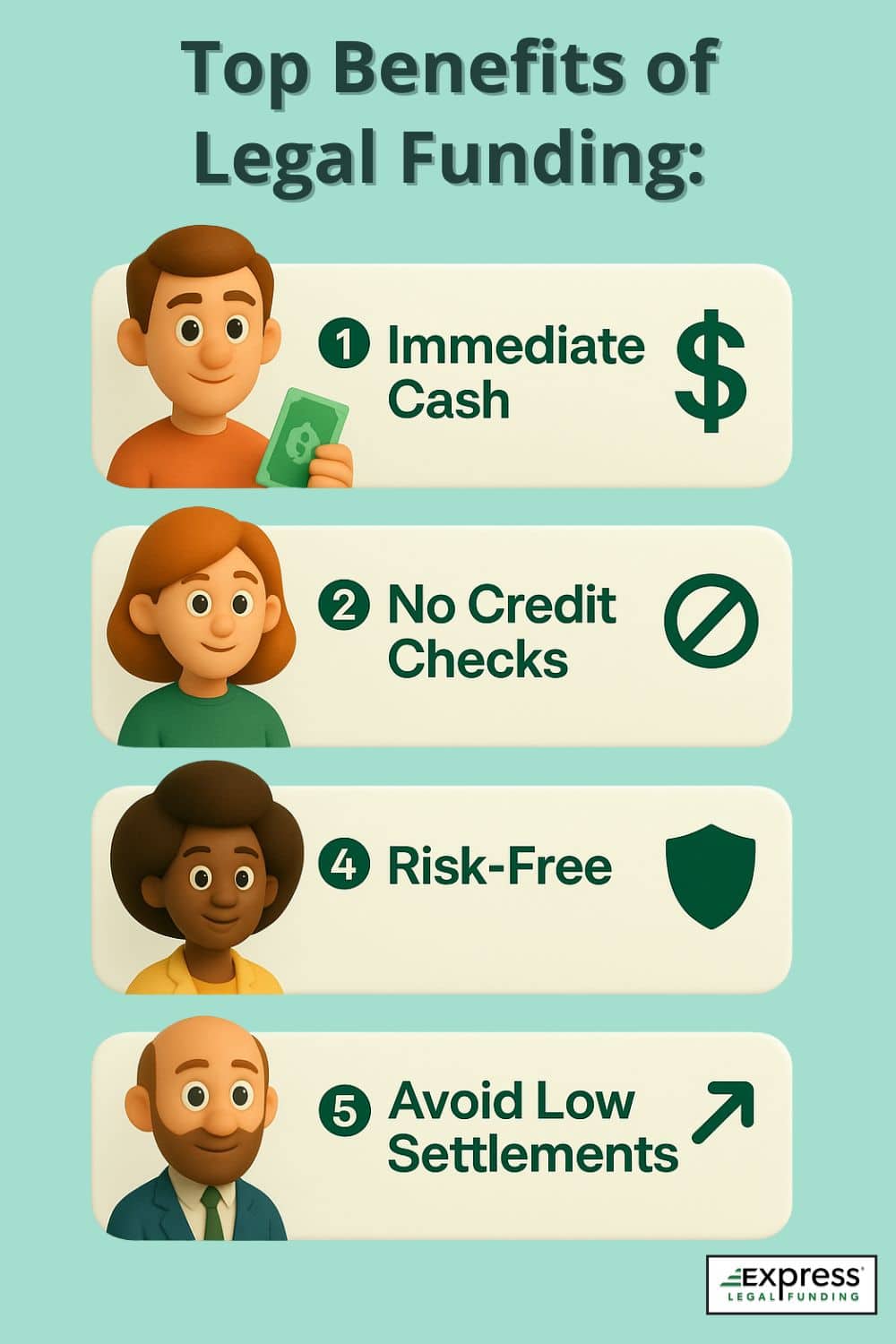
Top Benefits of Legal Funding:
- Immediate cash when you need it most: Use funds to cover rent, medical bills, groceries, or other urgent living expenses during your case.
- No credit checks or monthly payments: Approval is based on your case, not your credit score, income, or employment status.
- Zero risk if you lose: Legal funding is non-recourse, so you owe nothing if your case doesn’t settle or win.
- Reduces pressure to settle early: Financial relief gives your attorney time to fight for the full value of your claim instead of accepting a lowball settlement.
- Peace of mind during stressful litigation: Focus on recovery and legal strategy while your immediate financial needs are covered.
What Are the Drawbacks of Legal Funding?
Legal funding provides fast, risk-free financial relief, but like any financial tool, it comes with trade-offs that plaintiffs should carefully consider before applying.
Potential Drawbacks to Keep in Mind:
- Reduces your final settlement payout: Legal funding is repaid from your case proceeds. The more you borrow, the less you’ll keep after attorney fees and other costs are deducted.
- Costs can increase over time: Legal funding agreements have interest. The longer your case takes to resolve, the more you may owe.
- A good credit score won’t lower your rate or improve approval chances: Legal funding is based solely on your case strength, not your creditworthiness.
- Approval is not guaranteed: Cases with unclear liability, minimal damages, or poor documentation may not qualify for funding.
Pro Tip: Always have your attorney review the funding agreement and make sure you understand all terms before accepting an offer.
Explore this relevant guide about the benefits and drawbacks of legal funding: What Are the Pros and Cons of Pre-Settlement Funding?
What Types of Cases Qualify for Legal Funding?
Legal funding is available for a wide range of civil lawsuits, especially those with strong liability and the potential for a monetary settlement. The most common qualifying case types include:
- Car accidents and personal injury claims – Including motorcycle, truck, pedestrian, and rideshare accidents.
- Slip and fall (premises liability) – Injuries caused by hazardous property conditions or negligent maintenance.
- Medical malpractice – Cases involving surgical errors, misdiagnosis, or negligent care by healthcare providers.
- Workplace or construction accidents – When third-party negligence causes injury on the job.
- Wrongful death claims – Filed by surviving family members seeking compensation after a preventable fatality.
- Employment discrimination or retaliation – Including wrongful termination, harassment, and wage disputes.
- Product liability or defective medical device lawsuits – Claims against manufacturers for dangerous or faulty products.
Frequently Asked Questions About Legal Funding (Answered by Industry Experts)
Is legal funding a loan?
No. Legal funding is not a loan; it's a non-recourse cash advance tied to your lawsuit. You only repay if you win or settle your case, and you owe nothing if you lose.
How much legal funding can I receive?
The amount of legal funding most plaintiffs qualify for is 10% to 20% of their anticipated settlement value. At Express Legal Funding, advances range from $500 to $500,000, depending on your case strength.
How fast can I get legal funding?
If your attorney responds quickly, you may receive funding within 24 to 48 hours of applying. Express Legal Funding uses a streamlined process to ensure fast approvals.
Do I need my attorney’s approval?
Yes. Your attorney must review and sign the funding agreement for your application to proceed. Legal funding cannot be finalized without your lawyer’s cooperation.
Learn more in our detailed guide: Can I Get Pre-Settlement Funding Without Attorney Consent?
What happens if I lose my case?
You owe nothing. Because lawsuit cash advances are non-recourse, you keep the money with no repayment required if your case is unsuccessful.
Is Legal Funding Taxable Income?
No, legal funding is generally not considered taxable income. Because of its non-recourse structure, the IRS does not count it as part of your gross income, so you typically don’t need to report it on your tax return.
Learn more about the taxation status of legal funding in our guide: Do I Have to Pay Taxes on Pre-Settlement Legal Funding?
Is Legal Funding Safe and Regulated?
Yes—legal funding is safe when provided by a reputable company like Express Legal Funding. We prioritize transparency, consumer protection, and full compliance with all applicable laws.
Here’s what makes our legal funding safe:
- Clear, easy-to-read contracts with no hidden terms
- Transparent pricing—no confusing interest structures or heavily compounding interest
- No upfront fees or surprise charges
- 100% non-recourse funding—you only repay if you win
- Compliance with state-specific pre-settlement funding regulations
Plaintiff financing is largely regulated at the state level, and rules vary by jurisdiction. These may include requirements for disclosures, fee caps, and attorney involvement.
At Express Legal Funding, we not only meet but often exceed these standards, advocating for stronger legal protections for plaintiffs nationwide.
Why Plaintiffs Choose and Trust Express Legal Funding
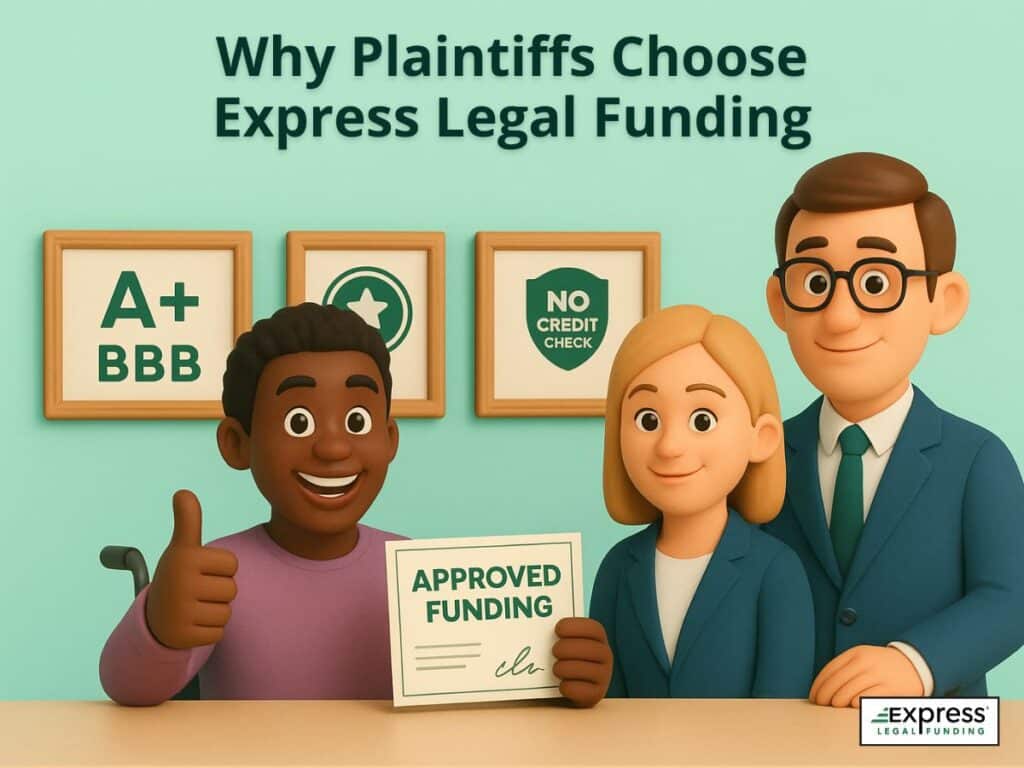
Express Legal Funding stands out as a trusted, plaintiff-first provider of risk-free settlement advances. Here’s why thousands of injured claimants choose us:
- Direct Funder (Not a Broker): We fund cases in-house, so you get faster approvals, lower fees, and more money in your pocket.
- Zero Risk If You Lose: Our guaranteed pre-settlement funding is 100% non-recourse—no repayment is required unless you win or settle.
- No Credit Checks or Upfront Fees: Approval is based solely on your case, not your credit or income.
- Transparent Terms: Our easy-to-read contracts include flat pricing and no hidden fees or heavily compounding interest.
- Top-Rated and Trusted: We’re proud to have an A+ rating with the Better Business Bureau and a track record of helping plaintiffs across the country.
How to Apply for Legal Funding Today
If you're struggling financially while your lawsuit is pending, Express Legal Funding can help you access fast, risk-free cash without any upfront costs or credit checks. Applying is quick, confidential, and entirely obligation-free.
Here’s how to get started:
- Step 1: Call us or apply online in just minutes
- Step 2: We’ll review your case with your attorney
- Step 3: If approved, receive funding in as little as 24 hours
You only repay if you win or settle—otherwise, you owe nothing.
📞 Call us now at (888) 232-9223 or apply online to see how much you qualify for.
Learn More About Legal Funding From These Helpful Resources
Pre-settlement legal funding typically costs 2% to 4% per month. The total repayment depends on the case type, duration, and whether the interest is simple or compounding. Choosing a provider with capped rates and transparent terms, like Express Legal Funding, can help reduce costs and protect more of your settlement.
Waiting for a legal settlement can take months—or even years. That’s why many people turn to legal funding, also known as lawsuit loans, to help pay bills while their case is ongoing. But one of the first questions they ask is:
“How Much Will Pre-Settlement Legal Funding Cost Me?”
The exact cost of legal funding depends on several factors, including the provider you choose, the details of your case, and how long it takes to reach a settlement.
This guide breaks down typical legal funding rates, explains how repayment works, and shows you how to avoid hidden fees and paying too much.
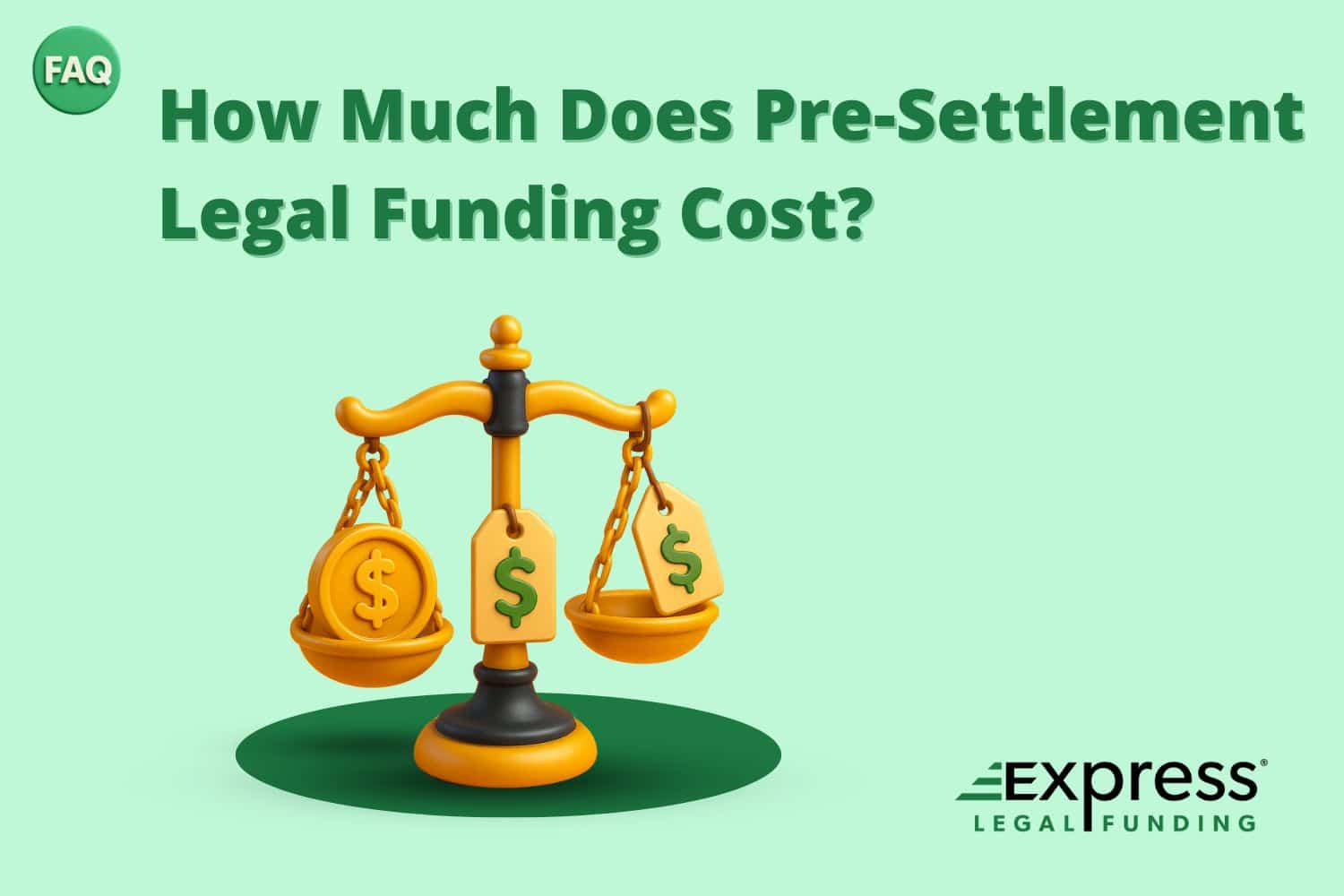
Disclaimer: All rates, fees, and repayment examples provided are for illustrative purposes only and do not constitute a guarantee, offer, or commitment to fund. Actual terms may vary based on individual case details, applicable state laws, and underwriting approval.
Please review your agreement carefully before accepting any funding.
What Is Legal Funding?
Legal funding is a cash advance provided to plaintiffs with active legal claims. It is not a traditional loan. Instead, it’s classified as non-recourse funding, which means:
- You only repay the advance if you win or settle your case.
- If you lose, you owe nothing—there is no personal liability.
- Approval is based on the strength of your case, not your credit score or employment history.
Legal funding helps plaintiffs cover essential living expenses during long legal battles without taking on personal debt.
Types of Legal Funding
The most common types of legal funding include:
- Pre-settlement funding: Given while your case is still open.
- Post-settlement funding: Offered after your case is won but before the payout is received.
- Medical lien funding: Pays medical bills upfront in exchange for repayment from your settlement.
How Legal Funding Costs Are Calculated
The cost of legal funding isn't one-size-fits-all. Funding companies evaluate several factors to determine your rates and repayment terms. Understanding what drives these costs can help you compare offers and avoid overpaying.
Here are the main factors that influence how much legal funding will cost:
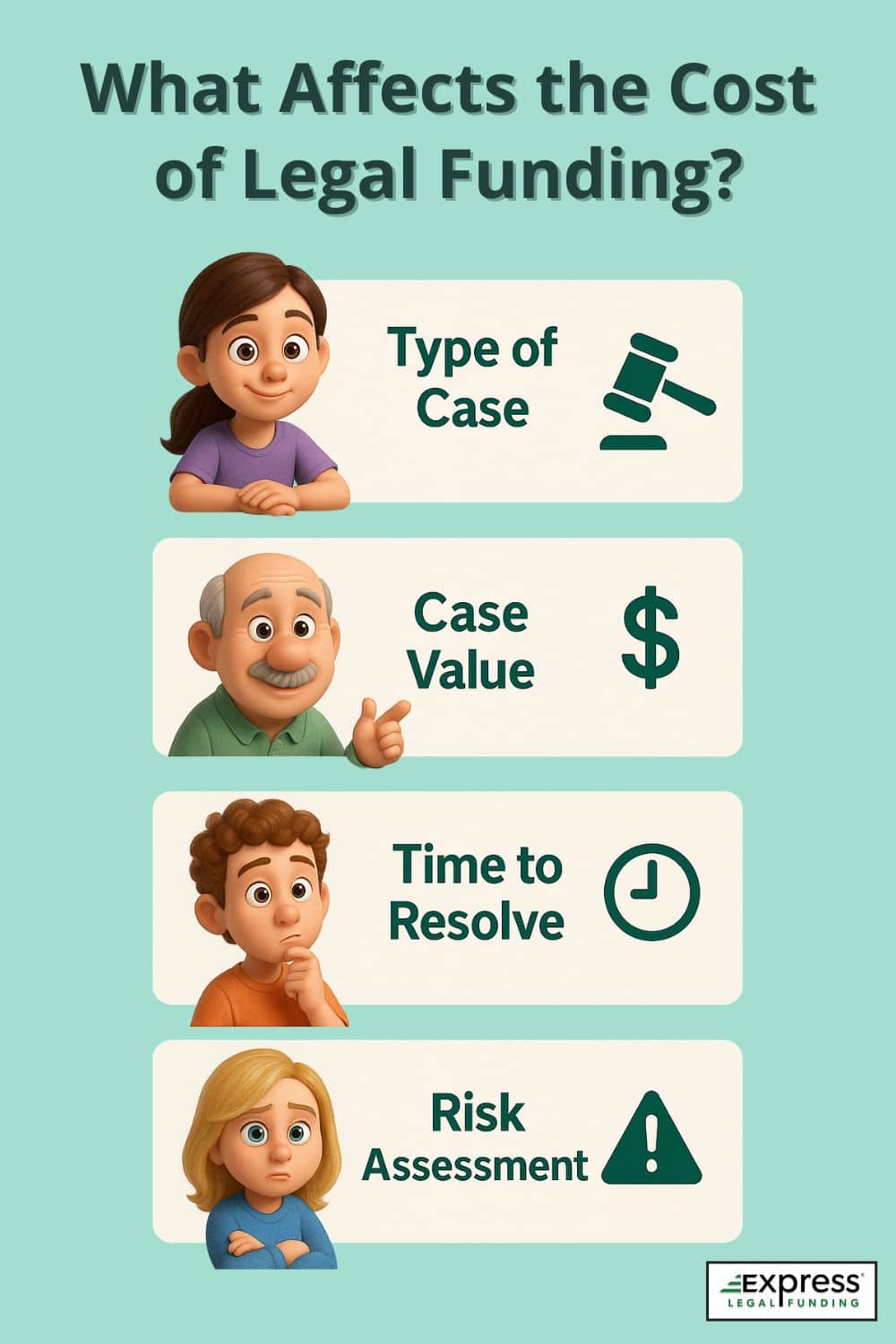
1. Type of Case
Not all cases carry the same risk. Common examples include:
- Car accidents with clear liability may receive lower rates.
- Medical malpractice or product liability cases often involve more uncertainty and higher costs.
The more predictable the case outcome, the more favorable the pricing may be.
2. Estimated Case Value
Larger expected settlements usually qualify for higher funding amounts. However:
- Higher case value can reduce perceived risk, lowering your rate.
- But higher funding requests may result in larger total repayment amounts over time.
3. Time Until Case Resolution
Legal funding accrues costs over time, so the longer your case takes to settle, the more fees and interest can accumulate, especially if compounding interest is involved.
Tip: Choose a trustworthy legal funding provider with non-compounding interest and capped repayment terms to reduce long-term costs.
4. Risk Assessment
Funding is non-recourse, meaning you don’t repay unless you win. So, the more risk your case presents, the more a provider may charge to offset that risk.
Factors that raise the risk include:
- Unclear liability
- Incomplete medical records
- Delayed or disputed treatment
Legal funding companies use different ways to charge for their services. Some charge monthly interest, while others use flat fees. The next section explains how each method works and how it affects what you’ll pay back.
What Fees Do Pre-Settlement Funding Companies Charge?
Pre-settlement funding companies often apply a range of fees when offering cash advances on pending lawsuits, and these charges can vary widely depending on the provider and case specifics. Common fee types include:
- Monthly interest rates: Typically 2% to 4%, charged as simple or compounding interest
- Application or processing fees: Sometimes deducted from the upfront advance
- Underwriting or administrative costs: Additional fees for reviewing the case
- Broker markups: Extra charges if the provider uses a third-party broker instead of direct funding
Explore the Guide: Legal Funding Brokers vs. Lawsuit Loan Companies - Learn the differences
Tip: Always ask whether fees are deducted from your advance and if there's a cap on total interest to avoid paying more than expected.
[ninja_tables id="22291"]Why Choose Express Legal Funding Instead of Other Companies?
- No Upfront or Hidden Fees: Transparent terms with zero surprise charges.
- Capped Fees: Fees are capped to help protect your settlement.
- Free Delivery of Funds: No extra charge to receive your money.
- Free, No-Obligation Case Review: Fast approval process without any risk.
- 100% Risk-Free Guarantee: You only repay if you win or settle your case—no win, no repayment.
Simple vs. Compound Interest Rates: What It Means for You
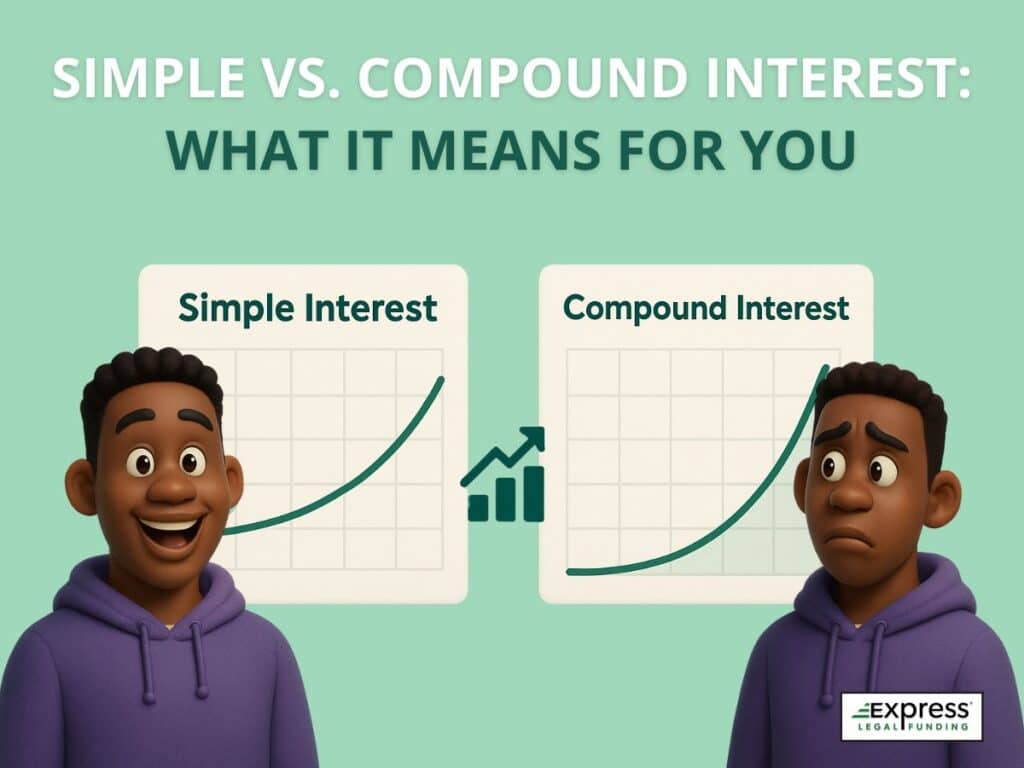
Simple Interest:
- Based only on the amount you borrow.
- Easier to predict.
- Lower total repayment.
Compound Interest:
- Interest is charged on both the amount you borrowed and the interest already added.
- Costs grow faster the longer your case takes.
- Can double or triple your repayment.
Express Legal Funding only uses low interest rates with optional caps to protect your settlement.
Examples: How Much You Might Repay for the Cost of Pre-Settlement Funding
Here are real-world examples to show how much legal funding can cost depending on the provider:
[ninja_tables id="22292"]What This Means:
Even a small monthly compounding interest rate (3%) can double or triple the total repayment amount if your case takes a year or more to resolve. That’s why it's crucial to ask about:
- Whether the rate is compounding or flat
- Whether there’s a cap on total repayment
Why Simple Interest Matters:
- Simple interest is calculated only on the original funding amount, not on the interest that’s already added.
- This keeps your repayment amount predictable and fair, especially for longer cases.
Real Example: How Much Did Emily Repay on Her Legal Funding?
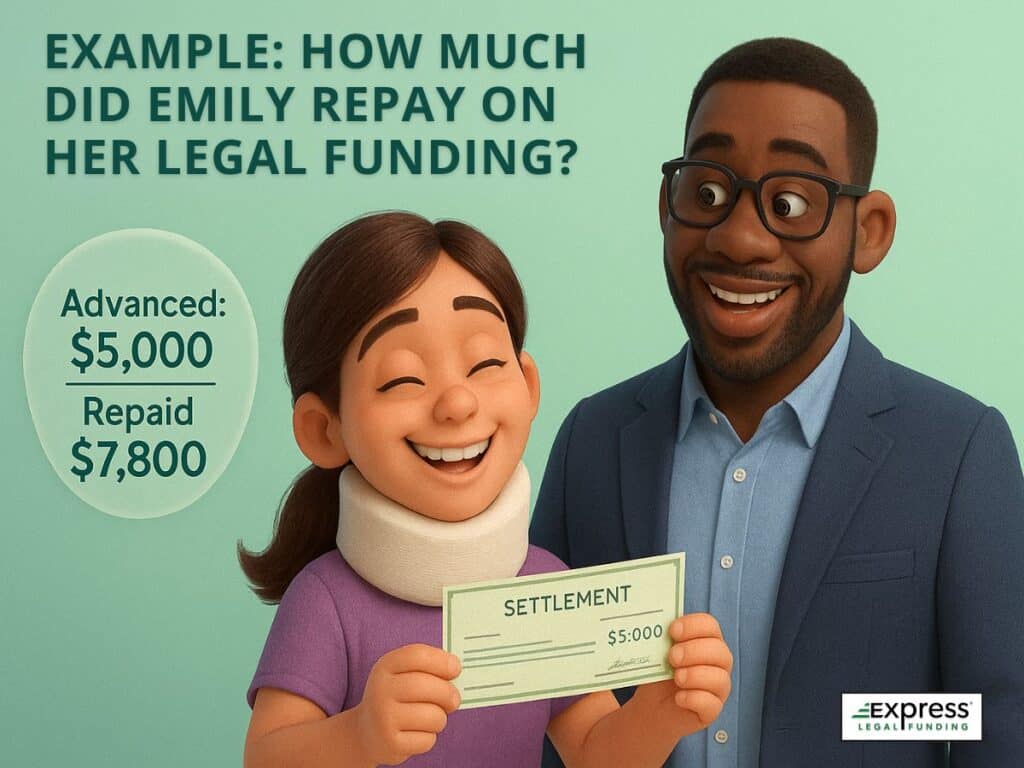
Emily was injured in a rear-end car accident and couldn’t work while waiting for her case to settle. She applied for legal funding to help cover her rent and groceries.
- Settlement Advance Amount: $5,000
- Repayment Type: Simple interest (3% monthly, capped after 24 months)
- Case Duration: 18 months
When Emily’s case finally settled, her attorney paid back $7,800 from her settlement, covering the original funding amount and interest. Thanks to the company’s non-compounding and capped fee model, she avoided the ballooning costs that many other providers would have charged.
💡 Had she chosen a provider using monthly compounding interest, her repayment could have exceeded $9,000.
Are There Upfront or Hidden Fees?
Yes, some pre-settlement funding companies add extra fees that aren’t always obvious at first. These hidden costs can significantly increase your total repayment, sometimes by hundreds or even thousands of dollars.
Common hidden or upfront fees may include:
- Application or processing fees
- Underwriting or administrative fees
- Broker markups (especially if the provider is not a direct funder)
- “Compliance” or “setup” charges
- Servicing and maintenance fees
- Electronic document storage fees
Tip: Always request a clear breakdown of all fees before signing. Look for companies that offer transparent, no-fee funding, like Express Legal Funding.
Watch Out for Upfront Deductions
Some legal funding companies may deduct fees directly from your advance, meaning you receive less money upfront than what you were approved for. Worse, you may still be charged interest on the full funded amount, including the portion you never actually received.
These upfront deductions can include:
- Application fees
- Processing or underwriting fees
- Broker or referral markups
- Delivery fees
Tip: Always ask whether the advance amount listed is net or gross and whether any fees are taken out before the funds are disbursed.
Are There Any Hidden Fees with Express Legal Funding?
No, there are absolutely no hidden fees with Express Legal Funding. Transparency is one of the core principles that sets us apart and is widely recognized by both clients and attorneys.
Express Legal Funding has no upfront fees or hidden costs. Every term is clearly explained in your agreement before you sign—there are no application fees, no surprise charges, and no out-of-pocket costs. You only pay if you win your case, and because our pre-settlement funding is non-recourse, you owe nothing if you lose.
How Does Repayment Work for Legal Funding?
Repayment is simple. Here’s how it works:
- Your case settles.
- Your lawyer receives the settlement check.
- The funding amount + agreed fees and interest are repaid from the settlement to the legal funding company.
- You get the rest of the money.
Legal funding has no monthly payments, no credit reporting, and no debt collection. If you lose your case, you owe nothing.
Can I Estimate My Legal Funding Cost?
Yes, you can estimate potential costs using a legal funding calculator or by reviewing a sample repayment table like the one below.
Please note: these examples are for illustration purposes only and do not represent an offer or pricing from Express Legal Funding. Actual rates, funding amounts, and eligibility are determined on a case-by-case basis and may vary depending on your case details and applicable state laws.
[ninja_tables id="22294"]This helps you:
- Understand how long-term cases affect repayment
- Compare offers from different companies
- Avoid overpaying for short-term cash relief
Want a free cost estimate for your legal funding? Contact us, and we’ll show you exactly what you’ll owe—before you commit.
What to Look for in a Legal Funding Company
Not all lawsuit funding companies are created equal. Here’s what to check:
- Transparent contracts
- Low interest rates
- No hidden fees
- Capped repayment options
- Direct funding (not a broker)
- Attorney-friendly process
Watch out for:
- Complex or unclear terms
- Pushy salespeople
- Promises of “guaranteed funding” with no case review
- Unregulated or offshore companies
Risks to Consider
While legal funding offers financial relief, it’s important to understand the trade-offs:
Risks:
- Less money left after your case settles
- High rates from some providers
- Longer cases can cost more if there’s no fee cap
How to Minimize Risk:
- Only borrow what you need
- Read the contract closely
- Ask about caps and interest types
- Get your attorney’s input
Read our 2025 legal funding company comparison guide to find and choose the best pre-settlement funding provider for your needs.
How to Apply for Legal Funding
At Express Legal Funding, getting started is quick and free:
Legal Funding Process Steps
- Apply online or call us for a free review.
- We contact your attorney to confirm your case details.
- Our team reviews your case and makes an offer.
- You sign the contract.
- We send the money, often the same day your contract is signed.
There’s no cost to apply and no obligation to accept.
Final Thoughts: Is Legal Funding Worth the Cost?
Legal funding helps injured plaintiffs access the cash when they need it most. But it’s crucial to understand the costs and choose a trustworthy provider.
By working with Express Legal Funding, you can:
- Avoid excessive fees
- Get simple, capped pricing
- Non-recourse funding: Only pay if you win
Apply With Express Legal Funding Today
Get the financial help you need. Apply for legal funding online or call us at 888-232-9223 to speak with a team member today.
Still have questions? Contact us for a free, no-pressure quote and find out how much you qualify for.
No, you generally do not have to pay taxes on pre-settlement legal funding, especially in personal injury cases. It is treated as a non-recourse advance on your future settlement, meaning you only repay it if you win. Because it’s not considered income, the IRS does not include it in your gross income, and you don’t need to report it on your tax return. This makes pre-settlement funding a tax-free way to access money during a pending lawsuit.
FAQ: Do You Have to Pay Taxes on Pre-Settlement Legal Funding?
Pre-settlement funding, also known as a pending lawsuit loan or cash advance, is typically not treated as taxable income. Since it is structured as a non-recourse advance on your expected settlement, the Internal Revenue Service (IRS) does not include it in your gross income.
This means most plaintiffs do not need to report the funds on their tax return or pay taxes on the amount received.
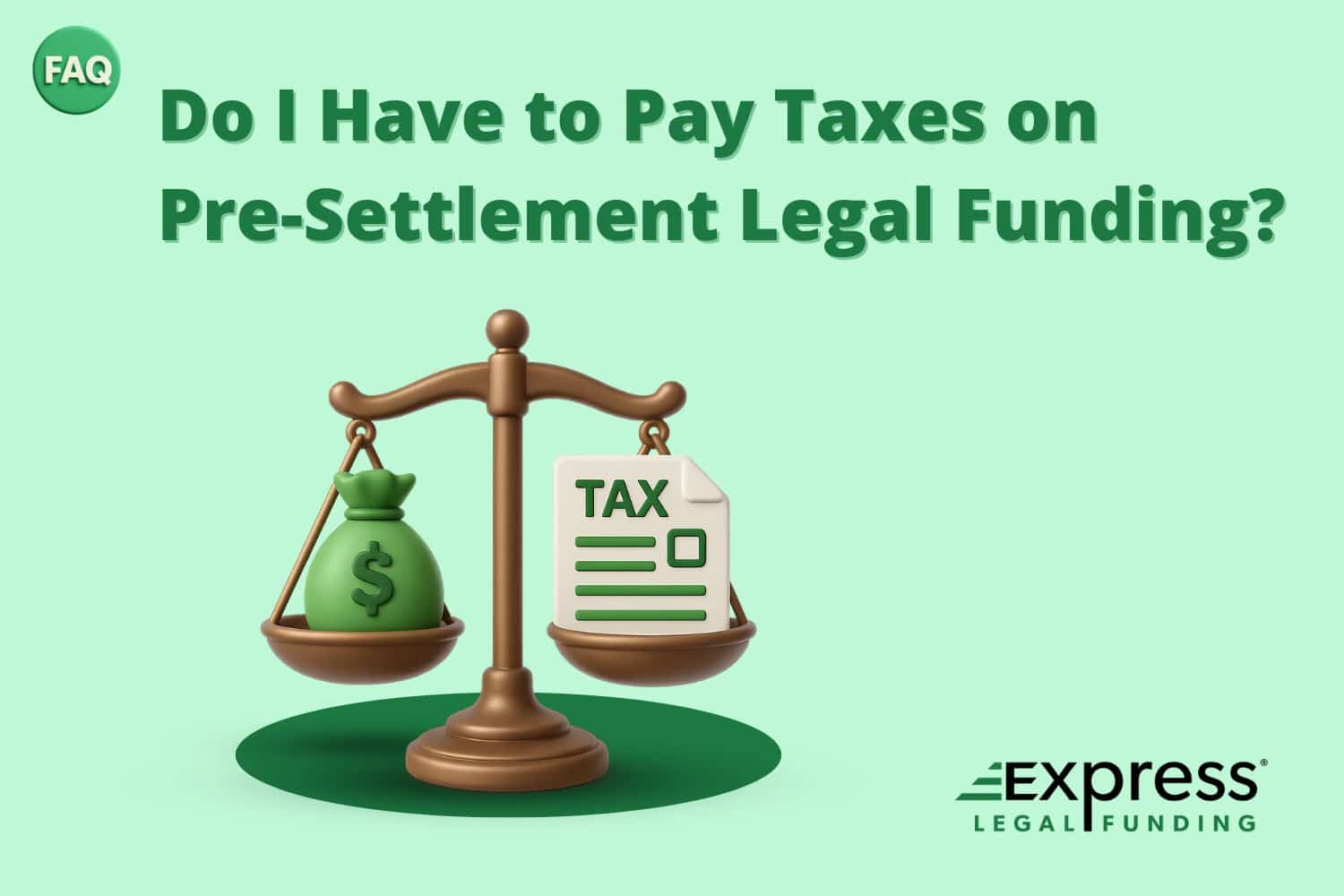
However, there are a few important exceptions and tax-related considerations to keep in mind.
The FAQs below offer a clear and comprehensive explanation of how pre-settlement funding is treated for tax purposes.
Is Pre-Settlement Funding Considered Taxable Income?
No. Pre-settlement funding is not considered taxable income because it’s structured as a non-recourse debt (loan) rather than earned income.
In other words, it’s money you’re borrowing against your expected settlement, which you’ll pay back if you win your case (with no obligation if you lose).

Since it’s not wages or payment for services, the IRS does not treat it as income to you.
- IRS Classification: The Internal Revenue Service classifies most lawsuit funding as “non-recourse” advances, meaning repayment depends on winning the case. This exemption keeps the funds tax-free for the plaintiff.
- No Income Reporting: Because it’s not income, you don’t report the funding on your tax return, and no income taxes are due on it.
Do I Need to Report Pre-Settlement Funding on My Tax Return?
Generally, no. Since pre-settlement funding is not taxable income, there is no requirement to report it on your federal tax return. When filing taxes, you do not list the lawsuit advance as income or as a loan. It stands apart from your taxable earnings for the year.
This holds true for both federal and typically state taxes as well (though state laws can vary, so consult a tax advisor if in doubt).
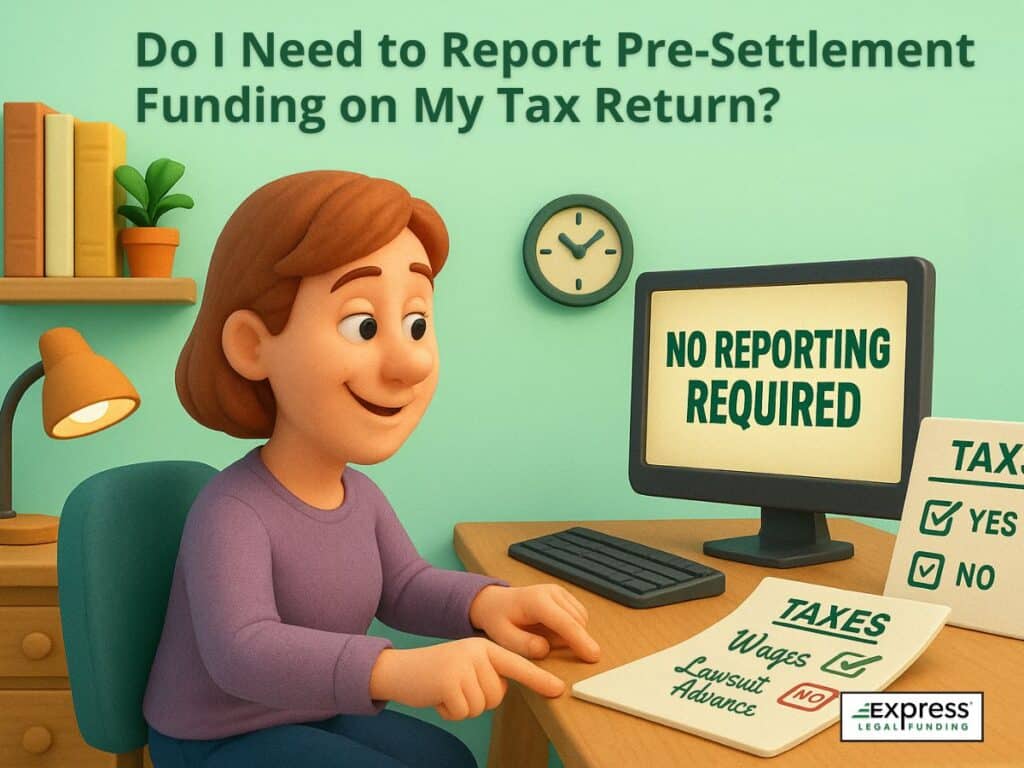
However, it’s wise to keep records of any legal funding transactions and consult your attorney or a tax professional for your specific situation.
In rare or complex cases (e.g., if your lawsuit is not a personal injury case), a tax advisor can confirm that no reporting is needed or guide you if any special circumstance applies.
But for a standard personal injury plaintiff, no tax forms and no reporting of the settlement advance are required.
Why Is Pre-Settlement Legal Funding Not Taxed?
Pre-settlement legal funding escapes taxation because of how it’s characterized under the law. It’s essentially a contingent loan/advance rather than income. Key reasons it’s not taxed include:
- Non-Recourse Advance: Pre-settlement funding agreements are non-recourse, meaning if you lose the case, you don’t have to repay the advance. This structure means the money isn’t guaranteed income or enrichment for you – it’s contingent on a future settlement. The IRS generally does not tax loan proceeds (since loans must be repaid), and because this advance functions like a loan against your settlement, it isn’t taxed.
- Not Wages or Earnings: The cash you receive is not payment for work, services, or product – it’s simply your own potential settlement money early. The IRS excludes from income any damages received for personal physical injuries (see IRC § 104(a)(2)). Since legal funding gives you a portion of those damages in advance, it carries the same tax-exempt status as the settlement itself (in personal injury cases).
- Nature of Personal Injury Settlements: If your case is a personal injury case, the underlying settlement (for physical injuries) is tax-free by law. The advance is drawn from that non-taxable settlement pool, so the advance itself is likewise tax-free to you.
In summary, lawsuit advances are viewed as temporary financial help (to be repaid from the settlement) and not as new income. This is why you don’t pay taxes on them in most instances.
Are Lawsuit Loans or Pre-Settlement Advances Taxable?
In most cases, no. Lawsuit loans and pre-settlement advances are not taxable in the U.S. Like pre-settlement funding, other forms of litigation funding or lawsuit loans follow the same principle: they are advances on expected recoveries, not earned money.
Thus, recipients are not taxed on the funds at the time of receipt. You won’t receive a 1099 for a lawsuit loan disbursement, and you don’t list it as income on your tax filings.
Even if you see terms like “loan” or “interest” in the agreement, remember this is a special non-recourse loan – no repayment if you lose, and repayment (if you win) comes out of the settlement itself. Because of this structure, the IRS does not treat it as taxable income or forgiveness of debt.
In contrast, a typical bank loan that gets forgiven could trigger cancellation-of-debt income tax, but a pre-settlement advance is different, since it’s contingent and tied to a legal claim outcome.
Important: The tax treatment can change after your case resolves (when you actually receive a settlement or judgment). The advance itself remains non-taxable, but any monetary award you win might have taxable components. The key point here is that the act of receiving a lawsuit loan or advance is not a taxable event.
Are Personal Injury Settlements Taxable (and Does That Affect the Advance)?
Most personal injury settlements are not taxable, which is why the advances on them are also tax-free. Under U.S. tax law (IRC Section 104), compensatory damages for physical injuries or physical sickness are excluded from taxable income.
For example, if you settle a bodily injury claim (like a car accident or slip-and-fall), the money for your medical bills, pain and suffering, property damage, lost wages due to physical injury, etc., is generally tax-free at the federal level.
Since pre-settlement funding in personal injury cases is drawn from these non-taxable damages, it inherits the same tax-free status.
Taxation of Legal Settlements and Judgments
However, some types of lawsuit payouts are taxable, and it’s useful for plaintiffs to know these differences (though they don’t change the upfront funding’s tax status):
- Punitive Damages: These awards are meant to punish the defendant for egregious misconduct and to deter similar future behavior. Unlike compensatory damages, punitive damages are taxable income to the plaintiff.
- Lost Wages / Employment Claims: If part of your lawsuit is compensation for lost wages or back pay, that portion is taxable – it replaces taxable salary.
- Emotional Distress (non-physical): Damages for emotional distress or mental anguish not caused by physical injury are taxable. If it’s linked to a physical injury, it may be non-taxable.
- Interest on Settlement: Any pre-judgment or post-judgment interest that accrues on your award is taxable.
- Non-Injury Claims: Settlements for non-physical claims (e.g., defamation) are typically taxable.
Example: Jane’s personal injury case settles for $100,000: $80,000 for physical injuries (tax-free), $20,000 for punitive damages (taxable). If Jane took a $10,000 lawsuit cash advance, that advance wasn’t taxed when received. She will repay it from her settlement, and only the $20,000 punitive portion is taxed.
Will Taking a Pre-Settlement Advance Affect How Much I Pay in Taxes on My Settlement?
Not directly. Taking pre-settlement funding does not change the tax treatment of your settlement – it simply reduces the net amount you receive at the end. You won’t owe any tax on the advance itself, but you still owe taxes on any taxable portion of your settlement.
You’re generally considered to have received the full settlement, even though some of it went to repay the funder. The IRS still taxes the full taxable portion.
However, since your final disbursement may be smaller after fees, your actual tax payment that year could be lower due to reduced income in hand, but the tax liability remains based on the original taxable settlement amount.
Relevant FAQ guide: How Much Does Pre-Settlement Legal Funding Cost?
What Happens if I Use My Pre-Settlement Funds for Investments or Non-Essential Purchases?

The advance itself remains non-taxable, but any profits or gains from investing the funds are taxable. For instance, if you invest your advance and make a profit, that gain is subject to normal capital gains or business income tax.
That said, experts recommend using the funds only for necessary living expenses to avoid unnecessary costs.
The IRS focuses on whether new income is generated, not where the money came from. So, while the advance isn't taxed, using it to create taxable income (like from an investment) will result in tax obligations.
If I Lose My Case, Do I Owe Taxes on the Pre-Settlement Funding I Received?
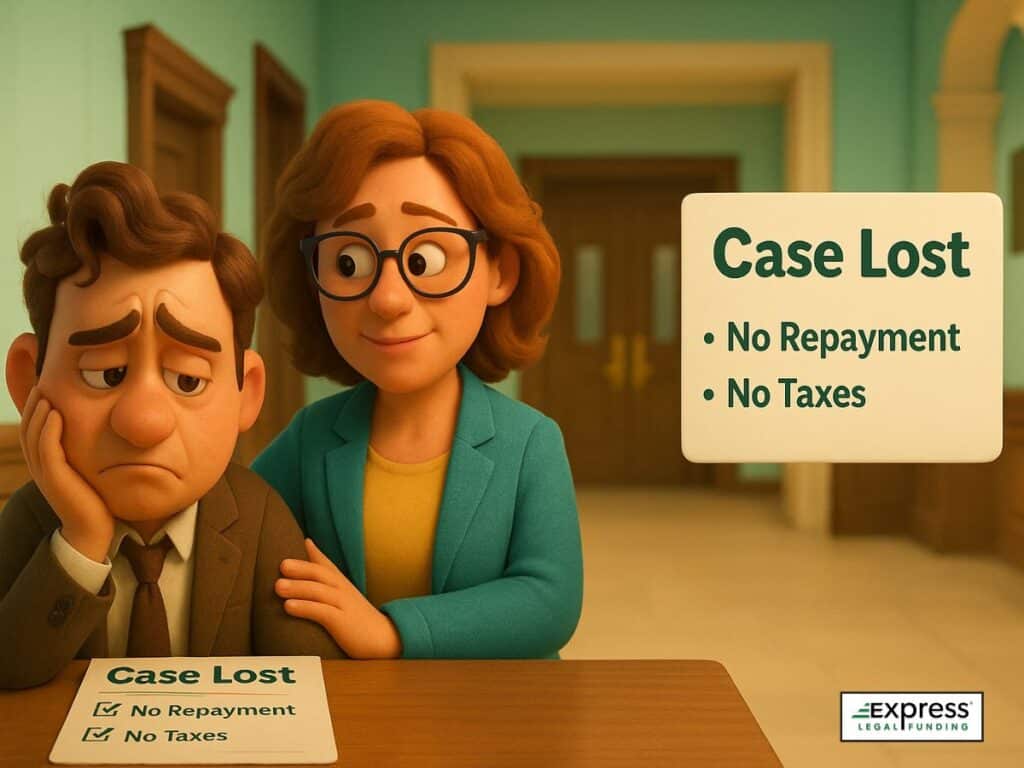
No. If you lose your case, you don’t repay the funding, and you don’t owe taxes on it either. Lawsuit advances are non-recourse, meaning the funding company assumes the risk. The IRS doesn’t consider these advances as income in the event of non-repayment.
Unlike typical forgiven loans, which can trigger cancellation-of-debt tax liability, lawsuit funding is structured to be contingent from the start. So, no 1099-C is issued, and no tax is due.
Will I Receive a 1099 or Tax Form for Pre-Settlement Funds?
No, not for the funding itself. Legal funding companies do not issue 1099s for advances because they aren’t wages or income. However, you might receive a 1099 for the settlement itself, particularly if it includes punitive damages, interest, or other taxable elements.
If your entire settlement is tax-free (e.g., for personal physical injury), no 1099 is typically issued. But if you receive one, consult your attorney or tax advisor to properly report any taxable portions.
Does Pre-Settlement Funding Affect My Credit or Financial Situation (Beyond Taxes)?
No, it doesn’t impact your credit score. Pre-settlement funding is not reported to credit bureaus and does not require a credit check. Because it’s non-recourse and tied to your lawsuit, it doesn’t appear on your credit report or affect your score even if you lose your case.
Need Fast Pre-Settlement Funding? Apply Today with Express Legal Funding
Waiting on your lawsuit shouldn’t mean falling behind on bills. At Express Legal Funding, we offer fast, risk-free pre-settlement cash advances to help you stay financially stable while your case moves forward.
- No income verification.
- No credit checks.
- No monthly payments
- No repayment if you lose.
Apply today, and you can receive the funds you need within 24 hours of approval. Thousands of satisfied clients have trusted Express Legal Funding for fast and reliable financial support while waiting for their settlements.
👉 Apply for Legal Funding or call us directly at (888) 232-9223 for immediate assistance.
Why Pre-Settlement Funding Does Not Require a Credit Check
Pre-settlement funding, also called a lawsuit loan, is a non-recourse cash advance against your future settlement, not a traditional loan. Because repayment is only required if you win or settle your case, personal credit history and finances are not part of the lawsuit loan approval process.

Legal funding companies instead review:
- The facts and evidence of your case.
- The estimated settlement value.
- Basic case information from your attorney to verify details.
Since repayment comes directly from your settlement proceeds, there is no credit inquiry, no impact on your credit score, and no debt owed if your case is unsuccessful.
Relevant FAQ guide: What Is Non-Recourse Legal Funding?
Will Pre-Settlement Funding Affect My Credit Score or Report?
No. Applying for or receiving pre-settlement funding will not affect your credit score or appear on your credit report. Repayment is handled by your attorney at the end of the case, meaning no worries of missed payments or delinquent accounts.
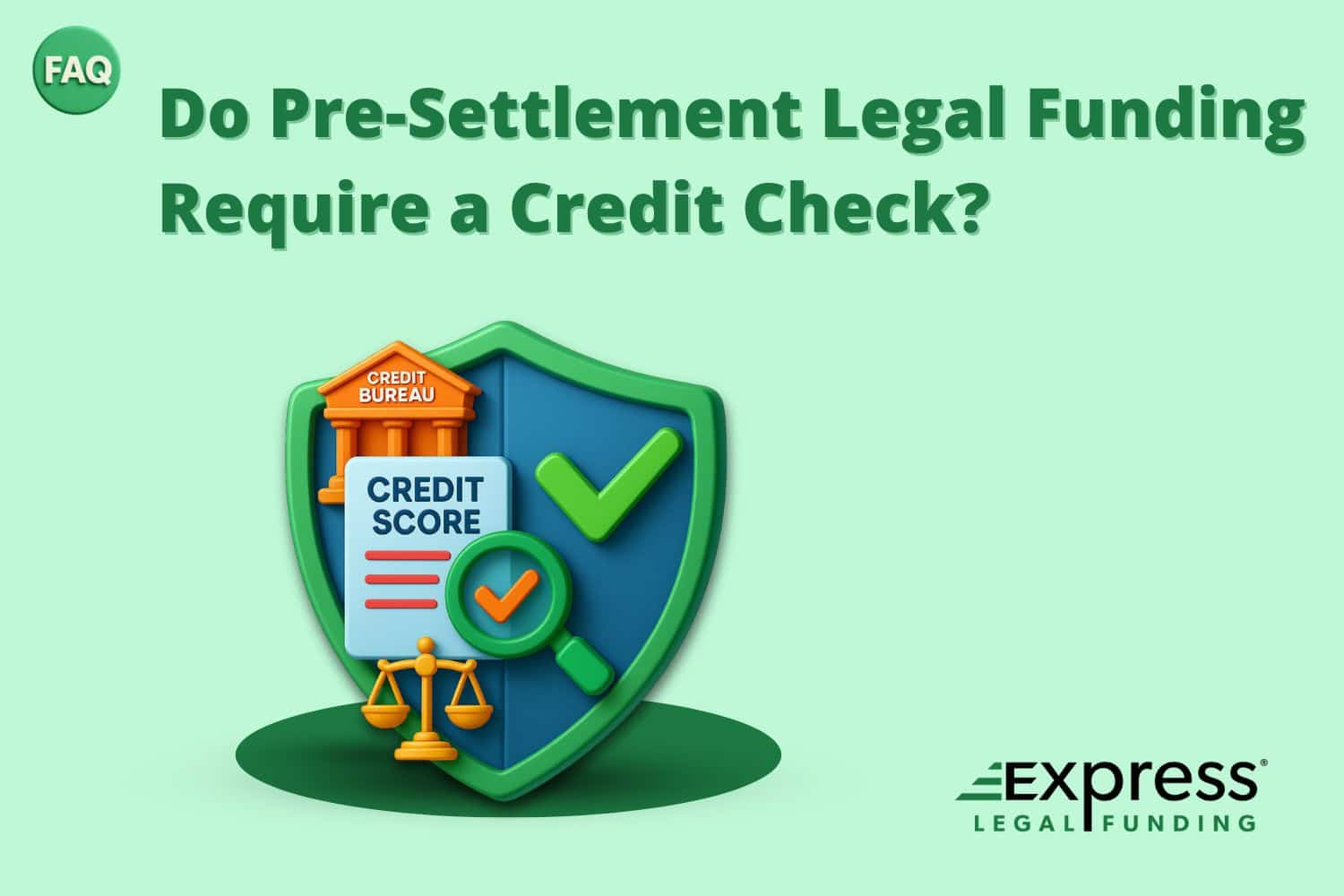
No Impact on Your Credit Score
Pre-settlement funding is a non-recourse cash advance, not a traditional loan. That means:
- No hard or soft credit checks are performed.
- Your credit score remains unchanged whether you are approved or not.
- Because repayment only occurs if you win or settle, there are no late payments or defaults that could harm your credit.
Not Reported to Credit Bureaus
Pre-settlement funding is not reported to major credit bureaus like Equifax, Experian, or TransUnion. This ensures:
- No new accounts are added to your credit file.
- No debt collection entries appear if your case is unsuccessful.
- Your credit report remains completely unaffected by applying for or receiving legal funding.
By separating funding approval from credit history, legal funding provides a way for plaintiffs to access financial relief without leaving any trace on their credit profile or putting their score at risk.
🟢 Ready to get started? Apply for Pre-Settlement Legal Funding Online
Credit Check and Credit Reporting: Pre-Settlement Funding vs. Bank Loans and Credit Cards
[ninja_tables id="22647"]Why Don’t Lawsuit Loan Companies Check Credit?
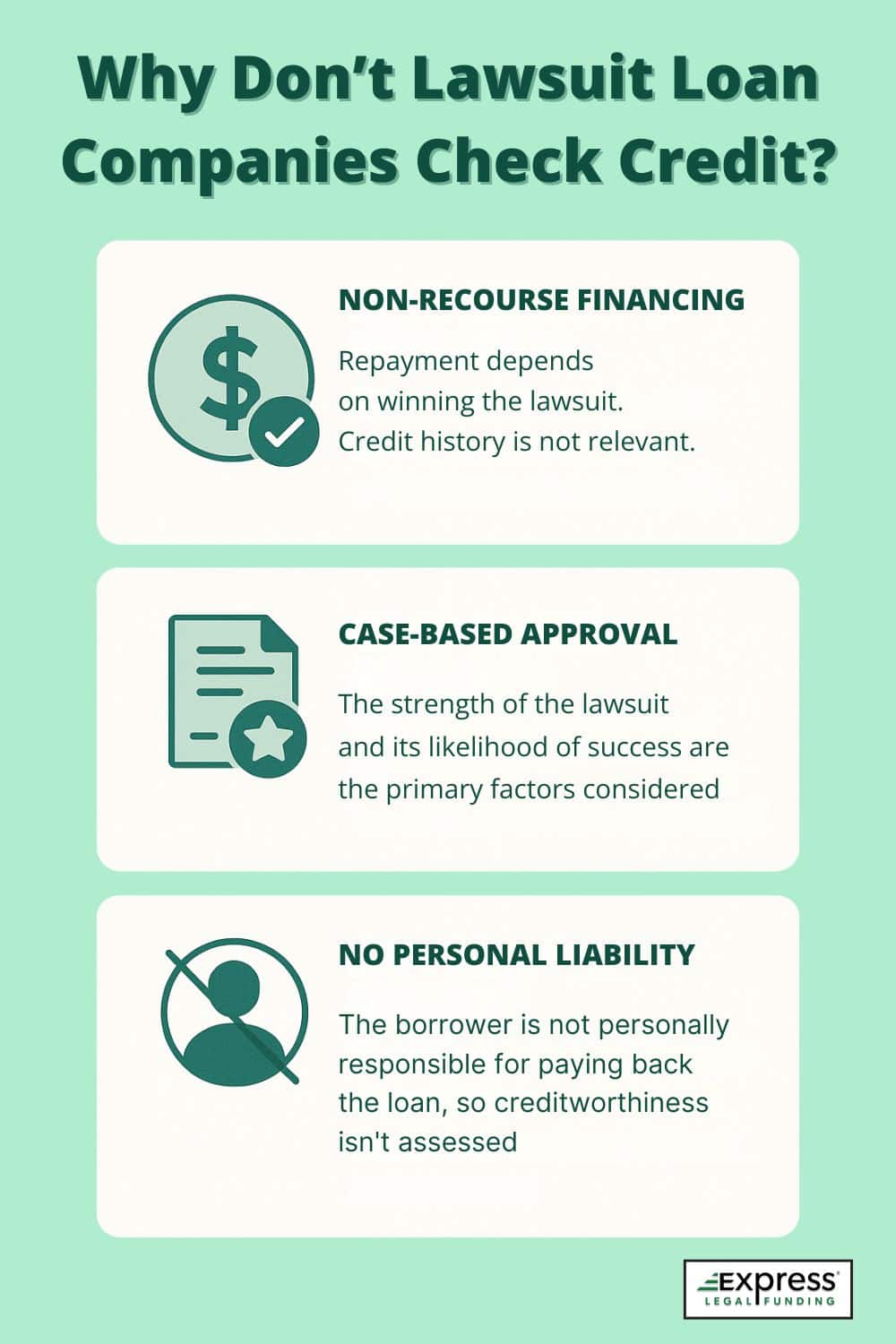
Lawsuit loan companies—also called pre-settlement funding companies—don’t check your credit because approval is based entirely on the strength of your legal case, not your financial history. The advance is non-recourse, meaning you only repay if you win or settle your case.
Since repayment comes directly from your settlement proceeds (handled by your attorney), there’s no need for the company to assess your creditworthiness, income, or employment status.
This makes legal funding accessible to plaintiffs with poor or no credit, without risking negative marks on their credit report.
What Are the Requirements to Qualify for Legal Funding?
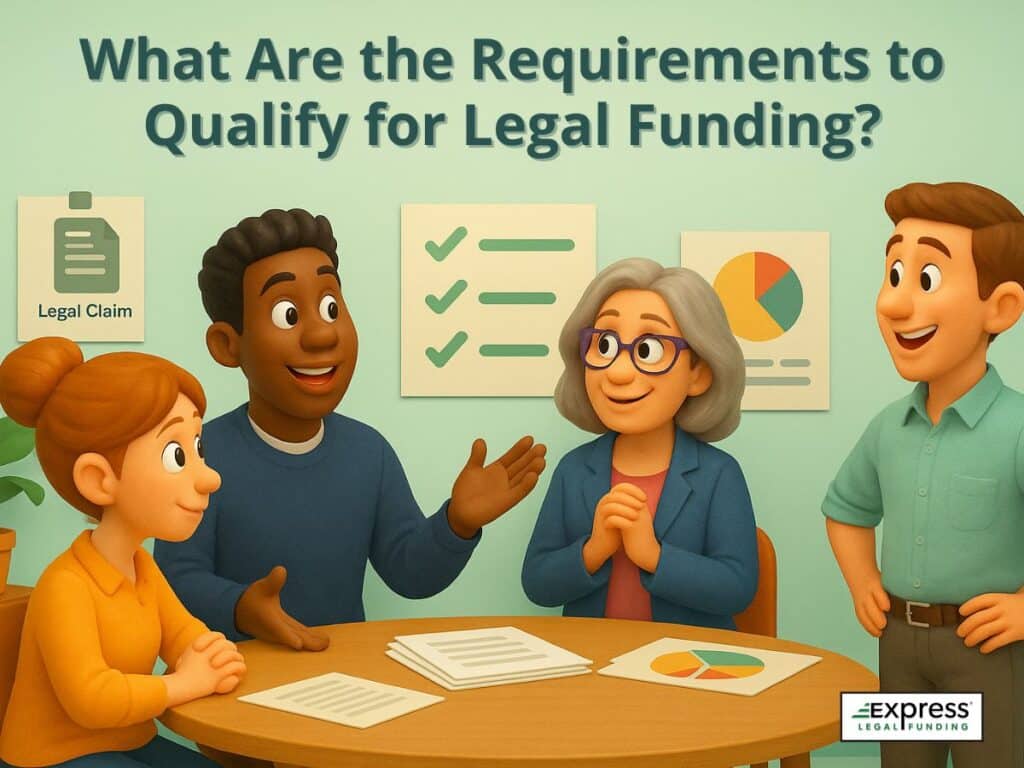
To qualify for pre-settlement funding, Express Legal Funding generally requires that you:
- Have an active claim or lawsuit, often a personal injury case.
- Be represented by a licensed attorney on a contingency fee basis.
- Have a case with sufficient potential settlement value to cover the requested advance.
No credit check, financial documents, pay stubs, or bank statements are required. The settlement serves as collateral.
Learn more about your attorney's role in the legal funding process in this FAQ guide:
Do I Need a Lawyer to Get Legal Funding?
How Pre-Settlement Funding Underwriting Works
Even though pre-settlement funding does not require a credit check, reputable companies still use a structured financial underwriting process to decide whether to approve your application and how much to advance.
Unlike a traditional bank loan or credit card application, this review focuses entirely on the legal and financial strength of your case — not your income, credit score, or personal assets.
Typical Pre-Settlement Funding Underwriting Steps Include:
- Attorney Communication: The funding company contacts your lawyer to confirm representation and request essential case documents. These may include accident reports, medical records, demand letters, or insurance policy information.
- Identity Verification: The funding company confirms the applicant’s identity, often using resources like a TLO search or similar databases. This step ensures you are the rightful claimant, helps prevent fraudulent applications, and may reveal existing liens or judgments related to your case. While it involves reviewing certain public and financial records, it is not related to a credit check and does not affect your credit score.
- Case Review: An underwriter evaluates the key facts — liability (who’s at fault), damages (both economic losses like medical bills and lost wages, and non-economic damages like pain and suffering), and available insurance coverage.
- Settlement Value Estimate: Using the evidence and documentation provided, the company estimates a realistic settlement range, factoring in liens, medical expenses, and attorney fees.
- Advance Amount Calculation: To reduce risk for both sides, most companies advance 10–20% of the net settlement (the amount expected after attorney fees and liens are paid).
- Approval & Contract: If approved, you receive a clear funding agreement outlining the advance amount, fees, and repayment terms.
How Legal Funding Companies Assess Risk and Approve Cases Without Credit Checks
Case Strength Assessment Process
Because pre-settlement funding is non-recourse, repayment only happens if your case is successful, and the funding company is paid directly from your settlement proceeds. This is why approval is based on the strength of your case—not on your credit score, income, or employment history.
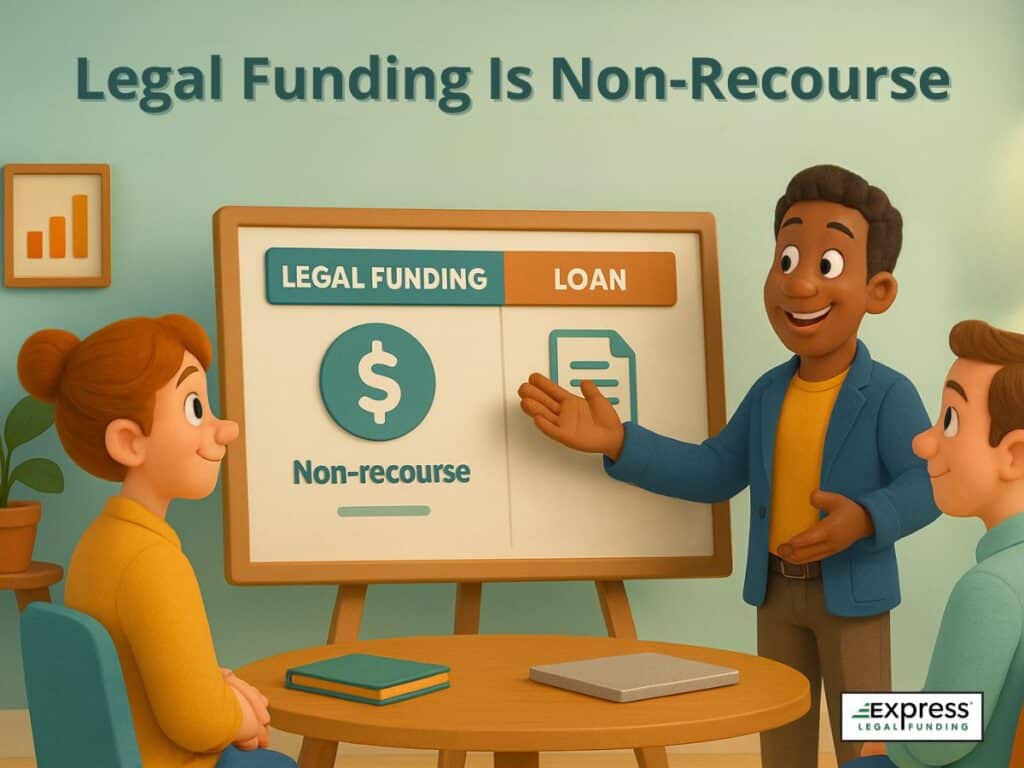
Key elements assessed include:
- Strength of Liability Evidence: Clear proof of fault, backed by police reports, witness statements, or expert testimony.
- Damages Documentation: Verified medical bills, treatment plans, and wage-loss records to support the claimed damages.
- Insurance Policy Limits: Sufficient coverage to realistically pay the anticipated settlement amount
Risk Evaluation Methodology
Once the case strength is established, underwriters determine the funding amount and repayment structure by reviewing:
- Stage of Litigation: Cases closer to trial or with settlement offers carry lower risk.
- Jurisdiction & Jury Trends: Courts known for higher awards may increase potential settlement values.
- Existing Liens or Claims: Medical or other liens, such as overdue child support payments, that could reduce the plaintiff’s net recovery.
Why it matters:
A careful underwriting and risk evaluation process protects plaintiffs from borrowing too much against their settlement — helping ensure they still receive meaningful compensation after repayment. It also allows funding companies to remain financially sustainable, so they can continue helping future plaintiffs.
Regulatory Compliance and Consumer Protections
Pre-settlement legal funding is regulated at the state level in many parts of the U.S., with rules designed to protect consumers and promote transparency. While there is no single federal law governing credit checks for funding, states that address legal funding in their statutes or case law do not require them because approval is based solely on the case’s merits.
For example, under Missouri’s Consumer Legal Funding Act (Mo. Rev. Stat. § 436.564), pre‑settlement funding companies are prohibited from reporting a consumer to a credit reporting agency if the net settlement proceeds are insufficient to cover repayment.
This underscores the industry standard of approving funding based on the merits of the legal claim—not on your personal credit history.
While the Consumer Financial Protection Bureau (CFPB) does not directly regulate all aspects of pre-settlement funding, its mission to prevent unfair or deceptive financial practices influences how reputable companies operate.
At Express Legal Funding, we strive to follow transparency standards consistent with CFPB principles, ensuring contracts are clear, accurate, and free from misleading terms.
Key protections we provide:
- Privacy: We do not access or share your credit report.
- Non-recourse guarantee: You owe nothing if you lose your case.
- Transparent contracts: All terms and fees are disclosed in plain language.
- No hidden fees: Costs are explained upfront.
- Compliance with state laws: We meet or exceed all state-specific requirements.
FAQs About Getting Legal Funding Without a Credit Check
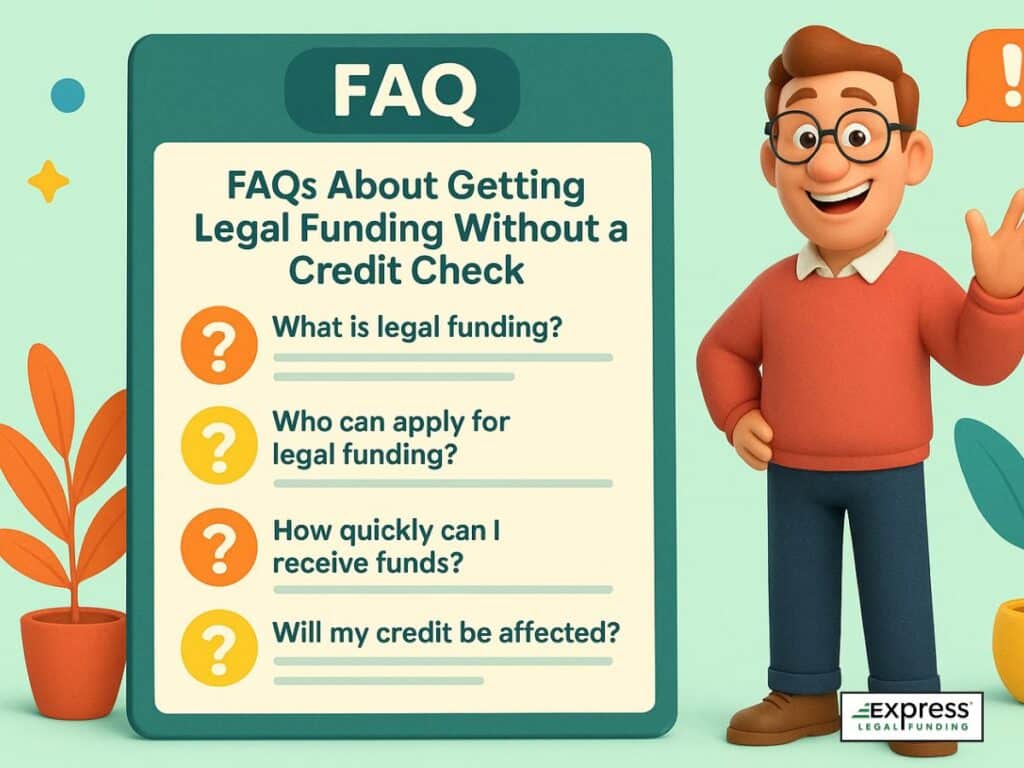
Does pre-settlement funding show up on my credit report?
No. Pre-settlement funding does not appear on your credit report and will not impact your credit history or credit score in any way.
This is because pre-settlement funding is not a traditional loan and is classified as a non-recourse cash advance against your future settlement, not a form of consumer credit.
Since there is no credit check during the approval process and repayment is handled directly through your attorney after your case resolves, there are:
- No hard inquiries that could lower your score.
- No monthly payments reported to credit bureaus.
- No debt collection actions if you lose your case.
In short, receiving pre-settlement funding leaves no trace on your credit profile — making it a safe option for plaintiffs who want to protect their credit while getting the financial support they need.
Can I get legal funding with bad credit?
Yes. Having poor or no credit will not prevent you from qualifying for pre-settlement legal funding.
That’s because approval is based entirely on the strength and potential value of your lawsuit, not your credit history or financial background.
This makes pre-settlement funding a realistic option for plaintiffs with low credit scores who need financial help during a lawsuit but want to avoid the barriers and risks associated with traditional lending.
Do I need to be employed to get pre-settlement funding?
No. Your employment status is not considered when applying for pre-settlement legal funding. Approval is based on the facts of your case, not your employment status or income.
This makes legal funding a viable option for plaintiffs who may be out of work due to their accident or injuries and need financial help while their case proceeds.
What happens if I lose my case?
If you lose your case, you owe nothing back. This is the defining feature of non-recourse legal funding — the repayment obligation exists only if you win or settle your lawsuit.
Because the advance is secured solely by the expected settlement, the funding company assumes all the financial risk. That means:
- If your case is unsuccessful, the balance is completely forgiven.
- You won’t face collections, wage garnishment, or any impact on your credit.
- Your personal finances remain protected regardless of the outcome.
This risk-free structure allows injured plaintiffs to access the money they need during a lawsuit without the fear of being burdened by debt if their case does not resolve in their favor.
Does pre-settlement funding affect getting a mortgage or loan?
No. Pre-settlement funding does not appear on your credit report and does not affect your credit score, so it should not impact your ability to get a mortgage, car loan, or other financing. Since it is a non-recourse cash advance (not a loan) repaid only if you win or settle your case, there are no monthly payments, delinquencies, or debt records reported to credit bureaus.
However, lenders may still consider your overall financial situation, so it’s best to consult your mortgage or loan officer if you have concerns.
How is legal funding different from a loan?
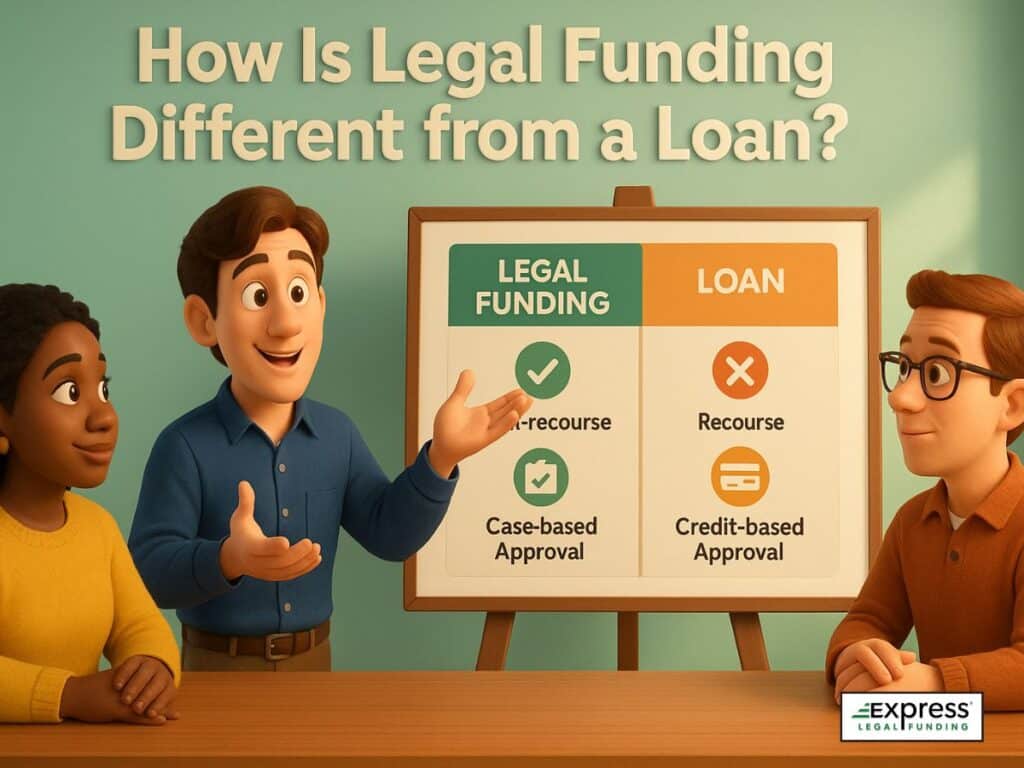
Pre-settlement legal funding is not a traditional loan — it is a non-recourse cash advance secured by your future settlement. This means you only repay if you win or settle your case.
Unlike bank loans or credit-based financing, legal funding has unique advantages:
- No monthly payments: Repayment happens in one lump sum from your settlement, handled by your attorney.
- No personal guarantees: You are not personally liable for repayment if your case is unsuccessful.
- No credit checks: Approval is based solely on your case’s merits, not your credit history or income.
- Risk-free if you lose: If your case does not result in a settlement or award, you owe nothing back.
Because repayment is tied directly to your case’s outcome, legal funding provides plaintiffs with immediate financial relief without adding debt or jeopardizing personal assets.
Relevant FAQ guide: Does Pre-Settlement Funding Require Monthly Payments?
How much money can I get through pre-settlement funding?
The amount you can receive depends on the value and strength of your case. Most pre-settlement funding companies, including Express Legal Funding, typically advance around 10% to 20% of your anticipated settlement amount.
For example:
If your attorney estimates your case may settle for $50,000, you could receive $5,000 to $10,000 as an advance.
Key Factors That Influence the Amount:
- Case value: Higher potential settlements generally qualify for larger advances.
- Liability and damages: Stronger cases with clear liability may receive higher offers.
- Stage of litigation: Cases closer to settlement or trial often qualify for more funding.
Remember, because this is non-recourse funding, you only repay if you win or settle your case — and repayment comes directly from your settlement proceeds.
How long does it take to get the money?
Once your application is approved and your funding contract is signed, most clients receive their money within 24 to 48 hours — and in many cases, the same day.
At Express Legal Funding, we streamline the process because we understand that plaintiffs often need immediate access to cash for living expenses, medical bills, or other urgent costs while waiting for their case to settle.
The speed of funding depends on:
- Contract completion: The sooner you sign and return your funding agreement, the sooner we can release the funds.
- Attorney cooperation: How quickly your attorney provides the required case documentation and signs their acknowledgement of your Irrevocable Letter of Direction (this document instructs your lawyer to repay the funding company directly from your settlement proceeds).
- Approval timing: Applications finalized earlier in the day are more likely to receive same-day funding due to bank cutoff times.
- Payment method: Direct deposit or wire transfers typically arrive faster than mailed checks.
By expediting our review, contract signing, and payment steps, we help clients access the cash they need without unnecessary delays.
What are the fees or interest rates on pre-settlement funding?
Fees and interest rates for pre-settlement funding vary by provider and can depend on your case’s value, how long it takes to resolve, and the company’s pricing structure.
How some legal funding companies charge interest and fees:
- Simple interest: a type of interest that accrues only on the original advance amount, leading to slower growth of the repayment total.
- Compounding interest: a type of interest that is charged on both the original advance and previously accrued interest, which can cause the repayment amount to grow much faster over time.
- Flat fees: This pricing structure involves fixed costs added to the repayment, regardless of the length of the case. Examples include origination and administrative fees added to the contract.
Because costs can add up significantly, it’s essential to:
- Review your contract carefully before signing.
- Ask for a clear total payoff estimate based on your attorney’s expected case timeline.
- Compare multiple providers to ensure you’re getting fair and transparent terms.
Go beyond the basics and uncover a detailed explanation of fees, interest, and repayment terms in our guide: How Much Does Pre-Settlement Legal Funding Cost?
At Express Legal Funding, we believe in clear, upfront pricing so you always know exactly what to expect. Our lawsuit loan calculator can help you estimate the potential cost of borrowing legal funding.
Can I use the money for any purpose?
Yes. Once you receive pre-settlement funding, the money is yours to use however you need — there are no spending restrictions.
Many plaintiffs use the funds to cover essential living expenses and keep up with bills while their lawsuit is pending.
Common uses include:
- Rent or mortgage payments to keep your housing stable.
- Medical bills related to your injuries or ongoing treatment.
- Utilities such as electricity, water, phone, and internet.
- Groceries and other everyday household needs.
- Paying down debt to avoid high interest or late fees.
Because the advance is based on your expected settlement — and repayment only happens if you win or settle — you can use the funds to relieve immediate financial pressure and focus on your recovery and your case.
What types of cases qualify for legal funding?
Most personal injury and similar civil cases can qualify for pre-settlement legal funding, as long as there is a strong likelihood of receiving a settlement or court award. Eligibility is based on the merits of your case and whether your attorney can confirm the necessary case details — not your credit score or personal finances.
Common case types that qualify include:
- Car accidents and other motor vehicle collisions.
- Slip and fall injuries and other premises liability claims.
- Medical malpractice and nursing home negligence.
- Product liability claims involving defective or dangerous products.
- Employment law disputes, such as wrongful termination or discrimination.
- Workplace injuries states where workers’ compensation cases are eligible or those with third-party liability.
Some funding companies, including Express Legal Funding, also consider other case types — such as wrongful death or toxic mold exposure claims — if there is a clear liability and a potential monetary recovery. If you are unsure whether your case qualifies, it’s best to apply or speak with our team for a quick evaluation.
Key Takeaways
- No credit check is required for pre-settlement funding.
- No impact on credit score from applying or receiving funds.
- Approval is based entirely on your case’s potential outcome.
- Fast funding — often within 24 hours of approval.
- 100% risk-free guarantee. If you lose your case, you owe nothing.
About Express Legal Funding
At Express Legal Funding, we help personal injury and accident victims access the money they need while their claims move forward. Our pre-settlement cash advances allow clients to cover essential living expenses, medical bills, and other urgent costs without taking on traditional debt.
With a clear, transparent approval process and repayment only if you win or settle, we make it easier to focus on recovery and your case — not financial stress.
Get Pre-Settlement Funding Without a Credit Check
Don’t let financial strain force you to settle for less. Because approval is based on your case — not your credit history — you can qualify even with poor or no credit. Our streamlined process can put cash in your account in as little as 24 hours after approval.
Apply online or call us today at (888) 232-9223 to find out how much funding you can qualify for. Complete your application below to get started.
The main pros of pre-settlement funding are quick access to cash while a lawsuit is pending and repayment only if the case is won. The main cons are the costs, since fees and interest can reduce the final settlement that a plaintiff keeps. For this reason, pre-settlement funding is best used for essential expenses rather than discretionary spending.
If you’re struggling financially while waiting for your lawsuit to settle, pre-settlement funding can provide quick and reliable relief during that difficult period.
However, it’s important to understand the pros and cons of pre-settlement funding—while it can provide fast access to money for essential expenses, there are also costs and considerations involved.
Knowing both sides will help you make the best decision for your situation.
Pros and Cons of Pre-Settlement Funding Infographic
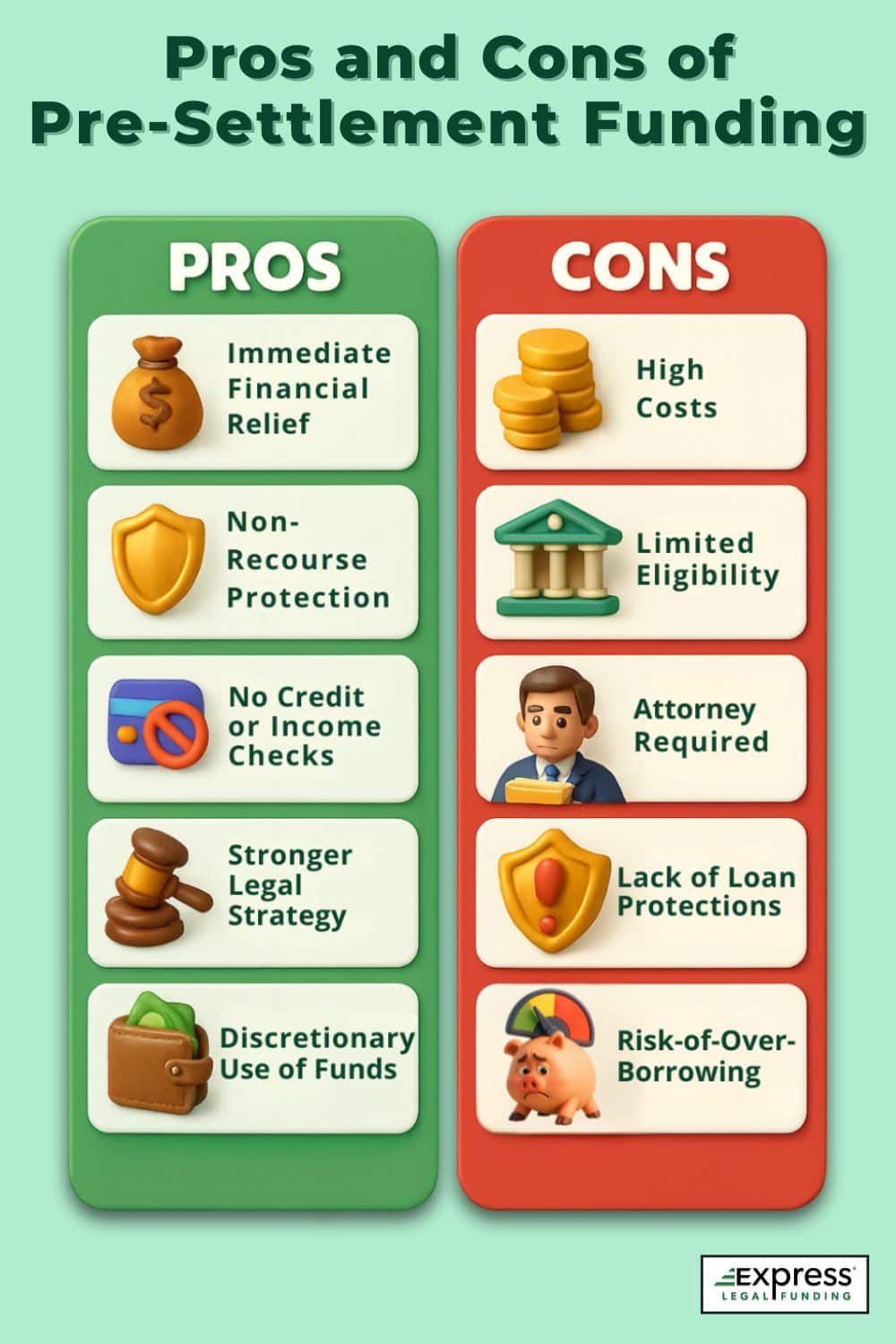
What Is Pre-Settlement Funding?
Pre-settlement funding is a type of cash advance against the expected outcome of a lawsuit. It is non-recourse, meaning repayment is only owed if the plaintiff wins or settles the case. Unlike loans, which are based on credit scores and income, pre-settlement funding approval depends on the strength of the case.
This option is commonly used by personal injury plaintiffs, such as those injured in car accidents, workplace incidents, or slip-and-fall cases. Because lawsuits can take months or years to resolve, pre-settlement funding is designed to help claimants pay for everyday expenses during the wait.
⚡ Ready to get pre-settlement funding? Apply online today and access cash fast.

How Pre-Settlement Funding Works
- Application: The plaintiff (or their attorney on their behalf) applies with a legal funding company.
- Attorney Cooperation: The company requests case details from the lawyer, including liability, damages, and insurance policy limits.
- Case Evaluation: Underwriters review the legal claim’s likelihood of success and potential settlement value.
- Approval & Advance: If approved, the plaintiff receives an offer amount and a funding contract. Once signed, they receive their lump sum cash payment (often within 24–48 hours).
- Repayment: If the case is successful, the funding company collects repayment directly from the settlement. If the case is lost, the plaintiff owes nothing.
👉 Want to dive deeper? Explore our full guide: What Is Legal Funding and How Does It Work?
Who Qualifies for Pre-Settlement Funding?
Most plaintiffs in personal injury and accident cases may qualify for pre-settlement funding if they have an attorney working on a contingency fee basis. Approval is based on the strength of the case, liability, damages, and available insurance coverage, not credit or income.
Plaintiffs without legal representation or cases with weak evidence or disputed liability typically will not qualify.
Pros and Cons of Pre-Settlement Funding
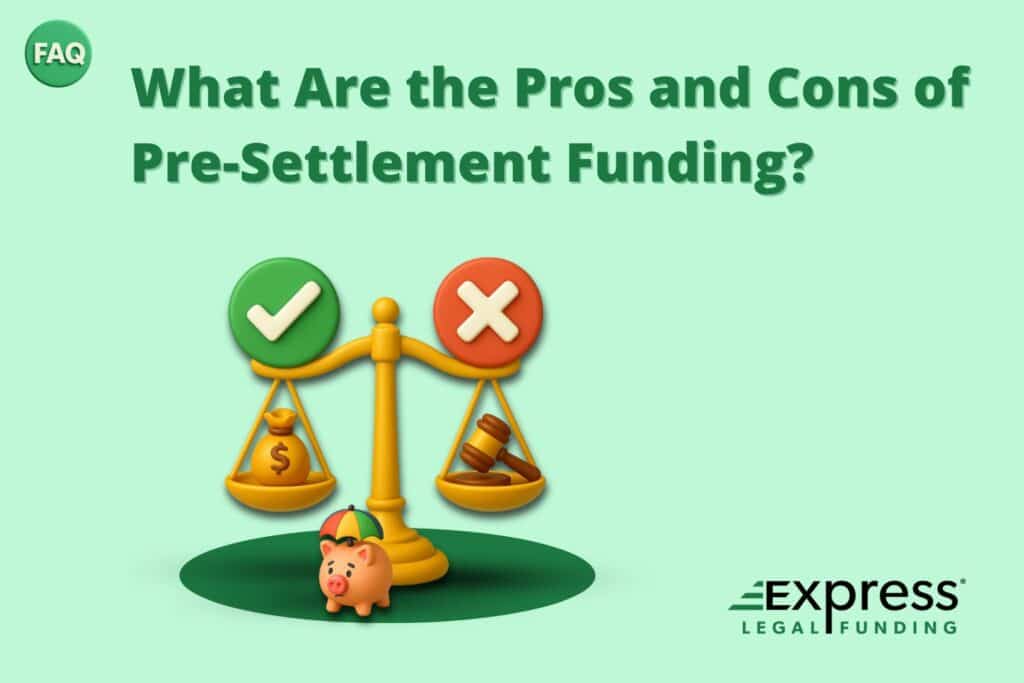
[ninja_tables id="22843"]
Pros of Pre-Settlement Funding
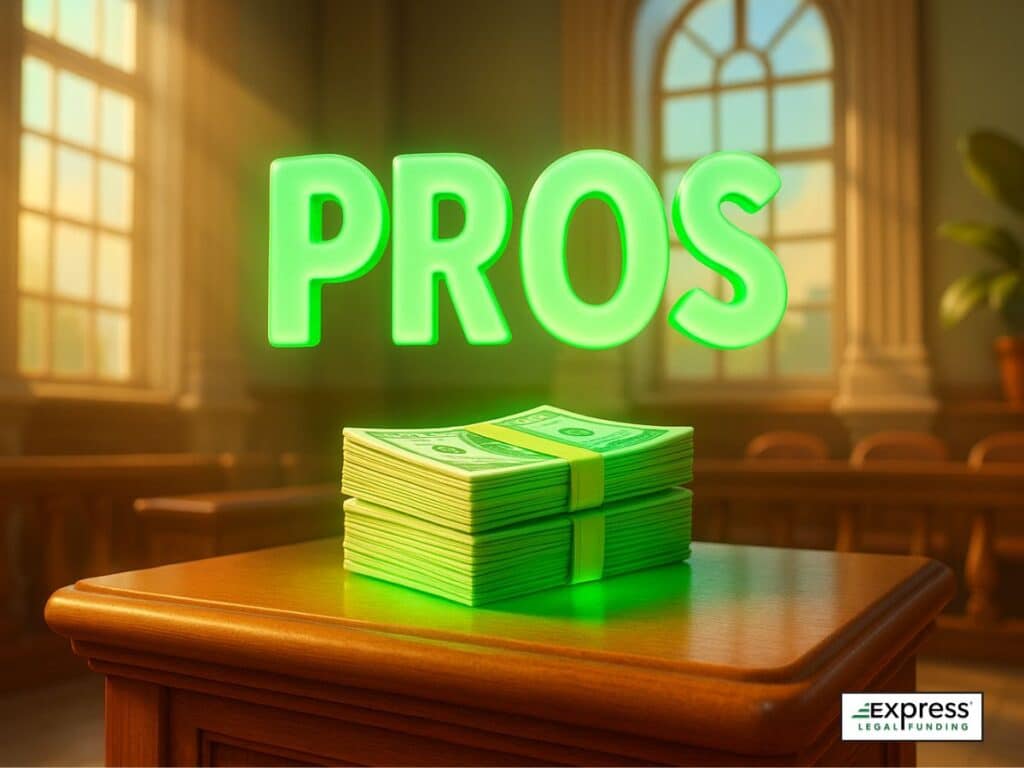
Here’s a closer look at the benefits of pre-settlement funding in detail:
Pre-settlement funding can provide much-needed financial support while you wait for your case to resolve. Beyond quick access to cash, it offers unique protections and advantages that traditional loans cannot match.
From non-recourse terms that safeguard you if you lose your case to the freedom of using funds however you need, these benefits can make a real difference in both your personal finances and legal strategy.

Immediate Financial Relief
Pre-settlement funding provides fast access to cash when plaintiffs need it most. Lawsuits can drag on for months or even years, leaving injured victims struggling to cover daily costs. With a pre-settlement advance, funds are typically available within 24–48 hours after approval.
This quick turnaround helps plaintiffs pay rent, groceries, utilities, and medical bills without falling behind financially during the legal process.
Non-Recourse Protection (No Repayment If You Lose)
One of the biggest benefits of pre-settlement funding is that it is non-recourse, meaning repayment is only required if the case is successful. If the lawsuit is lost, the plaintiff owes nothing. This unique structure shifts the financial risk to the funding company, not the injured party.
Unlike traditional loans, where borrowers are personally responsible for repayment, pre-settlement funding provides peace of mind and financial security during uncertain litigation without the risk.
Learn more in this relevant guide: What Is Non-Recourse Legal Funding?
No Credit or Income Checks
Eligibility for pre-settlement funding is based on the strength and value of the case, not personal finances. Plaintiffs with poor credit, limited income, or no employment history can still qualify since the funding decision depends on liability, damages, and insurance coverage.
This makes it an attractive option for accident victims who may already be facing financial hardship and cannot qualify for traditional financing options. Plus, it has no negative impact on credit scores.
Relevant guide: Do Pre-Settlement Funding Companies Require Credit Checks?
Stronger Legal Strategy
Financial stress often forces plaintiffs to accept lowball settlement offers just to pay their bills. Pre-settlement funding allows claimants to maintain stability while their attorney fights for the maximum compensation their case deserves.
With living expenses covered, plaintiffs can avoid settling too early and instead give their lawyer the time needed to gather evidence, negotiate effectively, or even prepare for trial if necessary. This increases the likelihood of a fair and full settlement.
Discretionary Use of Funds
Once approved, plaintiffs have full control over how the money is spent. Unlike certain financial products that restrict use, pre-settlement funding can be applied to any expense the plaintiff chooses—whether it’s childcare, housing, medical treatment, transportation, or household bills.
This flexibility ensures that the settlement advance supports the plaintiff’s most urgent needs, providing both convenience and peace of mind.
Cons of Pre-Settlement Funding
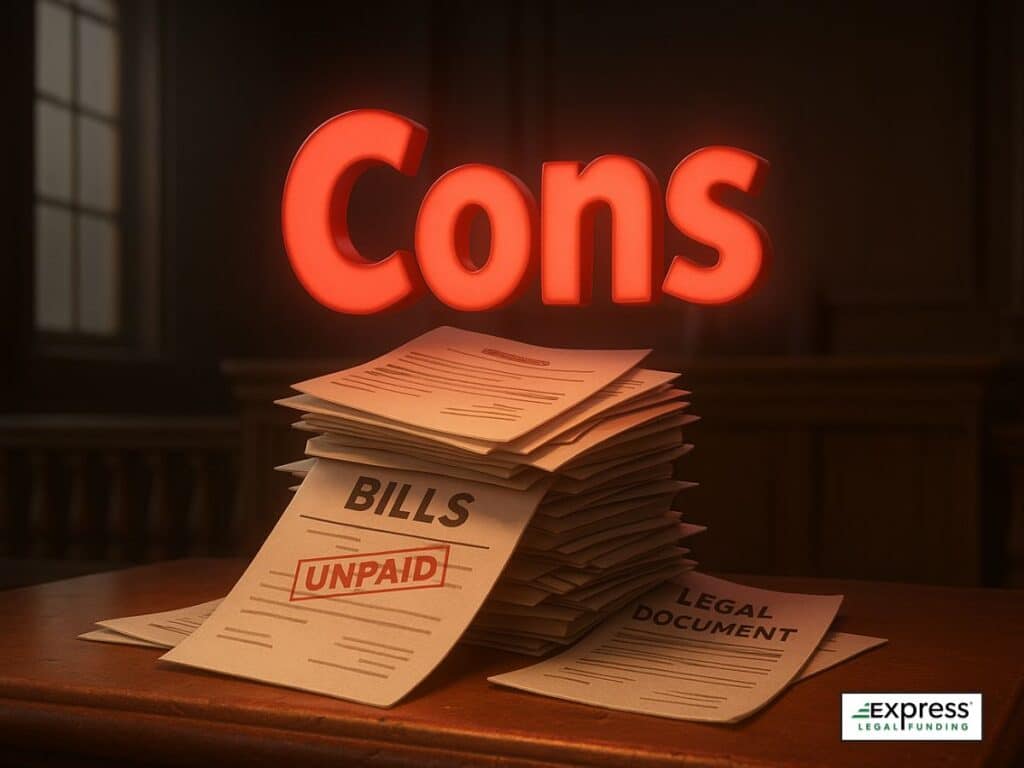
Here’s a closer look at the drawbacks of pre-settlement funding in detail:
While pre-settlement funding can offer valuable financial relief, it also comes with important trade-offs that claimants should consider. High interest rates and fees can reduce the portion of your eventual settlement. Eligibility is often limited, and attorney participation is mandatory, which may slow down the process.
Unlike traditional loans, these advances lack certain consumer protections, and there is always the risk of borrowing more than you truly need.

High Interest Rates and Costs
The most significant disadvantage of pre-settlement funding is its expense compared to traditional financing options. Legal funding companies charge fees for the risk they assume, and those fees are typically higher than those of credit cards, personal loans, or bank financing.
In addition, many contracts use monthly or compounding rates, which means the longer a case lasts, the more the repayment grows.
For example, a $5,000 advance could end up costing $10,000 or more if the lawsuit takes years to resolve. This can leave plaintiffs with a much smaller share of their settlement than they expected.
Relevant read: How Much Does Pre-Settlement Legal Funding Cost?
Limited Eligibility
Not every lawsuit qualifies for pre-settlement funding. Companies usually only approve cases with clear liability, strong damages, and an insurance policy available for recovery. Cases that involve disputed fault, minimal medical treatment, or uncertain damages may be denied.
This means that even if a plaintiff urgently needs money, approval is not guaranteed.
The strict requirements can make funding unavailable to plaintiffs with weaker or more complex cases.
Attorney Involvement Required
Pre-settlement funding cannot proceed without the active cooperation of the plaintiff’s attorney. The legal funding company will request case documents, liability assessments, and updates to evaluate risk. If an attorney refuses to work with the funder or is slow to provide documents, the approval process may be delayed—or denied altogether.
This can frustrate plaintiffs who need immediate cash but must rely on their lawyer to complete the legal funding process.
Lack of Consumer Loan Protections
Since pre-settlement funding is legally classified as a non-recourse cash advance and not a traditional loan, many standard consumer lending protections do not apply. Regulations that govern interest rates, loan disclosures, or predatory lending may not extend to lawsuit funding agreements.
As a result, contracts can be harder for consumers to challenge if the terms feel unclear or unfair. This makes it especially important for plaintiffs to read the contract carefully and ask their attorney to review the terms before signing.
Risk of Over-Borrowing
Because pre-settlement funding is based on the projected value of a case, some plaintiffs may be approved for more money than they truly need.
Taking a larger advance can feel helpful in the moment, but it increases the repayment amount and can dramatically reduce the net settlement a plaintiff keeps.
For this reason, many attorneys recommend borrowing only the minimum necessary to cover essential living expenses.
Ultimately, pre-settlement funding can be a valuable tool for some plaintiffs, but it should be used carefully and only after weighing these pros and cons with your attorney.
Wondering how much pre-settlement funding you qualify for and where to draw the line? Explore our guide: How Much Pre-Settlement Funding Can I Get on My Case?
Example of Pre-Settlement Funding Costs
Suppose a plaintiff is advanced $10,000 on a case expected to settle for $50,000. If the case resolves quickly, repayment might total $12,500.
But if the case takes two years, compounding fees could push repayment to $20,000 or more. That leaves the plaintiff with much less from their final settlement.
This illustrates why legal funding can be both a lifeline and a costly option depending on timing.
Attorney and Court Perspectives on Pre-Settlement Funding
Attorney Perspectives
Many lawyers view pre-settlement funding as a valuable tool to ease financial pressure on clients during lengthy cases. By helping plaintiffs cover essential expenses, funding can prevent them from settling too early. At the same time, attorneys often warn clients about the high costs and potential impact on final recovery, usually advising that they borrow only what is truly necessary.
Court Perspectives
Most courts permit pre-settlement funding because it is classified as a non-recourse cash advance rather than a loan. Still, some jurisdictions have raised concerns about high rates and limited consumer protections, leading to debates over tighter regulations and new statutes. These discussions emphasize the importance of clear, transparent contracts to safeguard plaintiffs.
Alternatives to Pre-Settlement Funding
While pre-settlement funding can be a lifeline, it’s often a last-resort solution. Alternatives include:
- Personal Loans: Lower interest rates, but require credit checks and income verification.
- Credit Cards: Useful for short-term expenses but risky if balances aren’t repaid quickly.
- Borrow from Family or Friends: Can provide interest-free help, but may strain relationships.
- Community Assistance Programs: Some nonprofits and state agencies offer aid for housing, utilities, or medical bills.
Discover more alternatives in this in-depth guide: 15 Alternatives to Lawsuit Loans: Pros, Cons, & How to Apply
Is pre-settlement funding worth it?
Pre-settlement funding can be worth it for plaintiffs who need immediate financial relief and have limited alternatives, since repayment is only required if the case is won. However, because fees can reduce the final settlement, it should be used carefully and only for essential expenses.
When does pre-settlement funding make sense?
Pre-settlement funding may be appropriate if:
- You face urgent expenses like rent or medical bills.
- You have no other affordable financial options.
- Your attorney believes your case has strong settlement potential.
- You understand the costs and are comfortable with how much you’ll owe if you win.
If you have other sources of funding or savings, it’s often better to exhaust those first before turning to legal funding.
How long does pre-settlement funding take?
Most pre-settlement funding applications are processed quickly, with approval and funding typically completed within 24 to 48 hours once the attorney provides case information to the funding company. In some situations, plaintiffs may receive cash the same day after their attorney submits the necessary documents.
Bottom Line: Advantages and Disadvantages of Pre-Settlement Funding
Pre-settlement funding offers fast, risk-free cash for plaintiffs waiting on a settlement, but the costs can take a large portion of the final recovery. For some, it is a necessary tool to stay afloat during a long lawsuit. For others, the high rates may outweigh the benefits.
The key is to weigh your financial needs against the potential reduction in your payout and review all terms with your attorney before signing.
Express Legal Funding: Affordable, Transparent Pre-Settlement Lawsuit Funding
At Express Legal Funding, we provide fast, risk-free cash advances to help plaintiffs cover essential living expenses while their case is pending. Our process is simple, transparent, and affordable—unlike lawsuit loan companies that often charge excessive fees.
By offering direct funding at lower rates, we help you keep more of your settlement while still getting the financial relief you need now.
Discover why Express Legal Funding is the trusted choice in our guide: 10 Reasons to Choose Express Legal Funding

Get Pre-Settlement Funding Fast — Apply Online in Minutes
At Express Legal Funding, we make the process simple, transparent, and risk-free. Apply now to cover your essential expenses while your case is pending. Approval is based on the strength of your case—not your credit or income.
The pre-settlement funding process allows plaintiffs to receive a cash advance while their lawsuit is still pending. To apply, you provide case details and your attorney’s information, which the funding company reviews with supporting documents. Underwriters then assess liability, damages, and the likelihood of recovery before making an approval decision. If approved, funds are usually disbursed within 24 to 48 hours, and repayment is only required if you win or settle, since pre-settlement funding is non-recourse.
Understanding the Pre-Settlement Funding Process
This page is designed to walk you through the pre-settlement funding process step by step. Whether you’re hearing about legal funding for the first time or just want to understand how it works at Express Legal Funding, you’ll find clear answers here.
We explain what pre-settlement funding is, who qualifies, what types of cases are eligible, the costs involved, and how repayment works once your case resolves.
Along with this video, we’ve included a free infographic below that clearly explains the pre-settlement funding process step by step.
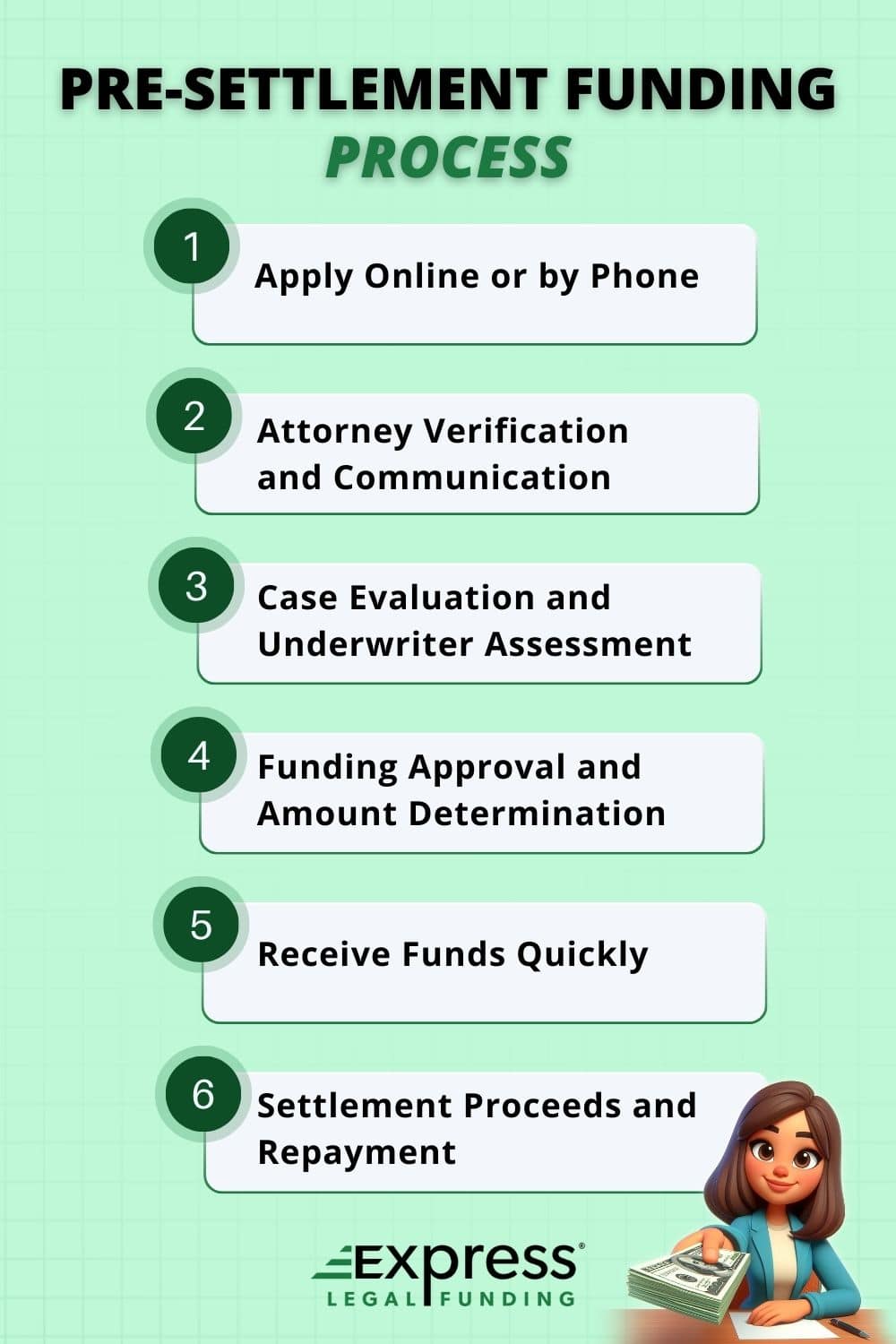
What Is Pre-Settlement Funding?
Pre-settlement funding is a form of legal financing that provides plaintiffs with a cash advance while their lawsuit is still pending. Unlike a traditional loan, it is non-recourse, meaning you only repay if you win or settle your case.
This structure ensures you are not treated as a traditional debtor, since repayment is tied solely to your settlement outcome

While personal loans, credit cards, or payday advances are based on your credit score, employment history, or income, pre-settlement funding is not. Instead, approval depends entirely on the merits and value of your case and requires cooperation from your attorney.
Within the litigation finance ecosystem, pre-settlement funding gives injured plaintiffs immediate financial relief to cover living expenses, medical bills, or rent, so they can continue pursuing a fair settlement without being forced into an early, low-ball payout.
Relevant read: What Are the Pros and Cons of Pre-Settlement Funding?
How Does the Pre-Settlement Funding Process Work at Express Legal Funding?
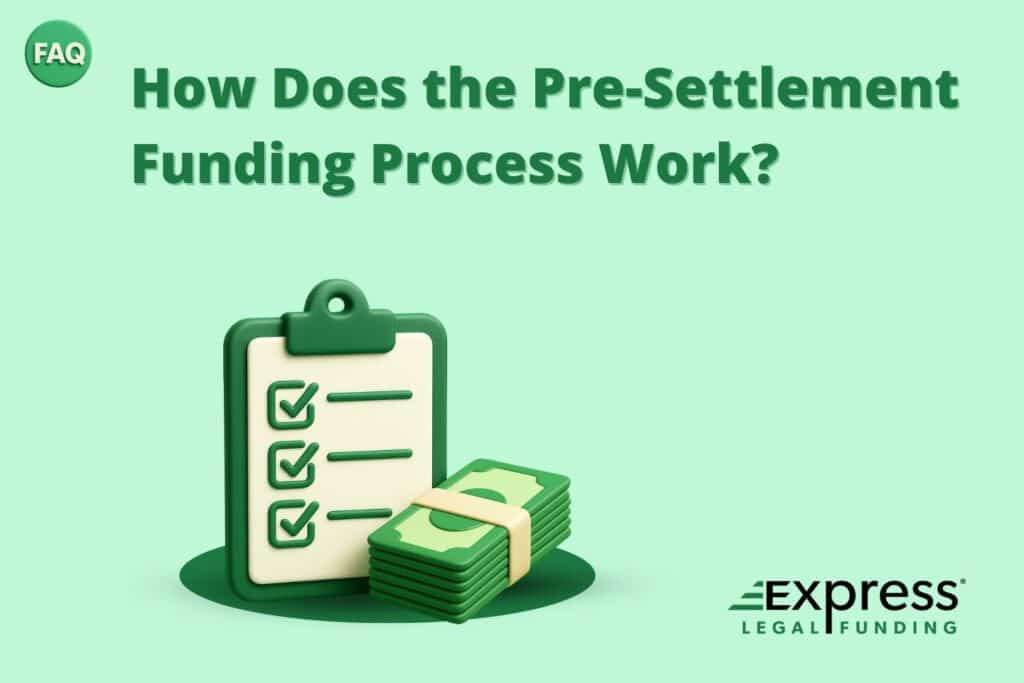
At Express Legal Funding, the pre-settlement funding process is designed to be fast, simple, and completely risk-free. You start by applying online or by phone with your case details and your attorney’s contact information. Our team works directly with your lawyer to review the claim, and if approved, you can receive cash—often within 24 hours.
Because our advances are non-recourse, repayment is only required if you win or settle your case, making pre-settlement funding a safe way to cover expenses while your lawsuit is ongoing.
Here’s how the pre-settlement funding process works:
- Apply and provide case details: Contact Express Legal Funding online or by phone, share your attorney’s information, and submit basic case documentation. No credit check or employment history is required.
- Attorney verification and consent: Your lawyer provides key documents and confirms representation so we can review your claim.
- Case evaluation and underwriter risk assessment: Our team evaluates liability, damages, and insurance coverage to determine the strength and potential value of your case.
- Funding approval and amount determination: If approved, you can receive a legal funding contract for a cash advance, typically 10–20% of your expected settlement amount.
- Fund disbursement: Once the agreement is signed, funds are delivered by direct deposit, wire, or check—often within 24 hours.
- Settlement and repayment: When your case is resolved, your attorney repays the advance plus agreed-upon fees from the settlement, and you keep the remaining balance.
Timeline expectation: Once the contract is signed and your attorney acknowledges the lien, most approved clients get their funds in under 24 hours.
Over 95% of Express Legal Funding Clients Get Cash Within 24 Hours of Approval
Supporting Statistic:
Thanks to same-day ACH and e-checks, over 95% of approved Express Legal Funding clients get their pre-settlement cash advance in less than 24 hours after all parties sign the contract.
Client Testimonials: Real Stories from Satisfied Clients
At Express Legal Funding, we pride ourselves on providing fast, reliable, and consistent service. Many clients return to us multiple times because they trust our team to deliver lawsuit cash advances quickly and handle their cases with care.
Here’s what one client had to say about their experience:
Express Legal Funding is the most efficient, fastest, and most reliable. They always get the job done amazingly. I’ve worked with them three times so far, and each experience has been excellent. Every time, they are thorough, efficient, and consistent. I’m very pleased with the service.
Shelly – Verified Client

Who Is Eligible for Pre-Settlement Funding?
Eligibility for pre-settlement funding depends on your case and legal representation, not your credit score or income. To qualify with Express Legal Funding, you must meet these requirements:
- Active legal claim with attorney representation: Plaintiffs must have a pending case or legal claim and be represented by an attorney working on a contingency fee basis.
- Case merit and settlement potential: The lawsuit must show clear liability and a reasonable chance of financial recovery, often through insurance coverage.
- Attorney cooperation: Your lawyer must provide documentation and confirm representation so the funding request can be reviewed.
- No credit score requirements: Approval is based solely on your case, not your financial history.
- State availability: Legal funding is regulated differently by state, so eligibility may vary depending on where you live.
This ensures funding is available to plaintiffs with strong cases while protecting clients from debt risk.
What Types of Cases Qualify for Pre-Settlement Funding?
Pre-settlement funding is available for a wide range of civil claims, most often those involving personal injury and clear financial damages. At Express Legal Funding, approval depends on your attorney’s cooperation and the strength of your claim, not your credit score. Common case types that qualify include:
- Personal injury cases: Motor vehicle accidents, slip and fall injuries, and other negligence-based claims.
- Medical malpractice: Cases involving hospital negligence, surgical errors, or misdiagnosis.
- Automotive accidents: Car, truck, motorcycle, and pedestrian collisions with insurance-backed liability.
- Premises liability: Injuries on unsafe property, including falls, inadequate security, or defective conditions.
- Employment discrimination: Workplace harassment, wrongful termination, or retaliation claims.
- Product liability: Injuries caused by defective or dangerous consumer products.
- Wrongful death: Claims filed by surviving family members after a fatal accident or medical error.
- Workers’ compensation: Cases where employees are injured on the job and are pursuing benefits or settlements.
By advancing funds on these types of cases, pre-settlement funding helps plaintiffs cover living expenses and medical bills while their lawsuit moves through the courts.
What Are the Costs Associated with Pre-Settlement Funding?
The costs of pre-settlement funding vary by provider. While some terms may sound similar to traditional loans, the structure and repayment rules are entirely different. Here are the key costs and fee concepts to understand:
- Fee structure: Most companies charge fees calculated monthly or annually. Costs are based on the advance amount and the length of your case.
- Simple vs. compound interest: Some funders use compounding rates, which can grow rapidly. Express Legal Funding only uses low rates to keep repayment fair and predictable.
- Total cost scenarios: The longer a case takes, the more fees accrue. A case lasting 6 months may cost far less than one lasting 2 years.
- Comparison to loans: Unlike credit cards or personal loans, legal funding does not require collateral, monthly payments, or a good credit score.
- Consumer protections: Certain states regulate lawsuit funding providers, requiring clear disclosures, limits on rates, and the right to cancel agreements.
At Express Legal Funding, our rates are designed to be both affordable and transparent. By working directly with us as your funding provider, you avoid costly broker markups and benefit from consistently lower, clearer costs.
Can I Get Legal Funding for Automotive Accident Cases?
Yes. Automotive accident cases are among the most common types of lawsuits that qualify for pre-settlement funding. If you were injured in a car, truck, or motorcycle collision, you may be eligible for a cash advance while your claim is pending.
- Average funding amounts: Advances are typically 10–20% of the expected settlement value, which can range from a few thousand dollars to much higher, depending on the severity of injuries and insurance coverage.
- Documentation requirements: Your attorney must provide police accident reports, medical records, proof of injuries, and details about the at-fault driver’s insurance.
- Insurance considerations: Because most accident claims are paid through liability insurance, funding approval depends on the defendant’s policy limits and ability to cover damages.
- Timeline expectations: Once your attorney submits documents, funding decisions are usually made the same day, with cash available in 24–48 hours.
Pre-settlement funding for auto accidents helps plaintiffs cover medical bills, car repairs, rent, and living expenses while waiting for a fair settlement.
How Does Pre-Settlement Funding Work for Medical Malpractice Cases?
Medical malpractice lawsuits often take longer to resolve than other personal injury claims, which makes pre-settlement funding especially valuable for plaintiffs facing ongoing medical costs. At Express Legal Funding, the process works similarly to other case types but has additional considerations:
- Extended case timelines: Malpractice claims can take years due to complex litigation, appeals, and hospital defense strategies. Funding provides interim financial relief during these long delays.
- Medical record requirements: Your attorney must supply extensive medical records, hospital charts, and treatment documentation to support the claim.
- Expert witness cost considerations: Malpractice cases typically require testimony from medical experts, which increases expenses but also strengthens funding eligibility.
- Hospital litigation complexities: Large hospital systems and insurers often fight aggressively, so funding amounts depend heavily on case strength, liability evidence, and policy limits.
Because of these factors, plaintiffs in malpractice cases may qualify for larger advances but also face longer underwriting reviews. Funding can help cover living expenses, ongoing treatment, and expert costs while waiting for a fair resolution.
What Happens if I Lose My Case?
If you lose your case, you owe nothing since pre-settlement funding is non-recourse. The financial risk is transferred to the funding company, not the plaintiff.
- Zero repayment obligation: You keep the cash advance, and no collections or payback are required.
- Risk transfer: The funding company absorbs the loss if your claim is unsuccessful.
- Legal documentation: Non-recourse terms are written directly into your funding agreement for protection and transparency.
- Case outcome scenarios: Whether your case is dismissed, the jury rules against you, or a settlement falls through, you’re not responsible for repayment.
This safeguard ensures pre-settlement funding provides financial relief without debt risk, making it safer than loans or credit-based products. It also means plaintiffs can pursue a fair settlement without the pressure to accept a low-ball offer out of fear of owing money.
This protection is a key reason pre-settlement funding is seen as a safer option compared to traditional lending.
How Do I Apply for Pre-Settlement Funding?
Applying for pre-settlement funding with Express Legal Funding is quick, free, and risk-free. The process is designed to make informed decisions easy for plaintiffs and their attorneys:
- Complete a short application: Apply online or by phone with basic case and contact details.
- Provide documentation: Your attorney will share key case documents such as accident reports, medical records, and proof of damages.
- Attorney information and consent: We confirm your lawyer’s representation and secure their cooperation to review the claim.
- Case evaluation: Our team assesses liability, damages, and potential settlement value.
- Timeline to approval: Most applicants receive a decision within 24 hours of the attorney providing the required documentation.
No credit checks — our application process is simple, risk-free, and comes with no obligation for plaintiffs to accept an offer.
How Can I Speed Up the Pre-Settlement Funding Application Process?
You can speed up the pre-settlement funding process by making sure your attorney quickly provides all required documents, such as police reports, medical records, and proof of damages. The more complete the paperwork, the faster underwriters can review your case. Staying in close contact with your lawyer and ensuring they respond promptly helps avoid delays.
At Express Legal Funding, most approved clients receive cash in less than 24 hours once the contract is signed and your attorney signs the lien acknowledgment.
What Happens During the Case Evaluation Process for Pre-Settlement Legal Funding?
During the case evaluation process, the funding company works closely with your attorney to review the details of your claim. Your lawyer provides key documents such as accident reports, medical records, and proof of damages. Underwriters then assess the overall strength of your case, including liability and the likelihood of a successful recovery.
By reviewing medical records, witness statements, and available coverage, they determine whether your claim qualifies for pre-settlement funding and how much you may be eligible to receive.
What Role Do Underwriters Play in Pre-Settlement Funding?
Underwriters are central to the pre-settlement funding process. Their job is to professionally assess your case and determine whether it qualifies for a cash advance. At Express Legal Funding, underwriters evaluate:
- Case strength and risk: Reviewing liability, damages, and the defendant’s ability to pay.
- Settlement probability: Analyzing how likely the case is to result in a favorable settlement or judgment.
- Documentation review: Examining accident reports, medical records, insurance information, video evidence, and attorney notes.
- Decision timeline: Depending on how quickly documents are provided, underwriting can take just a few minutes to a few hours.
By using this structured review process, underwriters ensure that only strong cases are approved, which protects plaintiffs from debt risk and keeps pre-settlement funding non-recourse.
Relevant read: What Is Pre-Settlement Funding Underwriting: How It Works
Why Might My Pre-Settlement Funding Application Be Denied?
Not every case qualifies for pre-settlement funding. Applications may be denied if the claim lacks sufficient merit or clear liability. Common reasons include:
- Insufficient case merit: Weak evidence, unclear liability, or low potential settlement value.
- Lack of attorney cooperation: Your lawyer must provide case documents and confirm representation.
- Case too early in litigation: If liability and damages are not yet established, funding may be delayed.
- Inadequate documentation: Missing police reports, medical records, or insurance details can prevent approval.
- Jurisdictional restrictions: Some states regulate or prohibit pre-settlement funding.
A denial doesn’t mean your case is invalid—it may simply require more evidence, attorney cooperation, or time before funding can be approved.
- Further reading: Why Pre-Settlement Loans Get Denied | Top 10 Reasons
- Podcast episode: Why Lawsuit Funding Gets Denied | The Legal Lifeline
Can I Get Additional Funding if My Case Takes Longer?
Yes. If your case takes longer than expected, you may be able to receive additional pre-settlement funding, but eligibility depends on several factors:
- Eligibility review: Your attorney must provide updated case documents so the funding company can re-evaluate liability, damages, and potential settlement value.
- Cumulative funding limits: The total amount advanced is typically capped at 10–20% of the projected settlement, even with multiple advances.
- Extended case timelines: Longer lawsuits often increase living and medical expenses, so additional funding can help plaintiffs manage costs.
- Re-evaluation process: Each request is treated like a new review, with underwriters assessing case progress and whether more funds are justified.
At Express Legal Funding, this process is straightforward and still non-recourse, meaning you only repay if you win or settle your case.
Relevant read: How Many Pre-Settlement Loans Can You Get?
How Does the Settlement and Repayment Process Work for Legal Funding?
When your case settles, repayment for your pre-settlement funding is handled through your attorney’s trust account according to your settlement agreement. Court costs, medical liens, and other obligations are paid first. The funding company is then repaid from the settlement, and the remaining balance is distributed to you. If you lose, you owe nothing.
The process works as follows:
- Attorney trust account handling: The defendant’s settlement payment is first deposited into your lawyer’s trust account.
- Lien placement and priority: Court fees, attorney fees, medical liens, and other statutory obligations are paid in order of legal priority.
- Funding repayment: Your attorney repays the pre-settlement funding company the advance amount plus the agreed-upon fees.
- Partial settlement scenarios: If only part of your case is resolved, repayment may be adjusted to reflect the portion recovered.
- Excess funds distribution: After liens and funding repayment, the remaining balance is released to you.
Because repayment of pre-settlement funding depends entirely on the outcome of your case, you owe nothing if it is lost or dismissed. Repayment is made only from the proceeds of a successful settlement or judgment.
Is Pre-Settlement Funding Legal in My State?
Yes, pre-settlement funding is legal in most U.S. states, but the rules and regulations vary. Because it is considered non-recourse financing and not a traditional loan, different states treat it under distinct consumer protection and court oversight standards.
- Legal status by state: Some states have passed laws that specifically regulate pre-settlement funding, while others treat it under broader consumer finance statutes.
- Regulatory compliance: Providers must follow state-specific requirements, which can include licensing, disclosure rules, and contract language.
- Consumer protection laws: Many states require clear disclosure of fees, repayment terms, and the non-recourse nature of funding.
- Interest rate caps: A few states impose limits on allowable rates or fees, while others allow market-based pricing.
- Licensing requirements: In regulated jurisdictions, companies may need a license to operate legally.
States with Laws Regulating Pre-Settlement (Litigation) Funding
Several states have enacted specific regulations or applied general consumer finance laws to legal funding, including:
- Illinois — Consumer Legal Funding Act (815 ILCS 121; eff. May 2022)
- Oklahoma — 14A OK Stat. § 3-801 (no dedicated statute; treated under general consumer finance law)
- Ohio — Ohio Rev. Code Ann. § 1349.55
- Missouri — Mo. Rev. Stat. § 436.550 (eff. Aug. 2023)
- Maine — Me. Rev. Stat. tit. 9-A, art. 12
At Express Legal Funding, we strive to comply with all applicable laws and provide funding only where permitted, ensuring that clients are protected under their state’s consumer regulations.
10 Reasons to Choose Express Legal Funding
Ready to Get the Pre-Settlement Funding Process Started? Apply Today!
Don’t wait months or years for your case to settle before accessing the money you need. At Express Legal Funding, we make the process fast, simple, and completely risk-free. Apply today and receive cash in as little as 24 hours—and remember, repayment is only required if you win or settle your case.
Take the first step now by completing the application form below.
A pre-settlement funding buyout is when a new legal funding company pays off your existing advance and replaces it with a new contract. This usually includes additional funds, giving you more cash now while consolidating your old lien into one agreement with clearer terms, potentially lower costs, and a simplified repayment structure.
When plaintiffs need more money during a lawsuit or feel stuck in an expensive contract, a pre-settlement funding buyout can help. In a buyout, a new legal funding company steps in, pays off your original advance, and provides you with a new agreement that almost always comes with additional funds.
This approach can give you immediate financial relief, simplify repayment by replacing your old lien, and potentially save money if the new terms are more favorable. Importantly, your case itself remains unaffected — your attorney still manages the lawsuit, and repayment is only required if you win or settle.
Understanding how buyouts work is key to making an informed financial decision.
How Does a Pre-Settlement Funding Buyout Work?
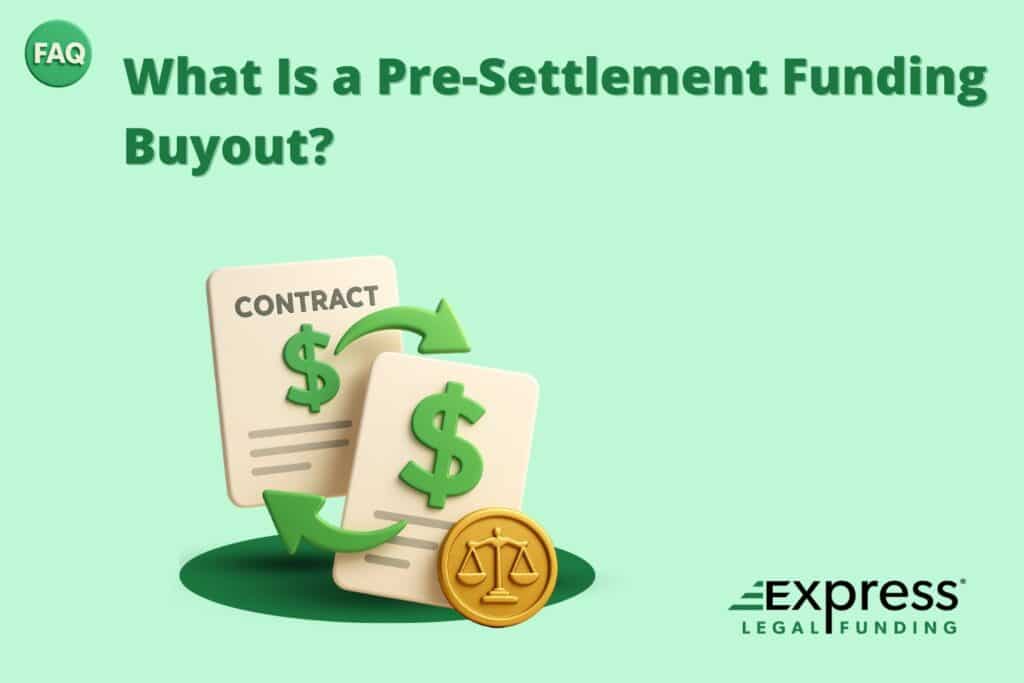
The buyout process is fairly straightforward, but it requires coordination between your attorney, your current funder, and the new funding company. Here’s the usual order of steps:
- Step 1: Apply with a new funding company.
You begin by submitting an application for additional pre-settlement funding. Since you already have an advance, the request will automatically involve a buyout. - Step 2: Payoff letter requested.
The new funder contacts your current funding company and asks for a payoff letter. This document shows the exact balance owed on your existing lien. - Step 3: Case review and approval.
While waiting for the payoff letter, the new company reviews your case details (liability, damages, insurance, and attorney cooperation). Once the payoff is confirmed, underwriters decide how much additional funding can be safely advanced. - Step 4: New contract issued.
If approved, the new funding company prepares a contract that includes paying off your old funder directly. Almost always, this contract comes with additional funds, meaning you get more money upfront beyond the payoff. - Step 5: Attorney consent and lien transfer.
Your attorney reviews and signs an acknowledgement of your additional funding, confirming that the old lien will be paid off and properly replaced by the new lien. Only then is the buyout finalized and funds disbursed.

Pre-Settlement Funding Buyout Timeline: How Long Does the Process Take?
Most buyouts finish within just a few business days. Here’s how the process usually unfolds:
- Day 1–2: The plaintiff applies with a new funding company. At the same time, the new funder requests a payoff letter from the current company to confirm the balance owed and reaches out to the attorney for case details.
- Day 2: Underwriters review the case (liability, damages, insurance coverage, and attorney cooperation) along with the payoff balance to decide if more funding is possible.
- Day 2–3: If approved, the new funding contract is sent. The plaintiff and attorney review and sign the agreement, which includes the payoff of the old lien.
- Day 3: The new company pays off the prior funder and disburses the additional funds directly to the plaintiff, completing the buyout.
Most buyouts take 3–5 business days to complete, but delays happen if the prior funder is slow to send a payoff letter.
Example Pre-Settlement Funding Buyout Scenario
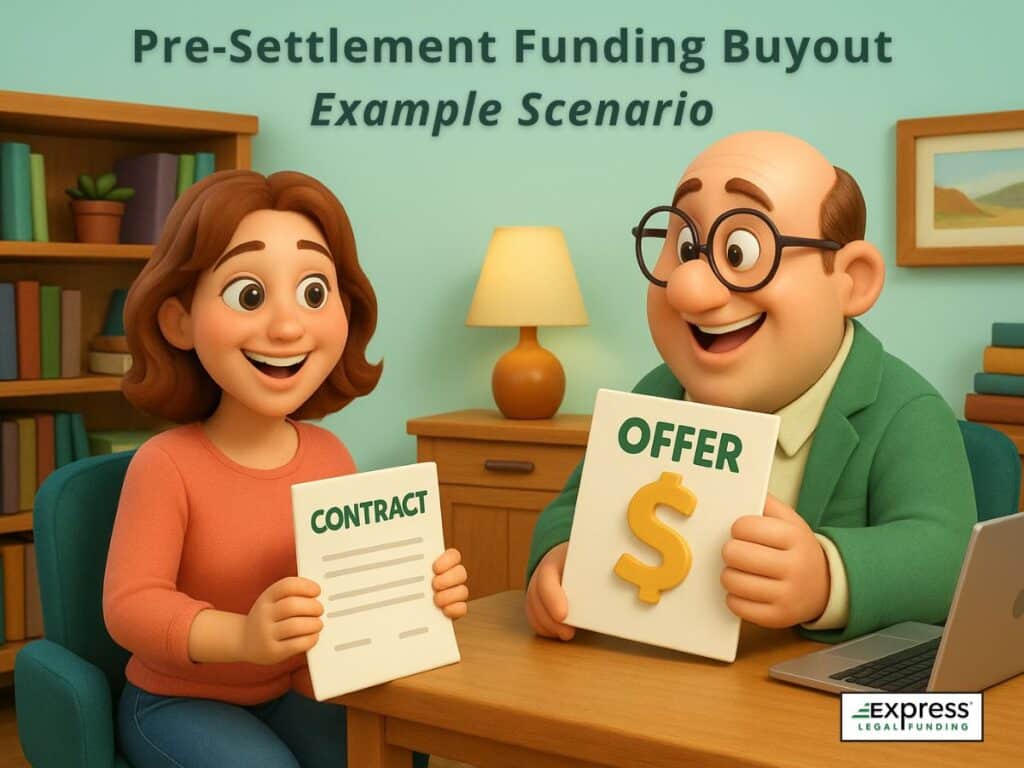
Sarah, a personal injury plaintiff, first received a $10,000 settlement advance from her original funder. Over time, fees increased her payoff balance to $12,500. A new company steps in and offers a buyout: they pay off the $12,500 owed, create a new $17,500 contract, and give Sarah an extra $5,000 in cash right away.
Her old lien is cleared, and she now has one simple agreement with better terms. This shows how a buyout can help plaintiffs lower costs, combine old funding into one contract, and still get the extra money they need while waiting for their case to settle.
Cost Comparisons: Buyout vs. Original Pre-Settlement Funding
Buyouts include more money, but they also come with a trade-off. By refinancing, the new advance is written on top of the old payoff, which means plaintiffs are now paying interest on the original funding plus its built-up fees. In this way, buyouts can have a compounding effect.
Still, savings are possible when the new agreement has lower fees or simpler terms. For example, if Funder 1 charges a $30 administrative fee every six months, that adds $60 more in costs if the case lasts another year. If Funder 2 does not charge those fees, the plaintiff saves that $60 immediately — on top of the benefit of getting more money upfront.
In short, a buyout can still lower lawsuit funding costs if the new funder has clearer terms and avoids unnecessary fees.
Underwriting Differences Between Initial Pre-Settlement Funding and Buyouts
When plaintiffs first apply for pre-settlement funding, underwriting focuses on the basics of the case. The funding company reviews liability (who was at fault), damages (injuries and losses), available insurance coverage, and whether the attorney will cooperate. From this, they decide if the plaintiff qualifies and how much can be safely advanced.
In a lawsuit loan buyout, underwriting adds extra steps. The new company still reviews the case, but also looks at the balance owed on the current funding contract. They request a payoff letter showing how much is due. From there, they calculate how much additional funding can be offered without going over a safe share of the expected settlement.
Other factors also matter. Pre-settlement funding underwriters consider policy limits on the defendant’s insurance, any medical liens that must be repaid, and the attorney’s contingent fee (usually 33–40% of the settlement). If the payoff already equals too much of the projected recovery — often around 20% or more — the plaintiff may not qualify for extra funds.
In short, initial underwriting asks if the case is strong enough to fund. Buyout underwriting checks both case strength and existing liens, along with insurance coverage and expenses, to see if more money can be advanced responsibly.
When Underwriters Decide a Buyout May Not Make Sense
Not every case is a good fit for a buyout. Underwriters may decline — or plaintiffs should think twice — if:
- High payoff balance: The amount owed is already 20% or more of the expected settlement.
- Low case value: Limited damages make the lawsuit too small for another advance.
- Large medical liens: Hospital or treatment bills must be repaid, leaving little room for funding.
- Limited insurance coverage: The defendant’s policy may not provide enough money to cover liens and new advances.
- Near settlement: If the case is close to resolving, there may not be enough time to benefit from the buyout.
Why Would Someone Consider a Pre-Settlement Funding Buyout?

Plaintiffs often turn to a pre-settlement funding buyout when their current advance is no longer working in their favor. A buyout replaces the old advance with a new contract that usually has lower costs and includes more cash upfront. Common reasons include:
- High Costs of Current Advance
Many first-time advances carry high-interest lawsuit loans or compounding fees that cause the balance to grow quickly. A buyout can lower overall lawsuit funding costs. - Better Terms from a New Company
By switching funding companies, plaintiffs can move into simpler contracts that may reduce how much they owe when the case settles. - Need for More Money
If expenses have grown, a buyout allows plaintiffs to refinance a pre-settlement loan and receive additional funds beyond the payoff. - Transparency and Trust Issues
Some companies are not clear about their terms. A buyout lets plaintiffs replace confusing agreements with a more transparent contract.
Example: John took a $7,000 advance with compounding fees, and his balance grew quickly. By getting a buyout, he lowered his future costs and received an extra $3,000 right away.
Helpful read: How to Choose a Trustworthy Legal Funding Company?
Pros and Cons of a Pre-Settlement Funding Buyout
A pre-settlement funding buyout can be very helpful, but it also has limits. Plaintiffs should look at both the advantages and drawbacks before moving forward.
Pros
- Plaintiffs almost always receive additional funds, which means more money for bills and living expenses.
- Switching to a new company can lower overall costs and reduce what is owed at settlement.
- A buyout replaces multiple liens with one agreement, making repayment simpler.
- Clearer contracts can help plaintiffs avoid high-interest lawsuit loans and confusing terms.
Cons
- Not every case qualifies, especially smaller lawsuits with limited value.
- Buyout contracts charge interest on prior interest and fees, creating a compounding effect.
- Some buyouts include small administrative or lien transfer fees.
- State laws may restrict or ban buyouts in certain situations.
Relevant read: What Are the Pros and Cons of Pre-Settlement Funding?
How Does a Buyout Affect Your Case and Court Settlement?
A pre-settlement funding buyout does not change how your lawsuit is argued in court, but it does change the financial side of your case.
- Attorney’s Role: Every buyout requires your lawyer’s approval. They review the payoff amount, sign off on the new contract, and make sure funds will be distributed properly when the case resolves. Without this step, the buyout cannot move forward.
- Lien Replacement: Once the new funder pays your old company, that lien is satisfied and replaced with a new one. Only one lien remains on your case, which prevents disputes or multiple claims at settlement.
- Settlement Distribution: Courts and attorneys follow a set order when dividing settlement money. First, the attorney’s contingent fee (often 33–40%) and statutory medical liens (like Medicaid or state-funded hospital bills) are paid. Next, the funding lien is repaid based on the new contract. Whatever remains goes to the plaintiff.
In short, a buyout simplifies liens, keeps your attorney in control, and ensures courts can distribute the settlement smoothly and fairly.
State Rules Requiring Buyouts of Pre-Settlement Funding Contracts
Not all states treat pre-settlement funding buyouts the same way. In some places, like Missouri and Illinois, the law requires that a new funding company pay off the prior lien before advancing more money. This protects both plaintiffs and the courts from confusion about who should be repaid first.
There is one exception: if both funding companies agree in writing, the new company can provide funding without first buying out the old lien. Without this written agreement, a buyout is mandatory.
For plaintiffs, this means:
- You usually can’t stack multiple legal funding liens in states like Missouri and Illinois.
- A new advance will almost always come through a buyout, which clears the old lien.
- Your attorney will need to confirm the lien replacement or written agreement before the new funds are released.
These rules are designed to simplify settlement distribution, reduce disputes between funders, and make sure plaintiffs receive a fair share of their recovery.
Relevant read: How Many Pre-Settlement Loans Can You Get?
Why Legal Funding Companies Buy Out Prior Pre-Settlement Advances
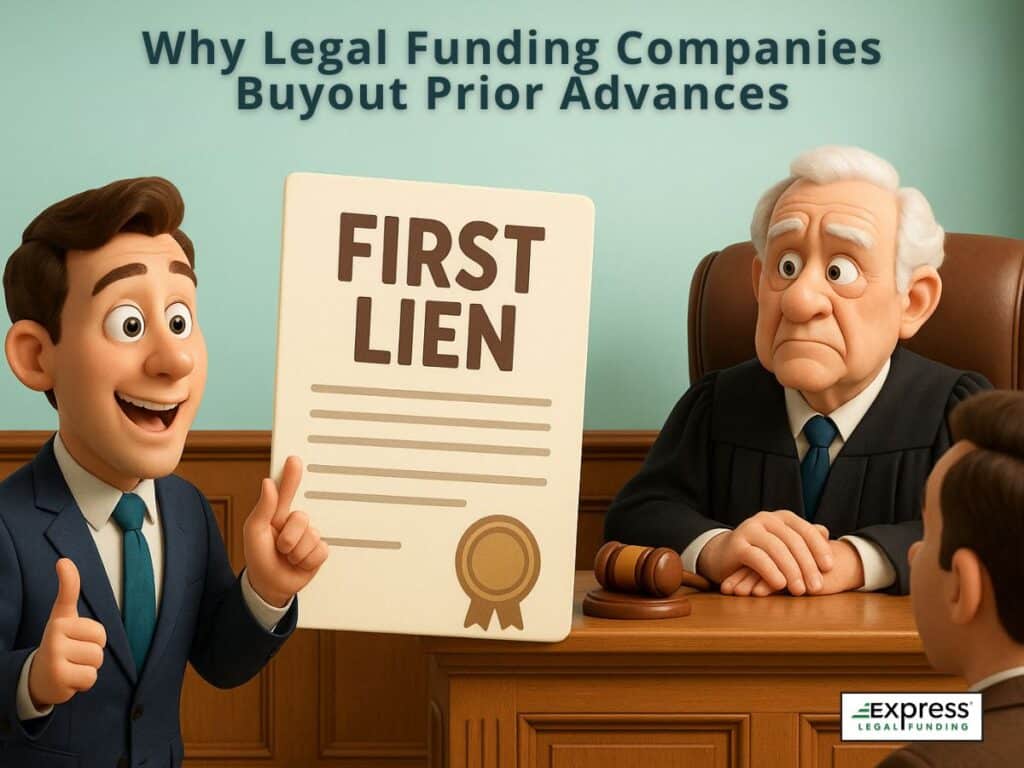
Legal funding companies often offer buyouts so they can take the first lien position on a case. First lien means they are first in line to be paid back from the settlement before any other funding companies.
Courts and attorneys always consider lien priority when dividing settlement money. An attorney’s contingent fee and required medical liens (like Medicaid or state-funded hospital bills) are paid first. After that, funding liens are repaid. If more than one funder has a lien, it can create disputes and reduce how much the plaintiff takes home.
A buyout helps solve this. The new funder pays off the old one and becomes the only lienholder. This clears up confusion, reassures the court that liens are in order, and usually gives the plaintiff additional funds under one simpler contract.
In short, companies buy out prior lawsuit cash advances to protect their repayment rights and to make settlement distribution cleaner and fairer for everyone.
Alternatives to a Pre-Settlement Funding Buyout
A buyout is often the best way for plaintiffs to get more money and lower high costs, but it’s not the only option. Here are some common alternatives to lawsuit loans:
- Renegotiating with Your Current Funder
Some companies may agree to reduce rates or adjust repayment terms to keep your business. However, this is less common and not always successful. - Personal Loan or Credit Line
Traditional bank loans or credit cards can offer lower rates, but they require good credit and steady income. Unlike non-recourse legal funding, you must pay them back even if you lose your case. - Family or Crowdfunding
Borrowing from relatives or raising money online can help without creating legal contracts. Still, these options may not be realistic or enough to cover ongoing expenses.
Compared to these choices, a buyout gives plaintiffs the chance to refinance a pre-settlement loan, receive additional funds, and move into a clearer, more manageable contract without relying on credit scores or personal relationships.
Express Legal Funding’s Approach to Buyouts
At Express Legal Funding, we know plaintiffs often look for buyouts when their first advance becomes too costly or their funder won’t provide more money. That’s why our approach is built on fairness, clarity, and putting your needs first.
- Transparency: We avoid confusing contracts and hidden fees. Our terms are simple and explained up front.
- Extra Funds Included: Nearly every buyout we approve comes with more money, giving you the cash you need right away while paying off your old lien.
- Risk-Free Guarantee: Repayment is only required if you win or settle your case. If you lose, you owe nothing.
- Direct Funding Advantage: We work directly with clients — no brokers or middlemen — which keeps your costs lower.
By choosing Express Legal Funding, plaintiffs can refinance an expensive advance, access additional funds, and feel confident they’re working with a company focused on honesty and affordability.
FAQs About Pre-Settlement Funding Buyouts
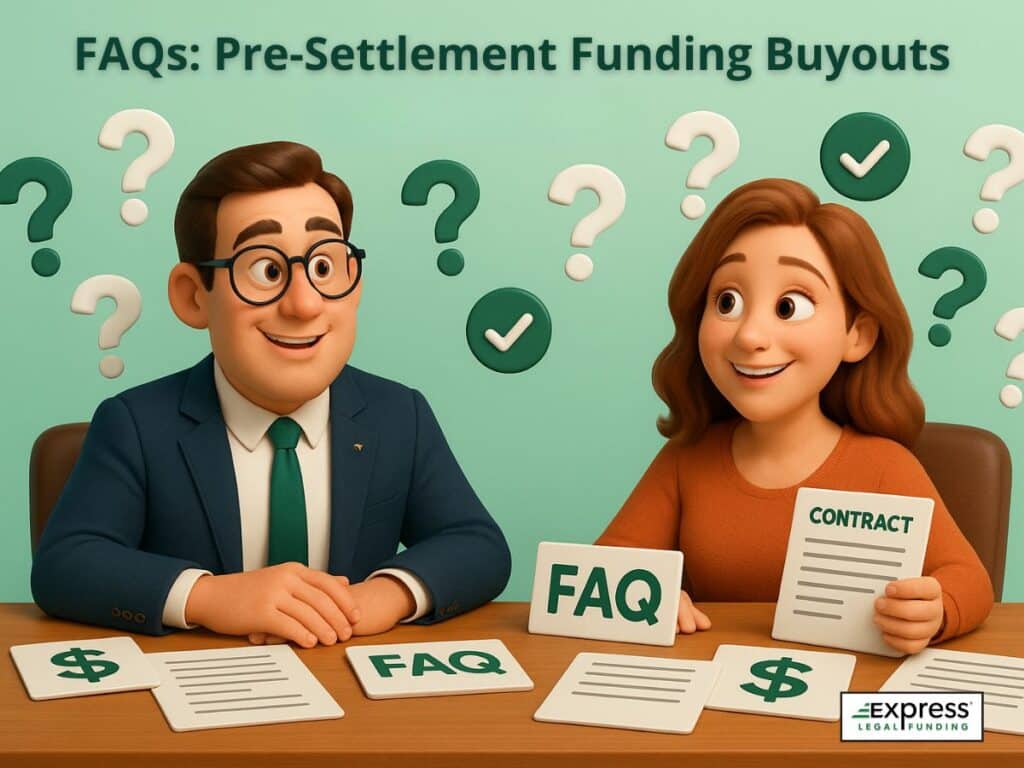
If you’re thinking about a buyout for your pre-settlement funding, you probably have a few questions. Here are clear answers to the questions plaintiffs ask most often.
Will I always get more money with a pre-settlement funding buyout?
Yes. A buyout includes additional funds beyond paying off your old advance. The new funding company clears your current lien and issues a new contract that gives you extra cash upfront. The exact amount depends on your case value and how much funding you have already received.
What is a payoff letter for pre-settlement funding?
A payoff letter is a document your current legal funding company sends that shows exactly how much you owe on your existing advance. It includes the principal, accrued fees, and any charges due. The new funding company uses this letter to pay off the old lien during a buyout, ensuring the lien is properly cleared and replaced.
Do I owe both lawsuit loan companies if I get a buyout?
No. In a buyout, the new lawsuit loan company pays off your old funder directly. This clears the previous lien, so only one lien remains on your case. Your attorney confirms the lien transfer, making sure you never owe money to two funding companies at the same time.
Does a pre-settlement funding buyout cost money upfront?
No. Plaintiffs never pay out-of-pocket for a buyout. The new funding company handles the payoff to your old funder, and any costs are built into the new contract. This allows you to refinance your advance and receive additional funds without worrying about upfront fees or surprise charges.
Are pre-settlement funding buyouts allowed in every state?
Not always. Some states limit or ban lawsuit loan buyouts. For example, in Illinois, buyouts are not allowed if the balance owed is over $100,000. Whether a plaintiff qualifies depends on state laws, the case details, and attorney cooperation. Express Legal Funding can review your situation and confirm if a buyout is allowed where you live.
How long does a pre-settlement funding buyout take?
Most buyouts finish in just a few days after approval. The new funder gets a payoff letter, completes underwriting, and issues a contract. They then pay off the old lien and send you the additional funds. Timing depends on how quickly your old funder and attorney provide the required documents.
Can my attorney refuse a pre-settlement funding buyout?
Yes. Every buyout requires your attorney’s approval. Your lawyer must agree to the lien transfer and confirm how settlement money will be distributed. If your attorney feels the buyout is not in your best interest, they can refuse to sign. Reputable companies like Express Legal Funding work closely with attorneys to make sure terms are fair.
Relevant read: Can My Lawyer Stop Me From Getting Pre-settlement Funding?
What is the collateral in a pre-settlement funding buyout?
Your future settlement is the collateral in a pre-settlement funding buyout. Unlike loans backed by cars or houses, legal funding is non-recourse, which means you only repay if you win or settle your case. If you lose, you owe nothing and keep your personal assets protected.
Does Express Legal Funding buy out pre-settlement funding contracts?
Yes. Express Legal Funding funds many pre-settlement buyouts, completing dozens every month. We pay off your old advance, clear the lien, and provide a new contract with extra funds upfront — making repayment simpler and often more affordable.
Take the Next Step With Express Legal Funding
If your current settlement advance is too costly or your funder won’t give you more money, a pre-settlement funding buyout may be the answer. At Express Legal Funding, we help plaintiffs refinance with clear terms, lower costs, and additional funds to cover everyday expenses.
We work directly with your attorney to make the process quick and stress-free. Repayment is only required if you win or settle — and with our direct funding advantage, you keep more of your settlement.
Don’t stay stuck in an expensive contract. Contact Express Legal Funding today to learn how a buyout can give you more money now and peace of mind for the future.
📞 Call us today at (888) 232-9223 or apply online to get your pre-settlement funding buyout started.
Apply Now for a Pre-Settlement Funding Buyout
Additional Pre-Settlement Funding FAQ Guides
No. Pre-settlement funding does not affect your credit score because it isn’t a loan and isn’t reported to credit bureaus such as Experian, Equifax, or TransUnion. It’s a non-recourse cash advance, meaning repayment is only required if your case wins or settles. With no credit checks, monthly payments, or debt reporting, your credit file stays completely unaffected, making legal funding a credit-neutral option for plaintiffs awaiting settlement.
Pre-settlement funding (also known as lawsuit funding or legal funding) provides crucial financial support for plaintiffs awaiting a lawsuit settlement. It helps cover everyday expenses and bills during the legal process, offering relief when compensation is still pending.
Naturally, many people wonder how pre-settlement funding might affect their credit.
A common question applicants have is: Will this show up on my credit report or lower my credit score?

Will Pre-Settlement Funding Affect My Credit Score?
The short answer: No. Pre-settlement funding does not affect your credit score and isn’t reported to credit bureaus like Experian, Equifax, or TransUnion. It’s a non-recourse cash advance based on the strength of your case — not your credit — meaning your credit file stays completely unaffected.
This guide explains why pre-settlement funding doesn’t impact your credit—according to both legal standards and industry best practices—and answers the most common questions applicants have about credit checks, credit reporting, and repayment obligations.

Is Pre-Settlement Funding Reported to Credit Bureaus?
No. Pre-settlement funding is structured as a non-recourse advance, meaning repayment is only required if your case results in a settlement or judgment. This arrangement is not classified as consumer debt under most state and federal lending laws.
Because it’s not debt in the traditional loan sense:
- Legal funding companies do not submit information to credit reporting agencies.
- No new “account” appears in your credit file.
- There is no monthly reporting of balances, payments, or delinquencies.

Legal Basis
States generally treat consumer legal funding as a non-recourse purchase, not a loan.
For example, in Missouri, the law clearly states that a compliant legal funding contract is not a loan and isn’t subject to lending laws (RSMo §436.564).
Under the Fair Credit Reporting Act (FCRA), there’s no legal duty to report; reporting duties apply only to companies that voluntarily furnish data to credit bureaus.
Can Pre-Settlement Funding Lower My Credit Score?

No — getting pre-settlement funding will not lower your credit score.
Credit scores are calculated from:
- Payment history
- Amounts owed (credit utilization)
- Length of credit history
- New credit (inquiries)
- Credit mix
Pre-settlement funding does not interact with any of these factors because:
- It’s not revolving or installment credit.
- There are no monthly payments to record.
- There is no default reporting if your case loses — repayment is waived entirely.
Learn more in our guide: Does Pre-Settlement Funding Require Monthly Payments?
Example:
If you receive $10,000 in legal funding and your case ultimately fails, the contract ends with no repayment required and no entry on your credit file. Compare that to a $10,000 bank loan — missed payments would be recorded as late, damage your score, and possibly trigger legal collections.
Do Legal Funding Companies Perform Credit Checks?
Typically, no. Most reputable pre-settlement funding companies base approval solely on:
- Strength of your case
- Estimated settlement amount
- Documentation from your attorney
This means they do not need — or request — your credit history.
Soft vs. Hard Credit Inquiry
- Soft inquiry: A background review that doesn’t affect your score and isn’t visible to prospective lenders.
- Hard inquiry: A full credit pull that can lower your score by a few points and is visible to lenders for up to two years.
In the rare instance a legal funding company does check credit, it’s almost always a soft inquiry — meaning zero impact on your credit score.
What’s the Difference Between Pre-Settlement Funding and a Loan for Credit Impact?
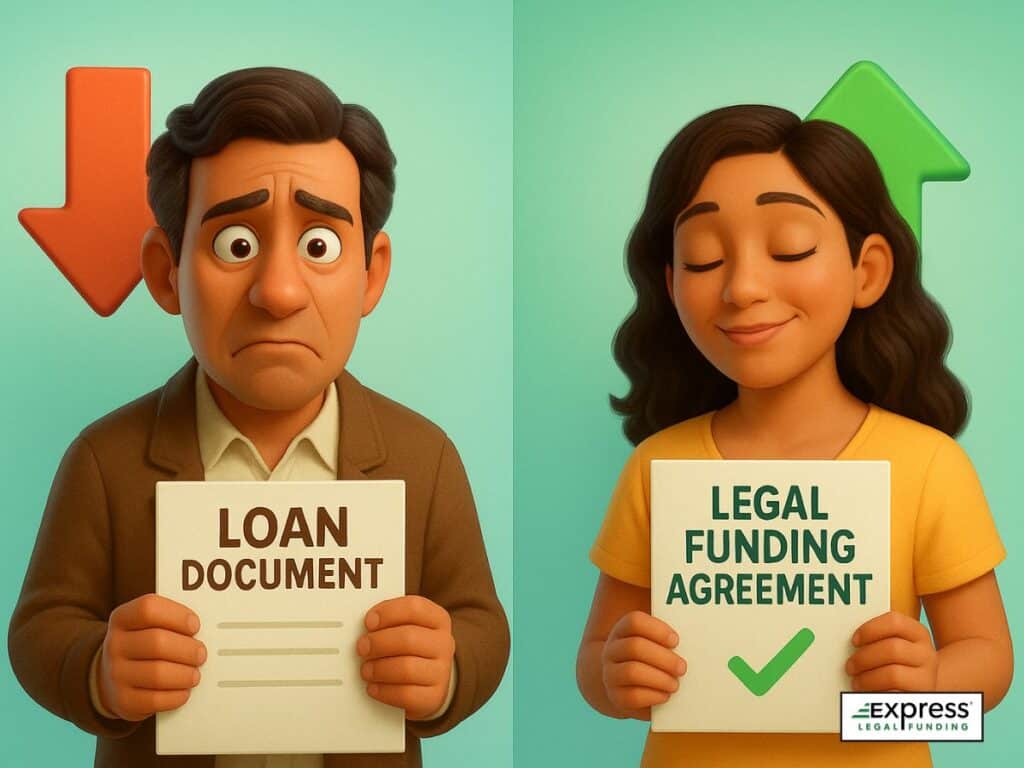
The table below compares pre-settlement funding, personal loans, and credit card cash advances to show how each option affects your credit score, reporting, and repayment obligations.
[ninja_tables id="23279"]
Key difference: A traditional loan or cash advance creates enforceable repayment regardless of circumstances, and any missed payments are reported, damaging your credit. Legal funding ends with your case outcome — no collection activity, no damage to your score.
If I Don’t Win My Case, Can the Legal Funding Company Hurt My Credit?

No. If you lose your case, the legal funding company cannot damage your credit or pursue repayment. Pre-settlement funding is a non-recourse funding agreement, meaning repayment only applies if you win or settle.
Here’s what that means:
- No collections: The company can’t send your account to debt collectors.
- No liens or wage garnishment: They have no right to your property or income.
- No credit reporting: Nothing is added to your credit file or history.
These legal safeguards ensure that losing your case never affects your credit or financial standing.
Will Pre-Settlement Funding Affect My Ability to Get Future Loans or Lines of Credit?
No. Pre-settlement funding does not directly affect your ability to get future loans or credit. It isn’t reported to credit bureaus, and no inquiry or balance appears on your credit file, so lenders can’t see the transaction.
However:
- Indirect impact: Using the funds to pay overdue bills can actually improve your credit profile over time.
- Disclosure: You don’t need to disclose legal funding unless a lender specifically asks in a financial form.
Is Pre-Settlement Funding the Same as a Cash Advance?
No. Pre-settlement funding is not the same as a cash advance, and the difference matters for your credit.
Here’s the difference:
- Cash advance: Borrowed against your credit card limit, increases credit utilization, and must be repaid with interest. Late or missed payments can lower your credit score.
- Pre-settlement funding: Based solely on your pending lawsuit’s potential value. It isn’t linked to your credit cards, isn’t reported to credit bureaus, and has no impact on your credit score.
In short, pre-settlement funding offers quick access to cash without risking your credit health.
Scenario Analysis for Clarity
Scenario A: Loan Application
You apply for a personal loan:
- Bank makes a hard inquiry → credit score drops slightly.
- Loan appears on report → affects credit utilization & mix.
- Missed payments → late marks damage score.
Scenario B: Pre-Settlement Funding
You apply for legal funding:
- The company evaluates your case via your attorney → no bureau involvement.
- No impact on utilization, payment history, or inquiries.
- Case fails → obligation ends, no change to credit score.
Outcome: Only Scenario A touches your credit report or credit score.
As you can see, legal funding stays completely separate from traditional credit systems.
Closing Key Points
- Pre-settlement funding is credit-neutral.
- No bureau reporting, no hard inquiry in standard practice.
- Non-recourse structure means no personal liability if your case fails.
- Strong option for plaintiffs who need immediate help without jeopardizing their credit profile.
Helpful guide: 15 Alternatives to Lawsuit Loans
Common Questions About Whether Pre-Settlement Funding Affects Your Credit Score
Is pre-settlement funding reported to credit bureaus?
No. Pre-settlement funding is not reported to any credit bureau, including Experian, Equifax, or TransUnion. That’s because it’s structured as a non-recourse cash advance, not a loan or debt under federal or state lending laws. Since no repayment is owed if your case doesn’t settle, there’s no credit account or balance to report — meaning your funding agreement remains completely off your credit file.
Can legal funding lower my credit score?
No. Legal funding has no negative impact on your credit score because it doesn’t involve traditional loan elements like monthly payments, interest accrual, or default reporting. Credit scores are based on factors such as payment history, utilization, and new credit inquiries — none of which apply here. Even if your case doesn’t succeed, the funding is forgiven, and no negative mark appears on your credit report.
Do lawsuit funding companies run credit checks?
Most reputable lawsuit funding companies do not perform credit checks. Instead, they evaluate your eligibility based on the strength and potential value of your lawsuit. In rare cases where a credit review is needed for identity verification, it’s done through a soft inquiry, which does not affect your credit score or appear to future lenders. Approval is determined by your attorney’s case documentation, not your credit history.
Relevant read: Do Pre-Settlement Funding Companies Require Credit Checks?
Get Credit-Safe Pre-Settlement Funding Today with Express Legal Funding
Waiting for your settlement doesn’t have to strain your finances. At Express Legal Funding, we provide risk-free, non-recourse pre-settlement funding that never affects your credit score. There are no credit checks, upfront costs, or hidden fees — just fast, transparent financial support when you need it most.
🟢 Apply online or call us now at (888) 232-9223 to get cash today and stay financially secure while your case moves forward.
Additional FAQ Guides
No. Pre-settlement funding is non-recourse, meaning you repay only if your lawsuit results in a settlement or court award. If the case is lost with no recovery, you owe nothing out of pocket. At Express Legal Funding, our agreements are non-recourse and follow this same rule.
Losing a lawsuit is stressful enough—worrying about having to repay pre-settlement funding shouldn’t add to that burden. Pre-settlement funding is a non-recourse cash advance designed to reduce financial pressure while your case is ongoing.
Do you have to pay pre-settlement funding back if you lose your legal claim?
The FAQs below explain what “non-recourse funding” means, what happens if you lose your case, and when repayment is required, so you can understand your options with confidence.
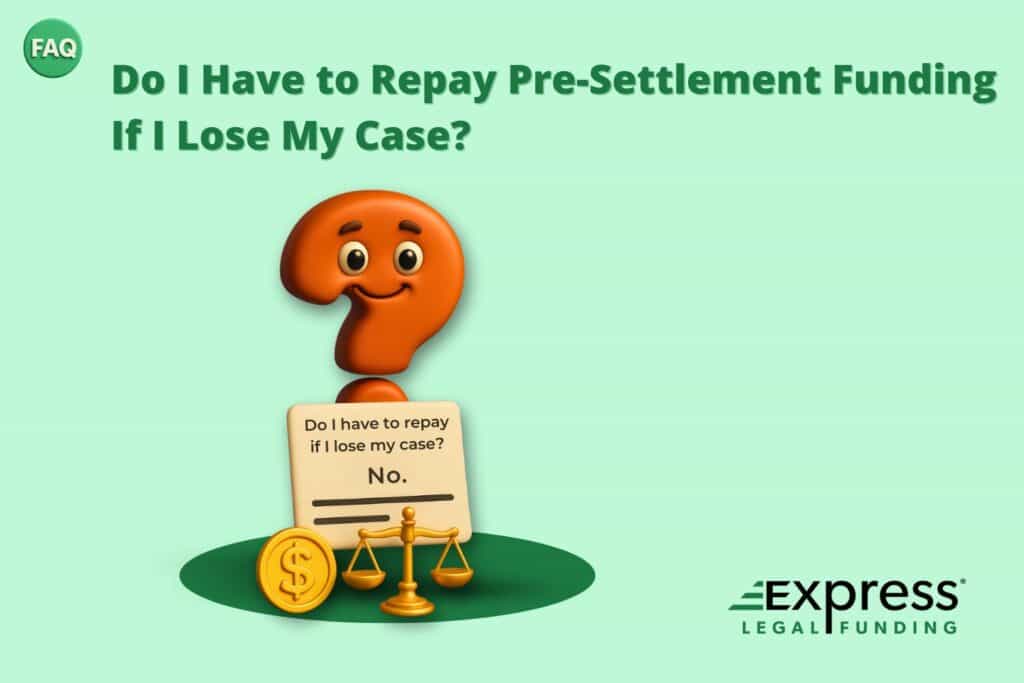
What happens if I lose my case after getting legal funding?
If you lose your case, the pre-settlement funding is simply written off. Because legal funding is non-recourse, you do not owe repayment, your attorney is not responsible, and no debt or credit obligation is created—unless there was fraud or a contract violation.
What is pre-settlement funding?
Pre-settlement funding is a form of legal financing provided to plaintiffs during active litigation, like personal injury lawsuits. It helps cover living expenses while waiting for a lawsuit to resolve. Unlike loans, repayment depends entirely on the outcome of the legal claim, not the borrower’s credit or income.
What does non-recourse pre-settlement funding mean?
Non-recourse pre-settlement funding means repayment is conditional. If your lawsuit results in a settlement or judgment, repayment occurs from the proceeds. If there is no recovery, the funding company cannot pursue you personally or report unpaid amounts as debt.
Non-recourse funding means:
- No repayment if the case is lost
- No personal liability for the plaintiff
- No obligation without a settlement or judgment
- Risk is assumed by the funding company
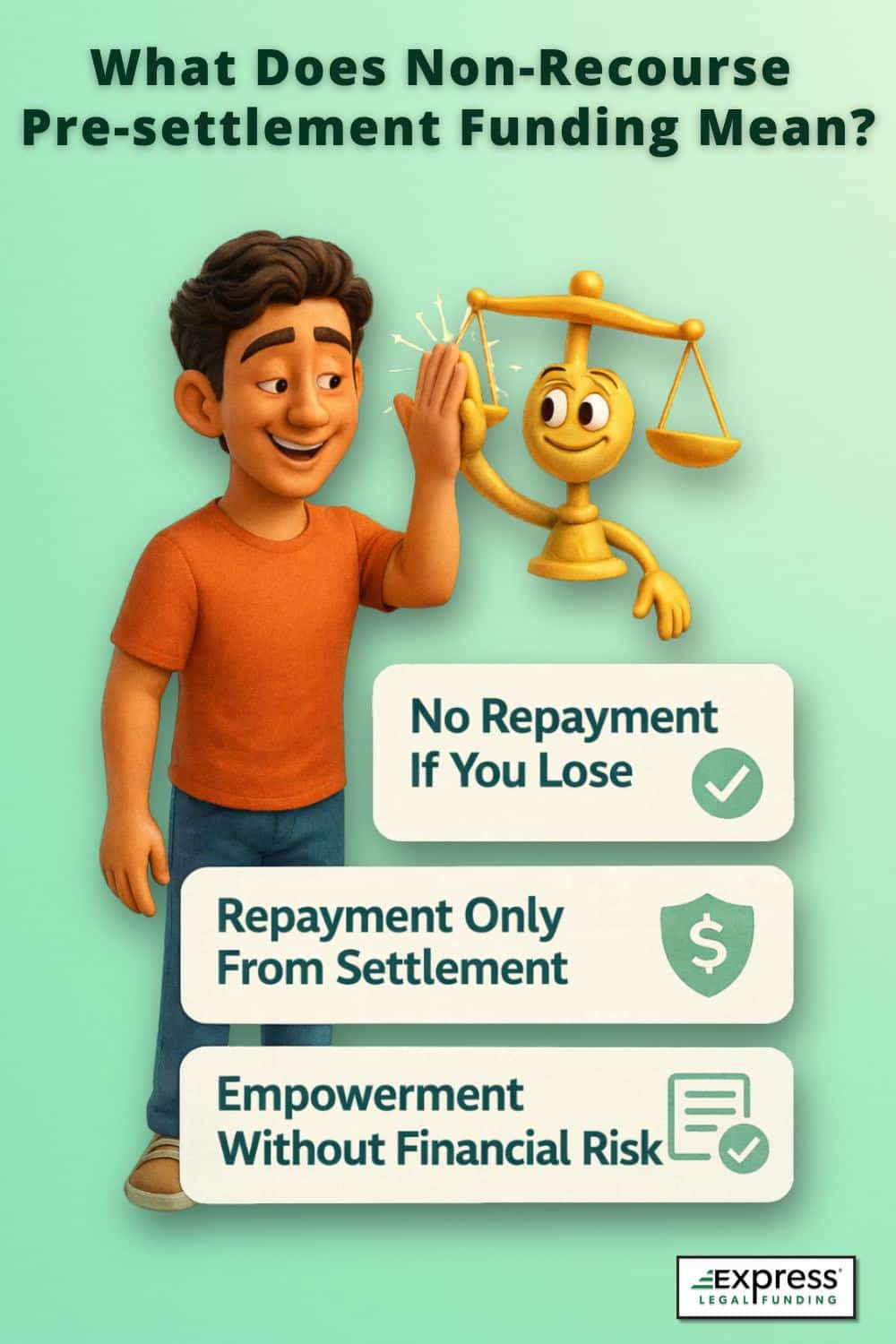
Learn more with our guide on how non-recourse legal funding works.
When do you have to repay pre-settlement funding?
You repay pre-settlement funding only after your case settles or you receive a court award. Repayment is typically made directly from the settlement proceeds at the conclusion of your case. There are no monthly payments, and no repayment is required while the case is ongoing.
Example scenario: How repayment works in real life
Let’s say you receive a $3,000 pre-settlement advance while waiting for your car accident lawsuit to resolve. Six months later, your attorney negotiates a $30,000 settlement.
After attorney fees and case costs, the legal funding advance is repaid directly from your portion of the settlement.
If the case were lost, you wouldn’t owe anything back to Express Legal Funding.

Does pre-settlement funding accrue interest?
It depends. Pre-settlement funding isn’t a traditional loan, but the amount owed can increase over time based on the funding agreement’s pricing (for example, a monthly use fee or a simple-rate fee). You typically owe nothing unless you recover through a settlement or court award, so review the contract terms carefully.
Learn more about how much pre-settlement funding costs.
Is pre-settlement funding the same as a loan?
No. Pre-settlement funding is not a loan. Loans require repayment regardless of outcome and often involve interest rates and credit checks. Pre-settlement funding is a non-recourse cash advance, meaning repayment depends solely on whether your legal claim succeeds.
Does pre-settlement funding affect my credit score?
No. Pre-settlement funding does not affect your credit score or credit history. Express Legal Funding does not perform hard credit checks and does not report to credit bureaus. Approval is based on the strength of the lawsuit, not the plaintiff’s financial profile.
Relevant reads:
- Does Pre-Settlement Funding Affect Your Credit Score?
- Do Pre-Settlement Funding Companies Require Credit Checks?
Are there any exceptions where I could owe money?
Yes, but they are limited. Repayment may be required in cases of fraud, intentional misrepresentation, or a material breach of the funding agreement. If you are truthful and follow the agreement, you generally don’t have to worry about owing money if you lose your case.
Outside of these situations, losing your case does not create personal liability or debt under a non-recourse funding contract.
Exceptions may involve:
- Fraud or intentional misrepresentation
- Material breach of the funding agreement
How is pre-settlement funding repaid if I win my case?
If you win or settle your case, repayment is made from the settlement proceeds. The funding company typically places a lien on the case, which your attorney resolves during the settlement distribution process before remaining damages are paid to you.

Settlement proceeds are often distributed in this order:
- Attorney fees and case costs
- Legal funding payoff
- Medical liens and other liens
- Remaining settlement money is paid to the plaintiff
Exact lien priority can vary based on the case, state law, and negotiated lien reductions.
Does my attorney have to repay the funding if I lose?
No. Your attorney is not personally responsible for repayment if the lawsuit is unsuccessful. The repayment obligation applies only to settlement or judgment proceeds. If there is no recovery, neither the plaintiff nor the attorney owes repayment.
What happens if I settle for less than expected?
If your case settles for less than expected, repayment comes only from the settlement proceeds. You are never required to pay out of pocket. After attorney fees, case costs, and the legal funding payoff are resolved, any remaining funds go directly to you.
Key points to remember:
- Repayment comes only from settlement proceeds
- No out-of-pocket payment is required
- A lower settlement does not create personal debt
Scenario: Settling for less than expected
Emily receives $5,000 in pre-settlement funding while her personal injury lawsuit is ongoing. She and her attorney originally expected a larger settlement, but the case ultimately settled for less than anticipated due to liability disputes.
When the case resolves, the funding repayment is made only from the settlement proceeds, after attorney fees and case costs. Emily is not required to pay anything out of pocket, even though the settlement amount was lower than expected.
How do I know if a legal funding company is truly non-recourse?
A legitimate non-recourse legal funding company makes it clear that repayment is required only if you recover compensation. Look for “no win, no repayment” and “if you lose your case, you owe nothing” language, no personal guarantees, and attorney-coordinated repayment. Express Legal Funding’s contracts clearly define these protections in writing.
Look for:
- “No win, no repayment” language
- “Not a loan” language
- No personal guarantee requirement
- Attorney-managed repayment process
- Transparent terms, like those in Express Legal Funding’s non-recourse agreements
What types of lawsuits qualify for pre-settlement funding?
Pre-settlement funding commonly applies to personal injury cases, motor vehicle accidents, wrongful death claims, and other civil litigation involving damages such as medical expenses, lost wages, pain and suffering, or punitive damages. Case eligibility depends on liability and expected settlement.
How Express Legal Funding protects plaintiffs if a case is lost
Express Legal Funding provides true non-recourse pre-settlement funding. If litigation ends without a settlement or court award, the plaintiff owes nothing. There are no risky loans, no credit risk, no personal guarantees, and no repayment unless the case successfully resolves.
Visit the Express Legal Funding homepage to learn more about how we help clients stay financially secure during their lawsuits.
No. Pre-settlement funding is legal in most U.S. states, but not all. Laws vary by state, and while many states allow legal funding with few restrictions, others regulate it heavily or limit certain agreements. Because pre-settlement funding is regulated primarily at the state level, rules can vary widely depending on where you live or where your case is filed. Some states allow it with few restrictions, while others impose consumer protections or limit certain agreements.
Because pre-settlement funding is regulated at the state level, many people ask who actually sets the rules. The video below explains how state laws, federal law, and courts each play a role.
The FAQs below explain how state and federal rules apply to pre-settlement funding (sometimes referred to as “lawsuit loans”), why some states limit certain funding agreements, and how to check whether funding is available for your case.

Is pre-settlement funding regulated under federal law?
No. There is no single federal law that directly regulates pre-settlement funding. Instead, regulation is handled at the state level through statutes, court decisions, and consumer protection rules. Because of this, legality, requirements, and availability can vary widely depending on the plaintiff's state of residence or where a case is filed.
Legality of Pre-Settlement Funding by State

Why is pre-settlement funding illegal in some states?
Some states restrict pre-settlement funding to prevent high costs or unfair terms, or because they treat certain agreements as loans under lending laws. Others rely on older doctrines like champerty and maintenance, and some courts have found certain contracts unenforceable. That’s why rules vary by state, and funding may be limited or unavailable in some places.
What states have laws regulating pre-settlement funding?
Several states have enacted laws that regulate pre-settlement funding agreements, often called consumer legal funding statutes. These regulations may require specific disclosures, impose rate or fee limits, or provide cancellation periods.
States with Pre-Settlement Funding Laws

The states with laws regulating pre-settlement funding include:
- Arkansas
- California
- Georgia
- Illinois
- Indiana
- Maine
- Missouri
- Montana
- Nebraska
- Nevada
- New York
- Ohio
- Oklahoma
- Tennessee
- Utah
- Vermont
- West Virginia
- Wisconsin
Although Arkansas and West Virginia have statutes addressing legal funding, their requirements and rate caps are highly restrictive, making pre-settlement funding unavailable or impractical for many providers in practice.
Regulatory requirements vary by state and may also classify certain agreements under existing consumer or lending laws.
Which states restrict or limit pre-settlement funding?
It depends on the contract structure and how each state’s laws are interpreted. The states that restrict or prohibit pre-settlement funding arrangements include Arkansas, Colorado, Kentucky, Maryland, North Carolina, and West Virginia. Because laws and court interpretations can change, it’s important to confirm current eligibility with your attorney.
Which states do not have consumer legal funding laws but treat pre-settlement funding as not a loan?
Some states do not have a consumer legal funding statute, but courts have held that non-recourse pre-settlement funding is not a loan because repayment is contingent on the outcome of the case. As a result, consumer lending laws may not apply in the same way they do to standard loans. These states include:
- Florida
- Michigan
- Minnesota
- Texas
Even in these states, pre-settlement funding agreements remain subject to contract law and court-enforceability standards. Laws and legal interpretations can change, so it’s important to confirm with your attorney how state rules apply to your specific pre-settlement funding agreement.
How am I protected if my state doesn’t have specific pre-settlement funding laws?
If your state doesn’t have a specific legal funding law, protections can still come from contract law, court oversight, and attorney involvement.
In addition, reputable providers often follow best practices promoted by organizations such as the American Legal Finance Association (ALFA), the Alliance for Responsible Consumer Legal Funding (ARC), and Legal Funders for Actually Fair Funding (LFAFF), which emphasize transparency, fairness, and ethical standards.
How can I check if pre-settlement funding is legal in my state?
Start by asking your attorney, since state rules can come from statutes and court decisions. Next, ask the funding company what state-specific requirements apply and request written disclosures and payoff examples. If the company can’t clearly explain legality, licensing (if applicable), or contract terms, treat that as a red flag.
Do pre-settlement funding laws change over time?
Yes. States can pass or update laws, regulators can issue guidance, and courts can change how they interpret legal funding agreements. That’s why older articles may be outdated and why it’s smart to confirm current rules in your state before relying on any single source. When in doubt, ask your attorney to verify.
What Pre-Settlement Funding Is and How It Works
Definition: What Is Pre-Settlement Funding?
Pre-settlement funding is a form of financial assistance available to plaintiffs who are waiting for a lawsuit to resolve. It provides a cash advance based on the expected value of a settlement or judgment, allowing plaintiffs to cover living expenses while their case is pending. Repayment usually comes from the case proceeds if the plaintiff wins or settles.
Non-Recourse vs. a Traditional Loan
Pre-settlement funding is typically non-recourse, meaning repayment depends entirely on the outcome of the case. If the plaintiff loses and recovers nothing, they usually do not have to repay the advance. This structure is different from a traditional loan, which requires repayment regardless of outcome and is governed by standard lending laws.
Relevant read: What Is Non-Recourse Legal Funding?
Why Some States Classify It as Lending

Some states treat certain pre-settlement funding agreements as loans, especially when they resemble traditional credit products, such as those requiring credit checks or include features like fixed repayment obligations. When courts or lawmakers view funding as lending, consumer lending laws—such as interest rate caps or licensing requirements—may apply. This classification can significantly affect how funding is offered in those states.
Relevant read: Does Pre-Settlement Funding Require Monthly Payments?
How State Law Affects Borrowers
Is pre-settlement funding considered a loan?
No. Pre-settlement funding is usually not a traditional loan. It is a non-recourse cash advance based on your expected settlement. You repay it only if you win or settle your case. If you lose, you typically owe nothing. Because repayment depends on the case outcome, some courts say consumer lending laws may not apply the same way they do to standard loans.
How does state law affect the cost of pre-settlement funding?
State law can significantly affect cost. In states with consumer legal funding regulations, laws may require disclosures, limit fees, or impose rate caps. In states with fewer rules, pricing is more market-driven. That’s why costs can vary by state and provider, making it important to review payoff examples and contract terms carefully.
Relevant read: How Much Does Pre-Settlement Legal Funding Cost?
Can I get pre-settlement funding if my state restricts it?

Sometimes. A state restriction does not always mean funding is impossible. Availability often depends on how the contract is structured, applicable court rulings, and whether the funding complies with state law. In restricted states, attorney involvement is especially important to determine whether a legal funding agreement is permitted for your case.
Attorney Involvement and Lawsuit Impact
Do I need my attorney’s approval to get pre-settlement funding?
In most cases, yes—even if your state’s law doesn’t explicitly require it. Reputable pre-settlement funding companies typically need your attorney’s cooperation to verify case details and coordinate repayment from settlement proceeds. Attorney involvement also helps ensure the agreement is accurate, ethical, and does not interfere with your legal strategy or settlement decisions.
Relevant read: Do I Need a Lawyer to Get Legal Funding?
Does pre-settlement funding affect my lawsuit or settlement?
No. Pre-settlement funding should not affect how your lawsuit is handled, aside from providing temporary financial relief while your case is pending. Reputable legal funding companies cannot control your case, your attorney, or settlement decisions—and some state laws explicitly prohibit funders from influencing litigation.
Because funding costs can increase over time, it’s important to borrow only what you need and understand how repayment grows if your case takes longer than expected.
What happens if I lose my case?
If your funding agreement is non-recourse, you typically do not repay anything if you lose your case and recover no settlement or judgment. This is a key difference between pre-settlement funding and traditional loans. Always confirm that non-recourse terms are clearly stated in your agreement before accepting funding.
Conclusion: How to Verify Eligibility and Find Safe, Legal Funding
Summary of legality
Pre-settlement funding is legal in most U.S. states, but not all. Because there is no single federal law governing legal funding, each state sets its own rules through statutes, court decisions, and consumer protection standards. That’s why eligibility and availability depend on where your case is filed and how the funding agreement is structured.
Final advice
Before you move forward, involve your attorney and confirm what rules apply in your state. Review written disclosures, request payoff examples, and make sure the agreement is truly non-recourse. If a funding company can’t clearly explain its terms, costs, and compliance approach, treat that as a red flag.
Apply with Express Legal Funding to Get Pre-Settlement Funding
If you need financial support while your case is pending, Express Legal Funding offers transparent, non-recourse pre-settlement funding with attorney coordination and clear payoff disclosures. You can apply online or call us at (888) 232-9223 to start a free review—and we’ll work directly with your attorney to confirm case details and explain your options based on the rules that apply to your lawsuit.
Legal Citations: State Statutes (Full Reference List)
State statutes referenced in this guide (for readers who want the source text).
- Arkansas: Act 915
- California: AB 931 (California Consumer Legal Funding Act)
- Georgia: SB 69
- Illinois: SB 1099
- Indiana: Public Law 153
- Maine: Me. Rev. Stat. tit. 9-A, art. 12 (Legal Funding Practices)
- Missouri: SB 103
- Montana: SB 269
- Nebraska: Neb. Rev. Stat. § 25-3301
- Nevada: SB 432
- New York: A804C / S1104
- Ohio: Ohio Rev. Code § 1349.55
- Oklahoma: Okla. Stat. tit. 14A, § 3-701
- Tennessee: Tenn. Code Ann. § 47-51-101 et seq.
- Utah: HB 312 (Maintenance Funding Practices Act)
- Vermont: Act 128
- West Virginia: SB 360
- Wisconsin: AB 73
Need More Help?
CONTACT USLegal Funding FAQ by Case Type Directories
Explore our legal funding FAQ hubs organized by case type. Each directory links to a set of frequently asked questions tailored to your unique situation:
